atheists
Dax Shepard
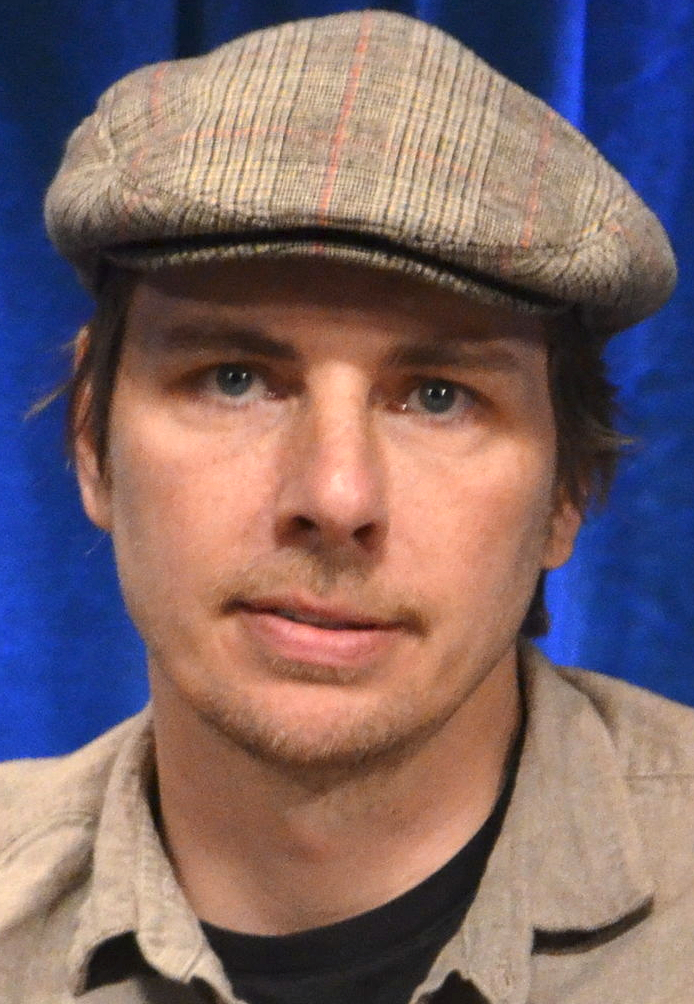
On this date in 1975, Dax Randall Shepard was born in suburban Detroit, the son of Laura LaBo, who worked at General Motors, and David Shepard, a car salesman. He was named Dax for Diogenes Alejandro Xenos, the wealthy playboy in Harold Robbins’ novel “The Adventurers.” His parents divorced when he was 3.
After high school graduation he enrolled in a school operated by the Groundlings, an improvisational and sketch comedy troupe based on Melrose Avenue in Los Angeles. He’d always known he could be funny but had stage fright about doing stand-up in Detroit so he moved to California, thinking “that commitment would force him to do it.” (2014 interview with Marc Maron) He attended Groundlings classes while enrolled at UCLA, where he graduated magna cum laude with a B.A. in anthropology in 2000.
In 2003 he joined the cast of “Punk’d,” a hidden camera, practical joke reality show created by Ashton Kutcher and Jason Goldberg that aired on MTV. In 2004 he starred in “Without a Paddle” with Seth Green and Matthew Lillard, followed by roles in “Employee of the Month” with Dane Cook and Jessica Simpson (2006), “Idiocracy” (2006), “Let’s Go to Prison” (2006) and “Baby Mama” (2008) with Tina Fey and Amy Poehler.
In 2010 he wrote, directed and starred in the low-budget mockumentary “Brother’s Justice” and had a supporting role in the rom-com “When in Rome, which starred his future wife Kristen Bell. From 2010-15 he played Crosby Braverman in the NBC drama “Parenthood.” His other movies since then as of this writing include “Hit and Run” with Bell and Bradley Cooper (2012), “The Judge” (2014), “CHiPs” and “El Camino Christmas” (2017).
His ad with Bell for the Samsung Galaxy Tab S tablet in 2014 garnered over 20 million YouTube views. In 2018 he launched the podcast “Armchair Expert” with co-host Monica Padman. It features the lives of celebrity guests and was the most popular new podcast on iTunes in 2018.
Shepard and Bell started dating in 2007 and got engaged in 2010 but refused to marry until California legalized same-sex unions, which happened in 2013. They have two daughters, Lincoln and Delta. He’s an atheist and Bell is also nonreligious. In 2013 she told Australian Women’s Health that they start their days with a 20-minute transcendental meditation session, sometimes holding hands. On his Twitter account, he describes himself as “Humanist. Comedic actor who is light on both comedy and acting. Alt Centrist.”
PHOTO: Shepard at PaleyFest 2013 in Los Angeles; photo by Genevieve under CC 2.0 Generic.
“I’m an atheist. Slow your roll :)”
— Shepard tweet replying to @JusPressPlay @PerezHilton (March 14, 2017)
Sebastian Junger
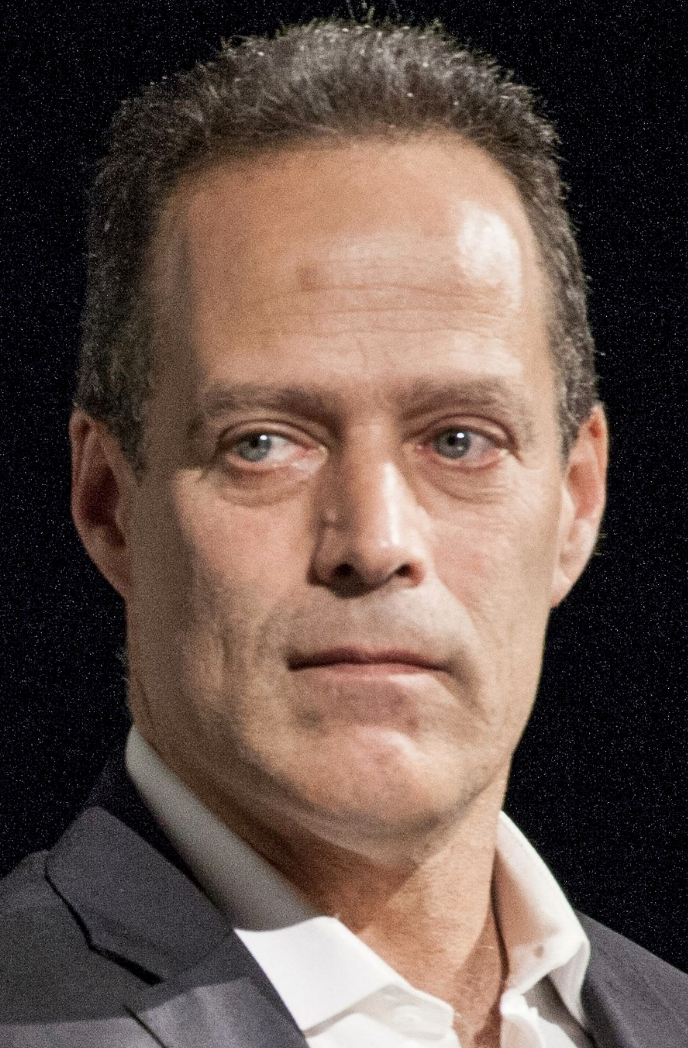
On this date in 1962, journalist and filmmaker Sebastian Junger was born in Belmont, Mass., to painter Ellen Sinclair and physicist Miguel Chapero Junger, who emigrated to the U.S. from Germany in 1941 because of his paternal Jewish ancestry. The younger Junger said he was raised in “a very rational household.” In a 2016 New York Times interview, he said, “I grew up with parents who were essentially antireligious, and so I never attended church. John Stuart Mill’s ‘Utilitarianism’ gave me the kind of ethical guidance that every person needs — religious or otherwise.” He studied cultural anthropology in Connecticut at Wesleyan University, which became independent of the Methodist Church in 1937, and graduated in 1984.
He started working as a freelance journalist while taking other jobs to support himself, later successfully selling pieces to publications like Harper’s, The New York Times Magazine, Vanity Fair, National Geographic Adventure, Outside and Men’s Journal. Researching hazardous jobs like commercial fishing led to his first book, The Perfect Storm: A True Story of Men Against the Sea (1997), which became a bestseller and a movie in 2000 starring George Clooney and Mark Wahlberg. Fire (2001) was a nonfiction collection about more dangerous pursuits — diamond mining, firefighting, peacekeeping in Kosovo and guerrilla warfare in Afghanistan. The previous year he had received a National Magazine Award for his Vanity Fair piece “The Forensics of War.” He received the 2007 Winship/PEN Award for A Death in Belmont, a book about the 1963 rape and murder of Bessie Goldberg.
He and British photographer Tim Hetherington teamed up on the award-winning “The Other War: Afghanistan,” shown on ABC’s “Nightline” in 2008. Junger’s book War (2010) revolved around a U.S. Army airborne platoon in Afghanistan. He and Hetherington co-directed a related documentary film, “Restrepo,” nominated for a 2009 Academy Award. Three documentaries about war and its aftermath followed: “Which Way Is The Front Line From Here?” (2013, about Hetherington’s 2011 death while covering the Libyan civil war), “Korengal” (2014) and “The Last Patrol” (also 2014). Another book was published in 2016, Tribe: On Homecoming and Belonging.
Hetherington’s death made Junger question his own willingness to put himself in harm’s way to get the story and helped him decide he’d had enough. “I suddenly was realizing the effect of Tim’s death on everyone he loved, including me, and I just didn’t want to risk doing that to everyone I love.” (Cultist, 2013.) During a 2014 ethics panel discussion hosted by the Carnegie Council for Ethics in International Affairs, he was asked if he was an atheist in a foxhole and answered, “As an atheist, I think about that phrase and I think, what is it really about an artillery bombardment that leads you to the conclusion that God is involved in this? I really see it the other way around: Clearly, God has nothing to do with what’s going on today.” Asked a similar question in a 2016 C-SPAN2 interview about there being no atheists in foxholes, he said, “I know empirically that’s not true.”
Junger married Daniela Petrova in 2002. They divorced in 2014. As of this writing, he lives in New York City and Cape Cod, Mass.
PHOTO: U.S. National Archives, public domain photo, 2013
“The reason I think I am an atheist is because I haven’t encountered a tangible reason to believe in God.”
— Sebastian Junger interview, C-SPAN2 "Book TV" (July 3, 2016)
James F. Crow
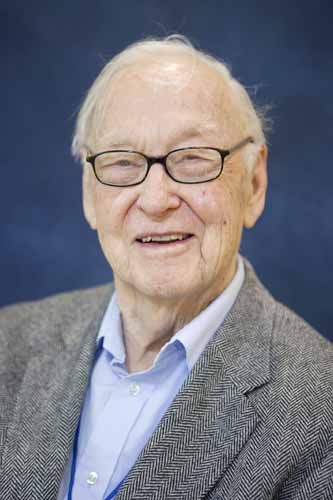
On this date in 1916, world-renowned evolutionary biologist and population geneticist James Franklin Crow was born in Phoenixville, Pa. Crow grew up in Wichita, Kansas. “The Quaker Church in Wichita was an interesting mixture. I grew up in it and was a regular attender. My father and mother both were very serious about their religion,” Crow stated in the Oral History of Human Genetics Project in 2005, adding, “My own views are atheistic, but I don’t go around preaching atheism. You don’t get very far trying to do this.”
He received his bachelor’s degree from Friends University. In 1941, Crow earned his Ph.D. in genetics from the University of Texas. Crow began his teaching career at Dartmouth University, where he taught until 1948. He then joined the faculty at the University of Wisconsin, where he remained until his retirement. Crow’s research primarily focused on the field of population genetics. He also loved teaching, and authored two undergraduate textbooks on evolution. Crow met his wife, Anne Crockett Crow, when both were members of the student orchestra at the University of Texas (he played the viola, she played the clarinet).
He was a Fellow of the Royal Society of London and the Japan Academy, a member of the American Philosophical Society, the World Academy of Art and Science, the American Academy of Arts and Sciences, the National Academy of Medicine and the National Academy of Sciences, where he has chaired several committees, including one to study forensic uses of DNA fingerprinting. That committee’s report helped legitimize use of DNA testing in court. In addition, he was a prolific researcher whose ideas strongly influenced biological science throughout his career.
The gentle Crow, beloved by his students, colleagues and his community, was a Lifetime FFRF Member. He spoke at age 94 at FFRF’s 2010 national convention in Madison, Wis., about evolution and religious belief. He played viola in the Madison Symphony Orchestra for many years, performing a concert to celebrate his 90th birthday. In 2009 the James F. Crow Institute for the Study of Evolution was established at the University of Wisconsin-Madison. (D. 2012)
“My main personal reason for nonbelief is: Why would an all-powerful and especially benevolent creator permit so much sin and suffering?”
— James F. Crow, remarks, 2010 FFRF national convention
Sherwin Wine
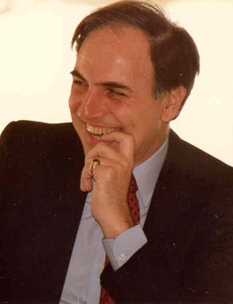
On this date in 1928, Sherwin T. Wine was born in Detroit, Mich. He received his bachelor’s degree in philosophy from the University of Michigan, and returned for his master’s degree in philosophy in 1951. Wine attended Hebrew Union College in Cincinnati and was ordained as a rabbi in 1956. He worked as a U.S. Army chaplain in Korea (1957–58) and an assistant rabbi at Temple Beth El in Detroit (1958–60). Wine wrote many books, including Judaism Beyond God (1985) and Staying Sane in a Crazy World (1995). He lived with his partner, Richard McCains, until Wine’s death in 2007 in Morocco from a car accident.
Born to Conservative Jewish parents, Wine began questioning the idea of a god at Hebrew Union College and gradually lost his faith. He told Time magazine in 1965: “I am an atheist,” adding, “I find no adequate reason to accept the existence of a supreme person.” (Quoted in The New York Times, July 25, 2007.) Wine’s lack of belief led him to consider the concept of Humanistic Judaism, which rejects belief in God while maintaining secular Jewish traditions, culture and ethics.
“Theological beliefs have nothing to do with Jewish identity. The Jewish people encompass theists and atheists,” Wine explained in his book Celebration (2003). He elaborated on the beliefs of Humanistic Judaism: “Humanists know that they have the right and the power to be the masters of their own lives, that they have the strength to confront the world as it is and not as fantasy makes it appear, and that they have the opportunity to serve the future and not the past.”
Wine established the Birmingham Temple in 1963 in Farmington Hills, a suburb of Detroit. At the temple, which he worked at until his retirement in 2003, Wine performed services with no mention of God, replacing prayers with poetry and Torah readings with speeches on history. Humanistic Judaism is now practiced worldwide. (D. 2007)
“If I were a CEO of a company and ran it like God runs the universe, I’d be fired.”
— Wine interview, The Guardian (Sept. 18, 2007)
Patton Oswalt
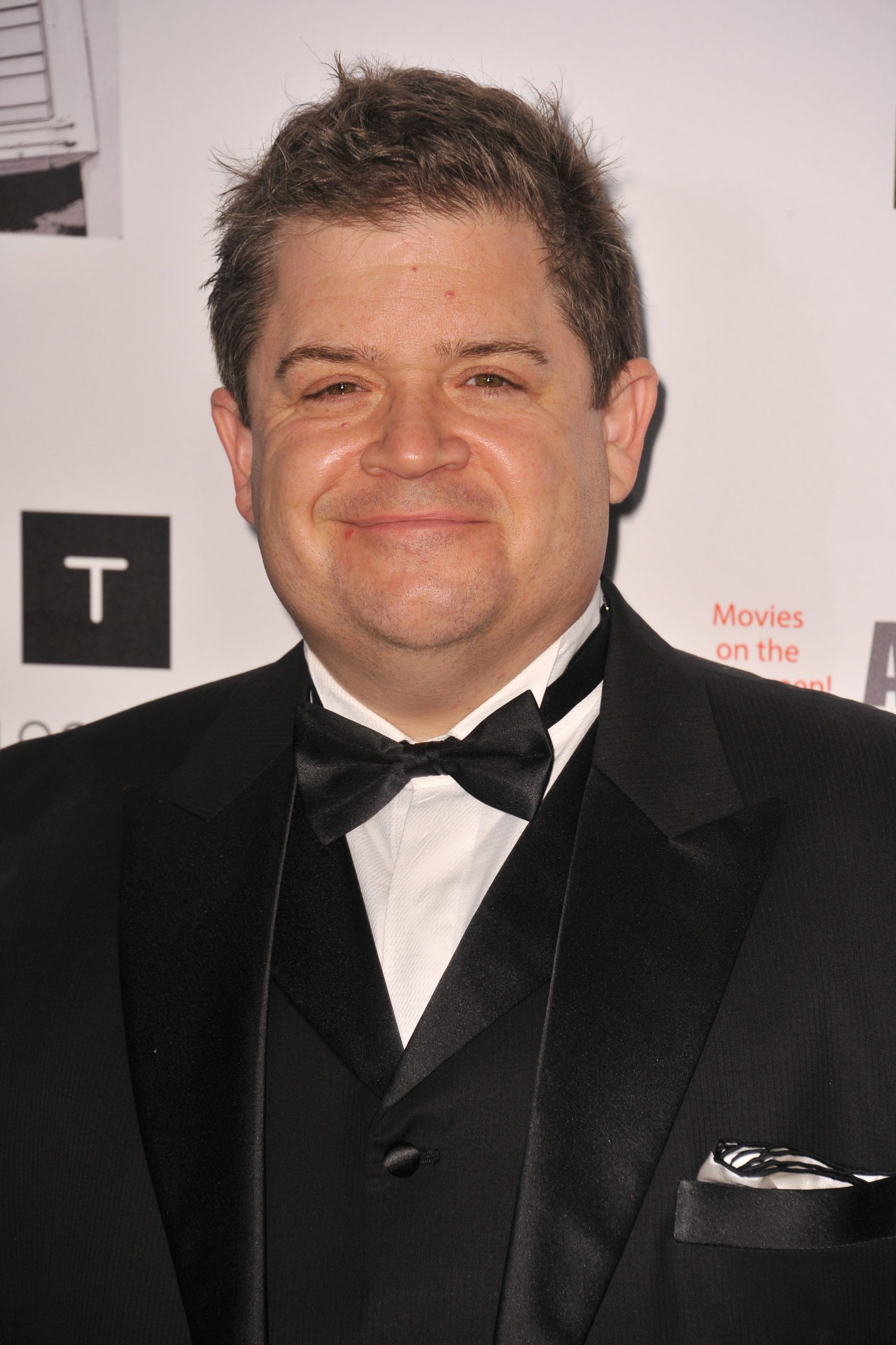
On this date in 1969, Patton Oswalt was born in Portsmouth, Va. His father was a Marine Corps officer who named him after Gen. George S. Patton. Oswalt began to perform stand-up comedy in the late 1980s, before graduating from the College of William and Mary in 1991. He became widely known after he starred in an HBO comedy special in 1996. He began to headline at comedy clubs nationwide and also started his career as an actor.
Much of his comedic material addresses popular culture and his daily life, but he has been known to mock religion and religious believers. For example, his “Sky Cake” routine characterizes religion as a trick played by smart weak guys on big dumb guys. He describes himself as an atheist.
From 1998 to 2007, Oswalt was a regular on the CBS show “The King of Queens,” playing the role of Spence. He has appeared in many small roles in movies, as a guest star on television shows including “Dollhouse” and “Nurse Jackie,” and done voice work for movies, television and video games. Notably, he voiced the main character, the rat Remy, in the 2007 Pixar film “Ratatouille.” He also starred in the 2009 live-action film “Big Fan.”
His supporting role in Jason Reitman’s black comedy “Young Adult” (2011) was nominated for several awards. Oswalt has also written for TV and film, as well as doing uncredited work on a variety of live-action comedy and animated film scripts.
In 2011 Oswalt released the book Zombie Spaceship Wasteland and appeared in “A Very Harold & Kumar 3D Christmas.” He originated the role of Billy Stanhope on “Two and a Half Men.” His memoir Silver Screen Fiend: Learning About Life from an Addiction to Film was published by Simon & Schuster in 2015, when it was announced he would appear in the reboot of “Mystery Science Theater 3000.” His comedy special “Talking for Clapping” was released on Netflix in 2016 and his special “Annihilation” followed in 2017 on Netflix.
Oswalt married true-crime writer Michelle McNamara in 2005 and they had a daughter, Alice, in 2009. McNamara had a very sad, untimely end at age 46 in 2016. He married actress Meredith Salenger the following year.
“My feelings on religion are starting to morph. I’m still very much an atheist, except that I don’t necessarily see religion as being a bad thing. … I’m almost saying certain people do better with religion, the way that certain rock stars do better if they’re shooting heroin.”
— Oswalt, The Onion A.V. Club (Aug. 31, 2011)
Edward Paul Abbey
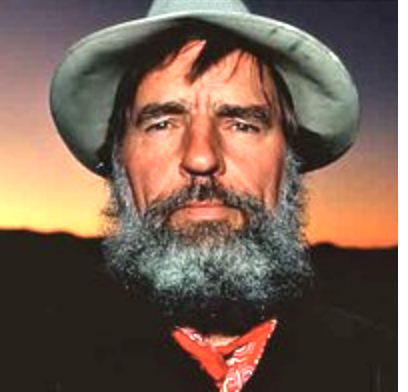
On this date in 1927, author Edward Paul Abbey was born in Indiana, Pa., to Mildred (Postlewait) and Paul Abbey, the eldest of five siblings. Both were hardworking, independent persons, and while Mildred was a lifelong liberal Presbyterian, Paul was more radical, declaring himself an atheist and a socialist as a young adult. Edward Abbey served in the U.S. Army as a military police officer in Italy and then enrolled at the University of New Mexico, where he earned a B.A. in philosophy and English in 1951 and a master’s in philosophy in 1956. He married Jean Schmechal, the first of his five wives (with whom he had five children), as an undergrad. He was removed as editor of the student newspaper for putting Diderot’s famous quote, “Man will never be free until the last king is strangled with the entrails of the last priest,” on the cover of one issue.
He worked as a welfare caseworker, teacher, bus driver and technical writer before starting a career as a ranger and fire lookout at several national parks or monuments. His two seasons at Arches National Monument (later a national park) near Moab, Utah, in 1956-57 provided the grist for the book that brought him acclaim, Desert Solitaire: A Season in the Wilderness (in 1968), a nonfiction work that was preceded by three novels. His 1975 comic novel The Monkey Wrench Gang, about a group of ecological saboteurs is perhaps his best-known work. While he wrote primarily about environmental issues and land-use policies, Abbey was basically a political anarchist, and according to Wilderness.net, “he wasn’t comfortable with environmental activists or activism as a whole.”
His best friend Jack Loeffler recorded Abbey’s thoughts on religion after their 1983 camping trip in the Superstition Mountains of Arizona, included in his 1989 book Headed Upstream: Conversations with Iconoclasts, in which Abbey said, “I regard the invention of monotheism and the otherworldly God as a great setback for human life.” Abbey himself roundly condemned religion in his own works, particularly in A Voice Crying in the Wilderness, published in 1989, the year he died of esophageal hemorrhaging after surgery for a congenital circulatory disorder. “What is the difference between the Lone Ranger and God?” Abbey asked, before answering, “There really is a Lone Ranger.”
“Whatever we cannot easily understand we call God; this saves much wear and tear on the brain tissues.”
— "A Voice Crying in the Wilderness: Notes from a Secret Journal" (1989)
Barry Duke
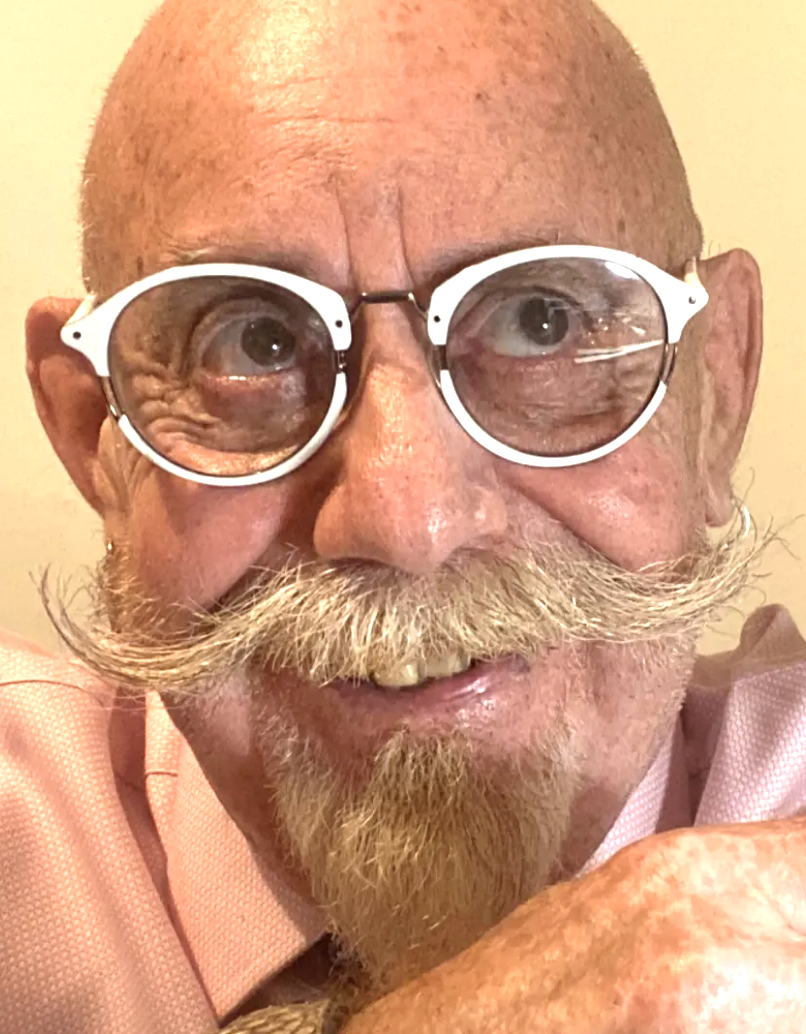
On this date in 1947, journalist/editor and gay rights activist Barry Duke was born in Johannesburg, South Africa, the eldest child of middle-class parents Sybil and Abe Duke. He grew up in two small towns, and from an early age showed “a strong antipathy toward religion, especially the Calvinist form of Christianity that was used to justify the country’s horrific persecution of people of color during the Apartheid era,” Duke commented in 2022.
He was expelled from the first high school he attended for condemning racial injustices, refusing to sing the national anthem and for sharing anti-religious publications with classmates. He started working as a newspaper journalist in his late teens and several years later landed a job with The Star, a leading daily.
Duke’s left-leaning, anti-Apartheid activism, coupled with censorship battles, led to him being declared a “dangerous undesirable.” Alerted that an arrest warrant was being issued, he left South Africa in 1973 for the UK, where he was granted asylum. A militant atheist, he joined the National Secular Society and was a co-founder in 1979 of the Gay Humanist Group, which changed its name to the Gay and Lesbian Humanist Association in 1987.
He started writing in 1974 for The Freethinker, the venerable publication founded by G.W. Foote in 1881, and rose to editor in 1997. He held the position until January 2022, when differences with the editorial board led to his departure. He continued his decade-long writing and editing association with the Pink Humanist and started writing on OnlySky, a secular platform that launched in 2020.
In 2017 Duke was the recipient of a Lifetime Achievement Award from the National Secular Society for his “spirited opposition to religious intolerance and irrationality.” He married Marcus Robinson, his longtime partner, in 2017 in Gibraltar and they live in Benidorm, a town along Spain’s seaside Costa Blanca.
“Since [1950s John Birch Society claims], War on Christmas reports have simply become a silly festive season tradition, generating more mirth than fury. All are intended to reinforce the belief of Christian fundamentalists that they really are being persecuted by a coalition of atheists, secularists, freethinkers, abortionists – and those who identify as LGBTQ. Seriously!”
— "And so it begins … the ‘war’ on Christmas 2021" (The Freethinker, Nov. 25, 2021)
Michael Martin
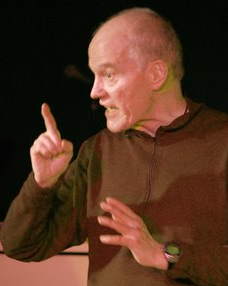
On this date in 1932, renowned American philosopher and teacher Michael Martin was born in Cincinnati, Ohio. Martin was a respected academic promoter of atheism, penning several books examining the case against the existence of God.
Martin served with the U.S. Marine Corps in the Korean War before graduating from Arizona State University in 1956 with a degree in business administration. He earned a master’s degree in philosophy in 1958 from the University of Arizona and a Ph.D. in philosophy from Harvard University in 1962. That year, Martin began his teaching career at the University of Colorado as an assistant professor, joining the staff at Boston University in 1965, where he was a professor of philosophy until retiring.
The focal point of Martin’s research and writing was always the philosophy of religion and the defense of atheism. His best-known book was Atheism: A Philosophical Justification (1989), considered by some as one of the most analytical arguments against God’s existence. In its introduction he writes, “The aim of this book is not to make atheism a popular belief or even to overcome its invisibility. My object is not utopian. It is merely to provide good reasons for being an atheist. … My object is to show that atheism is a rational position and that belief in God is not. I am quite aware that atheistic beliefs are not always based on reason. My claim is that they should be.”
Martin wrote and edited several other books, including The Case Against Christianity (1991), Atheism, Morality, and Meaning (2002), The Impossibility of God (2003), The Improbability of God (2006) and The Cambridge Companion to Atheism (2006), along with numerous articles on atheism. He also engaged in a number of debates with Christian apologists. His philosophical interests extended to social science and law.
Martin was married to Jane Roland Martin, who spent much of her career as a philosophy professor at the University of Massachusetts-Boston focusing on education, gender and feminism. They married in 1962 and had two sons, Timothy and Thomas, and five grandchildren. (D. 2015)
“Since experiences of God are good grounds for the existence of God, are not experiences of the absence of God good grounds for the nonexistence of God?”
— Michael Martin, "Atheism: A Philosophical Justification" (1989)
Sikivu Hutchinson
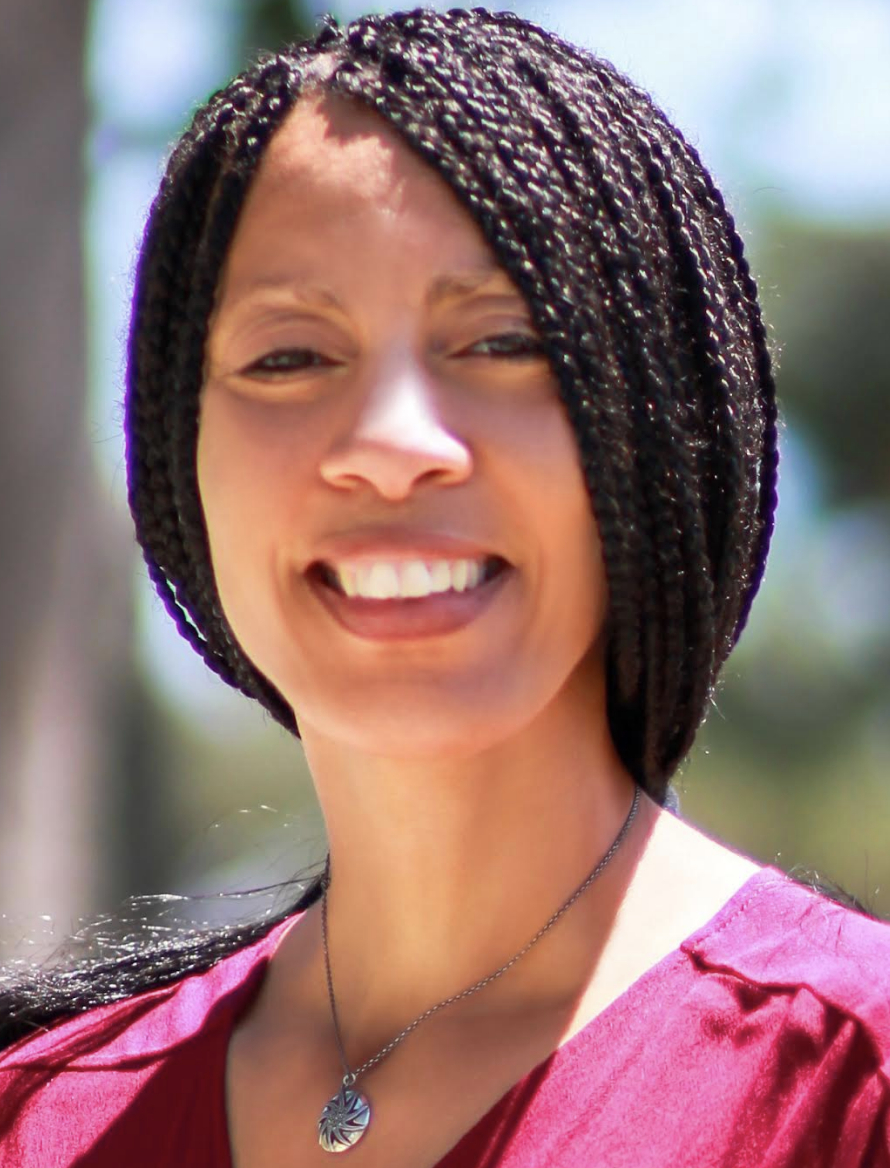
On this date in 1969, Black activist, author and feminist Sikivu Hutchinson was born in Los Angeles to Yvonne (Divans) and Earl Ofari Hutchinson Jr., respectively a retired English teacher and a noted analyst and commentator on race, politics and civil rights. Her grandfather, Earl Hutchinson Sr., published his autobiography A Colored Man’s Journey Through 20th Century Segregated America when he was 96.
Hutchinson earned a B.A. in anthropology from UCLA and a Ph.D. in performance studies from New York University in 1999. She taught women’s studies, cultural studies, urban studies and education at UCLA, the California Institute of the Arts and Western Washington University.
Her first book was Imagining Transit: Race, Gender, and Transportation Politics in Los Angeles (2003) and was followed by Moral Combat: Black Atheists, Gender Politics, and the Values Wars (2011), Godless Americana: Race and Religious Rebels (2013) and Humanists in the Hood: Unapologetically Black, Feminist, and Heretical (2020).
Her novel White Nights, Black Paradise (2015), with a focus on Black women, the Peoples Temple and the Jonestown massacre, was later adapted for the stage. Her novel Rock ’n’ Roll Heretic: The Life and Times of Rory Tharpe (2021) detailed the life of an ex-Pentecostal Black female electric guitarist who at one point says, “Those white boys on the major labels would never give an inch to a Negro woman playing race music.”
Hutchinson founded Black Skeptics Los Angeles (BSLA) in 2010 and is the founder of the Women’s Leadership Project, a high school feminists of color mentoring program in South Los Angeles. She received the Foundation Beyond Belief’s 2015 Humanist Innovator award and the Secular Student Alliance’s 2016 Backbone award. In 2020, the Humanist Chaplaincy at Harvard, a chapter of the American Humanist Association, named her one of its three Humanists of the Year.
BSLA has twice partnered with the Freedom From Religion Foundation by selecting recipients for FFRF’s Forward Freethought Tuition Relief Scholarships. In 2020, four secular students of color each received $5,000 stipends, double the amount of the inaugural awards.
Hutchinson has written and spoken extensively on the particular challenges of “coming out” as an atheist female of color. “[P]atriarchy entitles men to reject organized religion with few implications for their gender-defined roles as family breadwinners or purveyors of cultural values to children. Men simply have greater cultural license to come out as atheists or agnostics.” (Feminism: Opposing Viewpoints, April 1, 2012)
She has been married to Stephen Kelley as of this writing in 2023 for 17 years and has a nonbinary daughter, Jasmine Hutchinson Kelley. She’s a distance runner, acoustic guitarist and rock music enthusiast whose favorites include the Beatles, Neil Young, Sonic Youth, Parliament/Funkadelic, Hendrix/Band of Gypsys, Malina Moye, Brittany Howard, David Bowie and Bob Dylan.
“The white fundamentalist Christian stranglehold on Southern and Midwestern legislatures has proven to be a national cancer that further exposes the dangerous lie of a God-based, biblical morality.”
— Hutchinson, commenting on restrictive abortion bills, The Humanist magazine (July/August 2019)
Pamela Paul
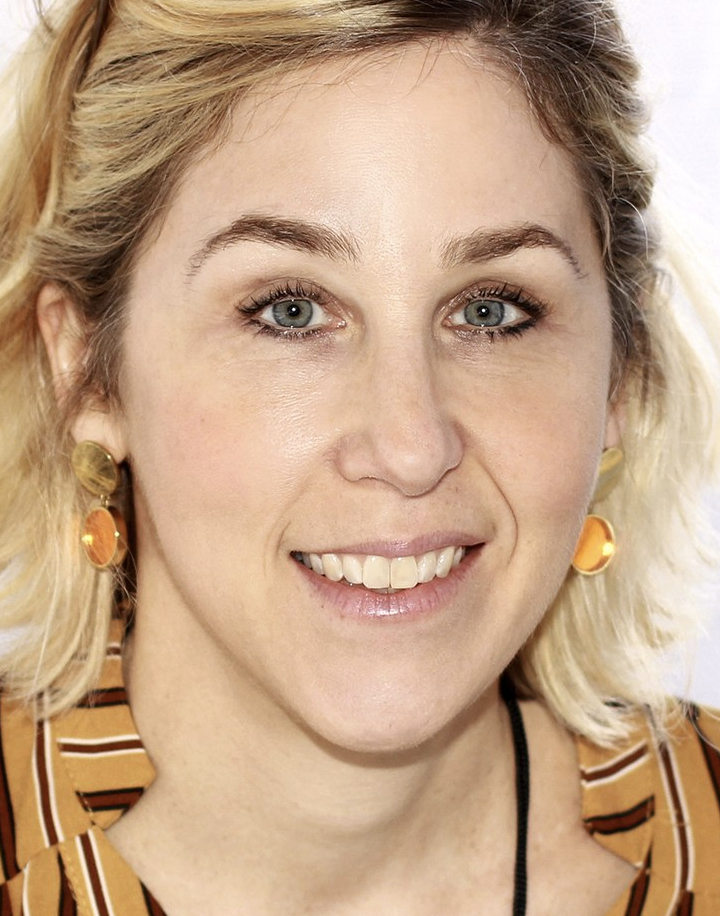
On this date in 1971, journalist and author Pamela Lindsey Paul was born in New York to Carole and Jerome Paul. Her father was a construction contractor and her mother was an advertising copywriter and, later, editor of Retail Ad World. She has 7 brothers. Her parents divorced when she was 3 or 4.
“Like many other morbid kids with Jewish ancestry, I was drawn to Holocaust reading from the moment I entered adolescence, seeking out the death and torture and deprivation and evil,” Paul said in her 2017 memoir “My Life With Bob.” Bob (short for Book of Books) was her journal detailing all the books she had read since high school and her intense relationship with reading. She lived with her mother on Long Island except for weekends with her father on New York’s Upper West Side.
She enrolled at Brown University in Providence, R.I. As a challenge to herself, she joined the rugby team. “And I joined a gospel choir even though I’m an atheist and I can’t sing. I guess I do have a streak of wanting to put myself in situations that are uncomfortable and challenging and like, can you take it?” (Women’s Wear Daily, April 20, 2021)
After graduation, Paul taught American history at a startup international school in Thailand before taking marketing jobs at Scholastic Inc. and Time Inc. in New York. She then joined fiancé Bret Stephens in London, where she first wrote professionally with a monthly column on global arts in The Economist.
Her reporting and columns have appeared in numerous notable publications. Her first book, “The Starter Marriage and the Future of Matrimony” (2002), came in the wake of her divorce from conservative journalist Bret Stephens, whom she wed in 1998. A starter marriage was defined as starting before age 30, being childless and ending within five years.
She joined The New York Times in 2011 as a columnist, children’s books editor and features editor. She edited the paper’s Book Review for nine years before becoming an opinion columnist, a position she maintained until leaving the paper in April 2025. She has written eight books, the most recent being “Rectangle Time” and “100 Things We’ve Lost to the Internet,” both published in 2021.
Paul came under fire in 2023 for defending author J.K. Rowling from allegations of transphobia, “because she has asserted the right to spaces for biological women only, such as domestic abuse shelters and sex-segregated prisons” and for insisting “that when it comes to determining a person’s legal gender status, self-declared gender identity is insufficient.” (The Advocate, Feb. 16, 2023) Rowling also received substantial support from groups traditionally seen as backing women’s and LGBTQ+ rights.
Amy Schneider, the first trans contestant on “Jeopardy!” and the highest-winning woman in the show’s history, was a critic: “If certain famous billionaire authors were to advocate for ‘Whites only’ spaces, we’d all see it as the hate speech that it is. But when they advocate for ‘cis only’ spaces, the most powerful newspaper in the country rushes to their defense.” (Schneider tweet, Feb. 16, 2023)
In a column headlined “I Pledge Allegiance to … My Conscience” (March 16, 2023), Paul praised Marissa Barnwell, 15, a Black honor student grabbed by a South Carolina teacher and shoved against a hall wall for not acknowledging that the Pledge of Allegiance was being recited over a loudspeaker. She’d stopped saying the pledge in third grade. “Don’t you love this country?” the teacher asked.
Something similar happened to Paul in the second grade when she opted out of the pledge, despite being “painfully shy,” and was sent to the principal’s office. “I remember my mother being called and that whatever she said must have appeased them.” The Barnwells are suing the school district for violating the First and Fourteenth amendments.
PHOTO: Paul at the 2019 Texas Book Festival in Austin; photo by Larry D. Moore, CC BY-SA 4.0.
“Unhappy with what much of the country believes, the court’s right wing chooses to believe what it would like and foists the results on the rest of us. Just like Coach Kennedy, they’re out to proselytize.”
— Paul slamming the SCOTUS 6-3 decision in Kennedy v. Bremerton School District that held a public high school football coach's onfield prayer was constitutional. (New York Times, July 17, 2022)
Matt Taibbi
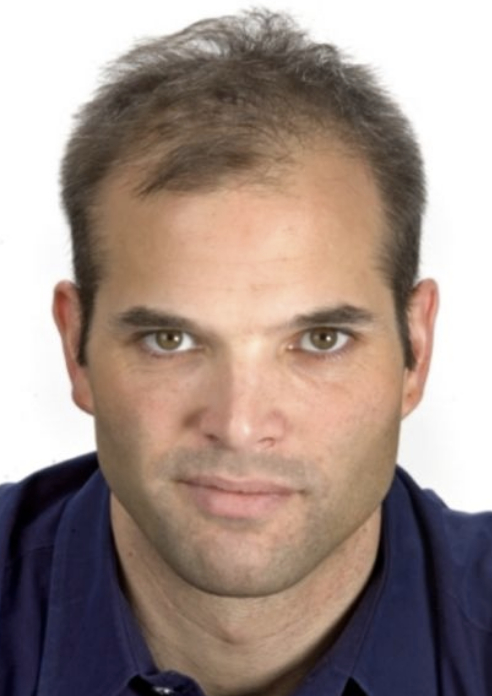
On this date in 1970, muckracking atheist journalist Matthew C. “Matt” Taibbi was born in New Brunswick, N.J. The son of an NBC reporter, he grew up in Boston and graduated from Bard College in Annandale-on-Hudson, N.Y. He moved to Russia in 1992 and studied and worked there and in Uzbekistan and Mongolia for over six years. In 1997 he co-edited with Mark Ames an English language newspaper called the eXile, geared to expatriates in Moscow. It provided background for his first book, with Ames and Edward Limonov, The Exile: Sex, Drugs, and Libel in the New Russia (2000).
He then started The Beast, a satirical biweekly in Buffalo, N.Y., but left to concentrate on freelancing for The Nation, Playboy, Rolling Stone and New York Press (which he left in 2005 after his editor Jeff Koyen was fired over issues raised by Taibbi’s column “The 52 Funniest Things About the Upcoming Death of the Pope”). Taibbi defended the piece as “off-the-cuff burlesque of truly tasteless jokes” to relieve readers of his “fulminating political essays.” He covered the 2008 presidential campaign for “Real Time with Bill Maher.”
He received a 2008 National Magazine Award in the category “Columns and Commentary” for his Rolling Stone columns. His article “The Great American Bubble Machine,” which detailed Goldman Sachs’ involvement in the financial meltdown, received a 2009 Sidney Award from the Sidney Hillman Foundation. His 2008 book The Great Derangement: A Terrifying True Story of War, Politics, and Religion told the story of how he infiltrated Texas evangelical pastor John Hagee’s Cornerstone megachurch and school and Hagee’s “near-absolute conquest of a very trendy niche in the market: Christian Zionism.”
He has also written Griftopia: Bubble Machines, Vampire Squids, and the Long Con That Is Breaking America (2010), The Divide: American Injustice in the Age of the Wealth Gap (2014), Insane Clown President: Dispatches from the 2016 Circus (2017) and Hate Inc.: Why Today’s Media Makes Us Despise One Another (2019). He and his wife Jeanne, a family physician, were married in 2010 and live in New Jersey with their son.
MEHTA: What role should religion play in the political arena?
TAIBBI: Well, I’m an atheist/agnostic, so I would say none. People should stick to solving the problems they have the tools to solve. If you have a budget crisis, well, human beings can do the math, work out a new tax/spending strategy, and fix that. But we don’t have any tools for [divining] the will of God as it relates to, say, a new problem like high school shootings, the Iraq war, or the AIDS virus. All we have are the opinions of religious leaders whose motives may or may not be pure, and whose grasp of logic may or may not be of the highest quality. If you inject religion into the equation, the debate is necessarily going to be subjective, emotional, and inconclusive. It’s also very easy for unscrupulous people to use religion to further various ends for other reasons. Hagee’s humping of Israel is a great example. How do you get fundamentalist Christians to support the financial subsidy of military aid to a Jewish state? Easy; you convince them the world is going to end soon, and that we’re going to be on the wrong side of Armageddon unless we support Israel.”— Interview with "Friendly Atheist" Hemant Mehta (April 29, 2008)
Daniel Craig
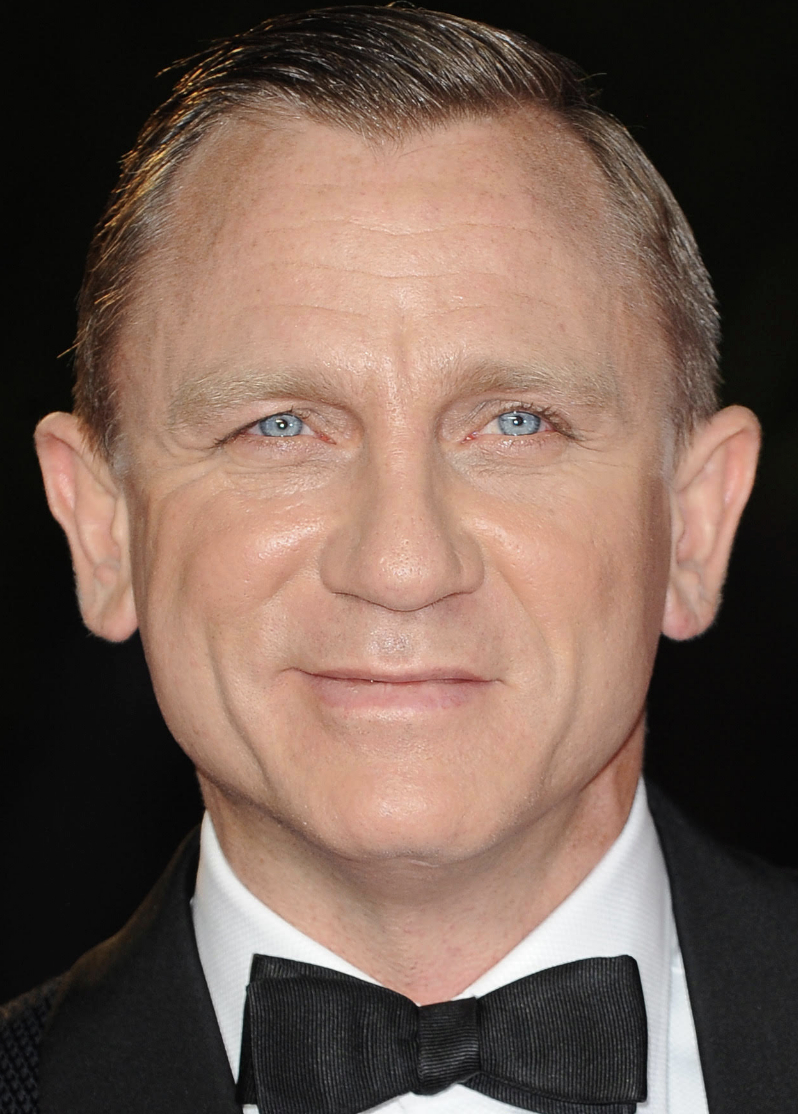
On this date in 1968, actor Daniel Wroughton Craig was born in Chester, England to Carol (née Williams) and Timothy Craig, respectively an art teacher and midshipman in the merchant marine. He began acting in school plays at age 6. At 16 he was accepted into the National Youth Theatre and then by the Guildhall School of Music and Drama, graduating in 1991.
Craig made his film debut in the drama “The Power of One” (1992) and appeared the next year in the Royal National Theatre’s production of “Angels in America” by playwright Tony Kushner. Throughout the 1990s, he played a variety of roles in screen and television productions. He co-starred with Angelina Jolie in the 2001 action film “Lara Croft: Tomb Raider” and achieved international fame in 2006 when he played James Bond, taking over from Pierce Brosnan, in “Casino Royale.”
It earned him a nomination for the BAFTA Award for Best Actor in a Leading Role. He followed with the sequels “Quantum of Solace” (2008), “Skyfall” (2012), “Spectre” (2015) and “No Time to Die,” which was scheduled for release in April 2020 but was postponed due to the COVID-19 pandemic. It was released in 2021. Craig’s role in the 2019 mystery film “Knives Out” earned him a Golden Globe nomination for Best Actor.
He married actress Fiona Loudon in 1992. They had a daughter, Ella, before divorcing in 1994. After long-term relationships with actress Heike Makatsch and film producer Satsuki Mitchell, he married actress Rachel Weisz in 2011. They announced the birth of a daughter in 2018.
Craig is notoriously private about his personal life and beliefs, although he has said he’s an atheist (see quote below). In 2019 in a Kaufmann Store interview, he said, “I don’t go to church. I’m not religious. But I think religion is fascinating because it affects our lives massively.”
When he hosted “SNL” on March 7, 2020, a sketch he appeared in with Kate McKinnon and Cecily Strong brought laughs from the audience. McKinnon: “Blace, I thought you left to become a priest.” Craig answered: “Yes, but I couldn’t do it — the no-sex part. Also, have you read the bible? It’s weird.”
PHOTO: Craig at the 2012 premiere of “Skyfall” at the Royal Albert Hall, Kensington, UK; photo via Shutterstock by Landmarkmedia.
DIE ZEIT: Are you a believer?
CRAIG: I’m an atheist.— Craig, quoted in the German weekly Die Zeit, "Real Heroes Are Shy" (Jan. 12, 2012)
Maurice Ravel
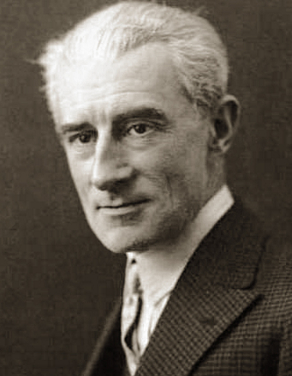
On this date in 1875, Joseph Maurice Ravel, composer, pianist and conductor, was born in the Basque town of Ciboure, France. His father, Pierre-Joseph Ravel, was an educated engineer, inventor and manufacturer. His mother, Marie (née Delouart) Ravel, was born to an unwed mother and was barely literate. She was also a freethinker, a trait inherited by Maurice, who was always politically and socially progressive as an adult, according to musicologist and Ravel scholar Arbie Orenstein.
He was admitted to France’s premier music academy, the Conservatoire de Paris, winning first prize in the school’s piano competition in 1891. He was expelled in 1895 due to differences with faculty conservatives but was readmitted two years later and studied composition with Gabriel Fauré. He was later forced out again after clashing with Conservatoire Director Théodore Dubois, who deplored Ravel’s musical and political progressivism.
Making his way as an orchestral arranger and composer, he was often associated with his contemporary Claude Debussy as an impressionist, though neither liked the term. He liked to experiment with musical form, as is evident in “Boléro” (1928), his best-known work. “Boléro” is a one-movement orchestral piece originally composed as a ballet that repeats its main melody 18 times by solo or combinations of instruments. The duration varies depending on the tempo but typically is about 16 minutes. When Toscanini conducted it faster, Ravel objected, resulting in hard feelings. “When I play it at your tempo, it is not effective,” Toscanini said. To which Ravel supposedly replied, “Then do not play it.”
Ravel, a master of orchestration, worked at a slower pace than many of his contemporaries. Among his 85 works, many incomplete, are pieces for piano, chamber music, two piano concertos, ballet music, two operas and eight song cycles. He wrote no symphonies or church music. He was among the first to realize the potential of recording music. According to a 1914 article in the French magazine Comoedia illustré, there’s “a notable absence of religious forms or references” in his works. “His habitual inspiration came from nature, from fairy tales and folk songs, and from classical and Oriental legends. Nor was he always sympathetic to the religious works of other composers.”
Although he never married and was childless, Ravel liked children and wrote piano music they could play and reflected their world. He wrote “Ma Mère l’Oye” (Mother Goose), subtitled “cinq pièces enfantines” in 1910 as a duet and dedicated it to his students, Mimie Godebska and her brother Jean. “It was he who made me read the Fioretti (Little Flowers) of St. Francis of Assisi. Although he was a confirmed atheist, he adored this book, and I was so amazed by it that I used to imagine it being set to music — by Ravel,” wrote Mimie Godebska Blacque-Belair in 1938.
Ravel started to suffer from neurological impairment in the early 1930s, which affected his piano playing, touring and conducting. The cause was never determined but may have been dementia, Alzheimer’s or Creutzfeldt–Jakob disease. He died at age 62 and was buried next to his parents with no religious ceremony. (D. 1937)
PHOTO: Ravel at age 50.
“What you write to me about the benefits of religion, we have spoken of it with Pierrette Haour, an atheist like me.”
— Ravel letter in 1920 to Ida Godebska, cited in "Maurice Ravel: lettres, écrits, entretiens" (letters, writings, interviews), Arbie Orenstein, ed., (1989)
Ed Buckner
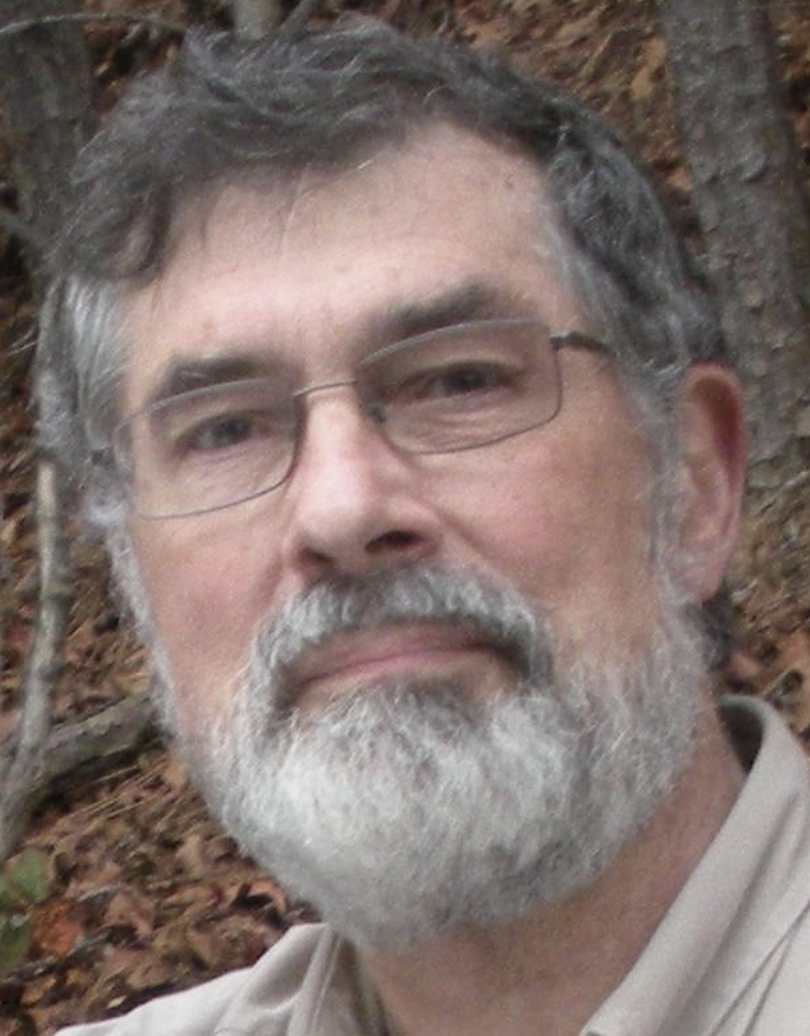
On this date in 1946, educational researcher, author and religious skeptic Edward Milton Buckner was born in Fitzgerald, Ga. His father was an Episcopal clergyman. (One of his congregants when the family lived in Texas was astronaut Frank Borman.) Buckner, who said he started “gradually coming to my senses as an atheist” in the 1960s, received a B.A. from Rice University in Houston in 1967 and an M. Ed. and Ph.D. from Georgia State University. He married Diane Bright in 1968 and their son Michael was born in 1970. They are Life Members of the Freedom From Religion Foundation.
Buckner was an assistant professor of urban studies at Georgia State University from 1980 to 1986. He taught research methods, statistics and computer use and was responsible for managing and conducting data analysis from research projects. He then worked as a researcher for a public school system and later served as executive director of the Council for Secular Humanism (2001-03), as president of American Atheists (2008-10) and as American Atheists interim executive director for several months in 2018.
An example of Buckner’s ability to be a burr under the saddle of government favoritism to religion was noted in November 2007 by USA Today. He and about 20 others protested “a revival-style vigil” outside the state Capitol, where Gov. Sonny Perdue prayed with hundreds of Georgians for rain to ease a severe drought as “Amazing Grace” played: “We ask God to shower our state, our region, our nation with the blessings of water.” Buckner told the newspaper: “I am embarrassed that my governor thinks ordinary Georgians praying is not enough, that we need to have a mixing of church and state to get the attention of the Almighty.”
Two years later, he addressed the Cobb County Commission with a “prayer” of his own: “[T]hese invocations are a violation of the letter and intent of the Constitution of the state of Georgia, of the 1st Amendment to the Constitution of the United States, and of the 14th Amendment, ratified exactly 141 years ago today. Go and sin no more. Thank you.”
Buckner has edited Freethought Press books and with Michael co-edited Quotations That Support the Separation of Church and State (1995). Father and son co-wrote In Freedom We Trust: An Atheist Guide to Religious Liberty, published by Prometheus Books in 2012. Along with writing and editing, Buckner has debated and spoken in the U.S. and U.K. about freethought and secular humanism. What does he think about the Bible? “A dangerous set of books, full of beauty, moral wisdom and history, but mixed with viciousness, cruelty, myth and immorality.” (2010 interview with tabee3i, an online home for Metaphysical Naturalists “rejecting the existence of the supernatural”)
PHOTO: By Diane Buckner
“The stigma attached to being an atheist based on atheists being hopelessly immoral, outrageously in rebellion against a loving God, and in league with Satan (possibly as foolish dupes rather than his evil minions) was pervasive. The stigma has not ended, the fear of and hatred of us has not abated, the ignorance and misunderstanding is still widespread.”
— Ed Buckner, "A Look Back From an Old Guy Not in the Old Guard" (American Atheist magazine, Second Quarter 2013)
Philip Roth
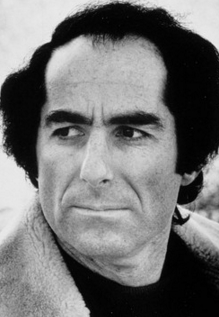
On this date in 1933, author Philip Milton Roth was born to Herman Roth and Bess (Finkel) Roth in Newark, N.J., where he grew up with an older brother. He encountered anti-Semitism at an early age and later wrote that his childhood love of baseball offered him “membership in a great secular nationalistic church from which nobody had ever seemed to suggest that Jews should be excluded.” At Bucknell University he decided the school’s “respectable Christian atmosphere [was] hardly less constraining than [his] own particular Jewish upbringing.”
After earning a master’s in English in 1955 from the University of Chicago, he taught there for two years and started writing short fiction. Roth published Goodbye, Columbus, a collection of short stories and the title novella, to critical acclaim in 1959. He then worked as a visiting lecturer at the University of Iowa Writers’ Workshop, followed by two years as a writer-in-residence at Princeton University. Letting Go (1962) was his first full-length novel. When She Was Good (1967), which Roth once called a “book with no Jews,” is also his only novel to feature a female protagonist.
He had married Margaret Martinson in 1956. They separated in 1963 and she died in a car accident in 1968. Martinson was the inspiration for female characters in several of his novels, including Lucy Nelson in When She Was Good. He didn’t marry again until 1990, when he wed English actress Claire Bloom. They divorced in 1995, after which she published a memoir that described their marriage in detail unflattering to Roth. Both marriages were childless.
Roth started teaching literature in the late 1960s at the University of Pennsylvania. The 1969 feature film adaptation of Goodbye, Columbus coincided with the publication of Portnoy’s Complaint, which soon became a best-seller amid controversy for its prurient content. (Those who’ve read it will likely not forget Portnoy’s “affair” with a slab of liver.) Roth’s works in the 1970s included a Richard Nixon parody titled Our Gang, The Breast, The Great American Novel and, what some consider his best novel, My Life as a Man. Three novels (The Ghost Writer, Zuckerman Unbound and The Anatomy Lesson) were published in one volume in 1985.
The 1990s saw publication of Deception, Patrimony: A True Story, Operation Shylock, Sabbath’s Theater and a trilogy consisting of American Pastoral (which won a Pulitzer), I Married a Communist and The Human Stain. He remained prolific after the turn of the century with The Dying Animal, The Plot Against America, Everyman, Indignation, The Humbling, Nemesis and Exit Ghost, the ninth book narrated by Zuckerman, Roth’s fictional alter ego.
Roth won a slew of writing awards besides the Pulitzer and eight of his novels were adapted for movies. He was awarded the 2010 National Humanities Medal by President Barack Obama at the White House in 2011. He died of congestive heart failure at age 85. (D. 2018)
PHOTO: Roth in 1973.
“I’m exactly the opposite of religious, I’m anti-religious. I find religious people hideous. I hate the religious lies. It’s all a big lie. … I have such a huge dislike. It’s not a neurotic thing, but the miserable record of religion. I don’t even want to talk about it, it’s not interesting to talk about the sheep referred to as believers.”
“Do you consider yourself a religious person?”
“No, I don’t have a religious bone in my body,” Roth said.
“So, do you feel like there’s a God out there?” Braver asked.
“I’m afraid there isn’t, no,” Roth said.
“You know that telling the whole world that you don’t believe in God is going to, you know, have people say, ‘Oh my goodness, you know, that’s a terrible thing for him to say,” Braver said.
Roth replied, “When the whole world doesn’t believe in God, it’ll be a great place.”— Interview with Martin Krasnik of The Guardian (Dec. 14, 2005); interview with CBS News correspondent Rita Braver (Oct. 3, 2010)
Béla Bartók
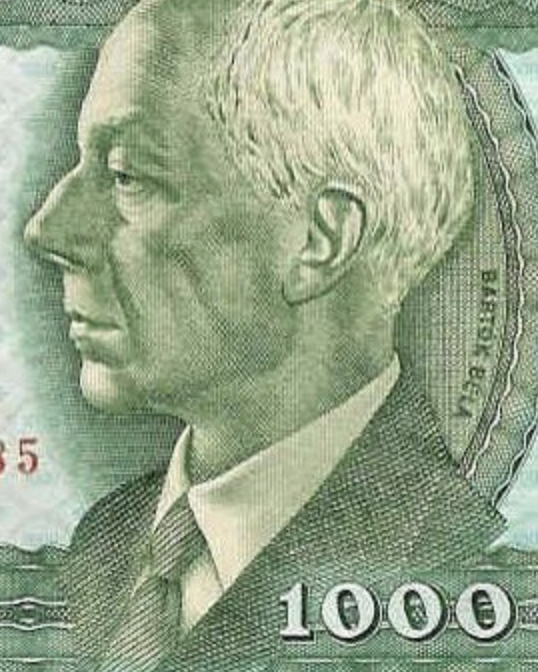
On this date in 1881, composer, pianist and ethnomusicologist Béla Bartók was born in Nagyszentmiklós, Hungary. He and Franz Liszt are regarded by many as the greatest Hungarian composers. Trained in piano and composition at the Budapest Academy of Music, Bartók began his career as a touring pianist in 1903. His talents as a composer soon became apparent, and Bartók assumed a professorship at the academy in 1908.
He drew inspiration from the folk music of the Balkans and other regions while engaging in intense studies of harmonic practices, including those of contemporary French composers. While not an expert in stringed instruments, Bartók’s compositions displayed a preternatural understanding of the violin: “He enriched [the violin’s] repertoire with such essential works as his two Sonatas for Violin and Piano (of 1921 and 1922, respectively), two Rhapsodies for Violin and Orchestra (1928-29), 44 Duos for Two Violins (1931), and the Sonata for Solo Violin (1944).” (New York Philharmonic)
His childhood Catholicism was gone by early adulthood. “By the time I had completed my 22nd year, I was a new man — an atheist.” (Béla Bartók: Life and Work by Benjamin Suchoff, 2001) He later became attracted to Unitarianism and publicly converted in 1916. A committed anti-fascist, Bartók opposed Hungary’s alliance with Germany in World War II and refused to perform in Germany during Nazi rule.
He married Márta Ziegler in 1909 when he was 28 and she was 16. They divorced in 1923 and he married Ditta Pásztory, a piano student, two months later when she was 19 and he was 42. He had two sons, Béla Bartók III and Péter. Bartók and Ditta emigrated to the U.S. in 1940 and he accepted a research fellowship at Columbia University, where they compiled a large collection of Serbian and Croatian folk songs for Columbia’s libraries. He died at age 64 in New York from complications of leukemia. (D. 1945)
PHOTO: Bartók’s portrait on a 1,000-forint banknote. Hungarian National Bank photo. GNU Free Documentation License
“To violinist Stefi Geyer, he once wrote about his religious belief, calling the trinity a ‘clumsy fable’ that ‘enslaves thought.’ … The existence of the universe did not require the hypothesis of a creator. ‘Why don’t we simply say: I can’t explain the origin of its existence and leave it at that?’ “
— "Béla Bartók" by David Cooper (2015)
Matt Dillahunty
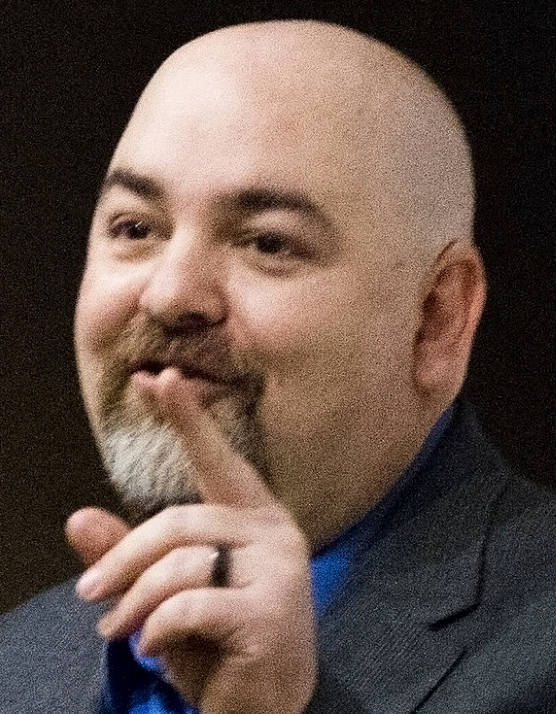
On this date in 1969, public speaker and internet personality Matthew Wade Dillahunty was born in Kansas City, Mo. He was raised in a Southern Baptist home. He was a fundamentalist Christian for over 20 years, but after serving from 1987-95 in the U.S. Navy and working in high tech, he found a need to reaffirm his faith in order to continue a life with the ministry. This attempt to fortify his faith turned into a long-term investigation to understand reason in terms of his religion.
From 2006-13, Dillahunty was president of the Atheist Community of Austin, Texas. The ACA is a nonprofit organization with a variety of goals including developing and supporting the atheist community, providing opportunities for socialization and friendship and working with like-minded organizations to oppose discrimination against atheists. Not only does the ACA serve its local community, it provides an online portal of free resources accessible to the community at large.
One of its most-effective outreach projects is “The Atheist Experience” TV show, a weekly program geared towards a nonatheist audience. Dillahunty has been hosting the show since 2005 and was a co-host of “The Non Prophets” internet radio show prior to that.
He also founded The Iron Chariots, an online encyclopedia intended to provide information on philosophical apologetics and non-apologetics. Additionally, he contributed to the novel Deconverted: a Journey from Religion to Reason (2012), an autobiographical account of a Protestant Christian who eventually creates a popular online atheist community called The Thinking Atheist. Dillahunty travels nationwide as a member of the Secular Student Alliance’s speaker’s Bureau. In 2012, he won the Catherine Fahringer Freethinker of the Year Award from the Freethinkers Association of Central Texas.
In Episode 771 of “The Atheist Experience” (July 22, 2012), Dillahunty called the Catholic Church “a nonsensical organization; a bunch of fat lazy do-nothings who have been living off the public dole for centuries. The fact that they can do good is a testament to the fact that there are good people who will do good. But the organization is corrupt, it is poison to its core and it serves no essential good purpose – no true purpose. It’s lie after lie, promoting harm to real people …”
In 2011 he married Beth Presswood, an “Atheist Experience” colleague and co-host of “The Godless Bitches” podcast. They divorced in 2018.
PHOTO: Dillahunty in 2014 at SashaCon; Mark Schierbecker photo under CC 3.0.
“Faith is the excuse people give for believing something when they don’t have evidence.”
— Dillahunty, "The Atheist Experience" Episode 696 (Feb. 13, 2011)
A.C. Grayling
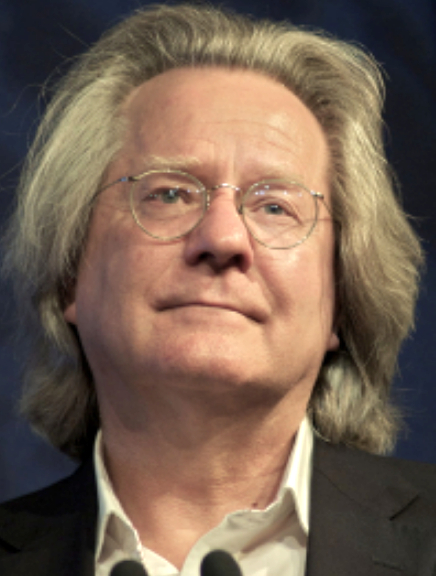
On this date in 1949, British author, philosopher and atheist Anthony Clifford Grayling was born in Northern Rhodesia (now Zambia), where his father was a banker. He spent his childhood in Africa. When he was 19, his older sister Jennifer was murdered in Johannesburg. When her parents went to identify the body, her mother had a fatal heart attack. After earning a B.A., M.A. and Ph.D. in England, Grayling lectured in philosophy at Bedford College-London and St. Anne’s College-Oxford before taking up a post in 1991 at Birkbeck College-University of London, where he was a philosophy professor until 2011. He then founded and became the first master of New College of the Humanities.
Grayling is the author of over 30 books on philosophy, biography, the history of ideas, human rights and ethics, including The Refutation of Scepticism (1985), The Future of Moral Values (1997), Wittgenstein (1992), What Is Good? (2000), The Meaning of Things (2001), The Good Book (2011), The God Argument (2013), The Age of Genius: The Seventeenth Century and the Birth of the Modern Mind (2016), War: An Enquiry (2017) and Democracy and its Crises (2017). His 2006 play “Grace” was co-written with Mick Gordon. The title character is a science professor who rejects religion.
He’s a vice president of the British Humanist Association, an honorary associate of the National Secular Society and has held positions with many other academic and literary organizations. The awards bestowed on him are numerous, including the Order of the British Empire, and others honoring his contributions to philosophy and ethics. One current biographical source says that Grayling believes that religion for historical reasons has had influence far out of proportion to the number of adherents and its intrinsic merits, “with the result that they can distort such matters as public policy (e.g., on abortion) and science research and education (e.g., stem cells, teaching of evolution).”
In a 2013 interview, freethinker Sam Harris asked Grayling if “a person can be both a humanist and a person of faith?” Grayling replied, “No, religion and humanism are not consistent — unless you mean ‘humanism’ in the Renaissance sense, where it denoted the study of classical literature. But this study soon showed people that the ideas and outlook of classical thought is at odds with religion, which is why humanism is now a secular philosophy.”
He and his wife, novelist Katie Hickman, have a daughter, Madeleine, and a stepson, Luke. He also has a son, Jolyon, and a daughter, Georgina, from his first marriage.
“In the study of history I became aware of the effects of religious divisions and sectarianism on individuals and societies, and came to think that freedom from religious influence is a human rights issue. I am an atheist, a secularist and a humanist.”
— Grayling, interviewed by Sam Harris, samharris.org (March 30, 2013)
Shelley Segal
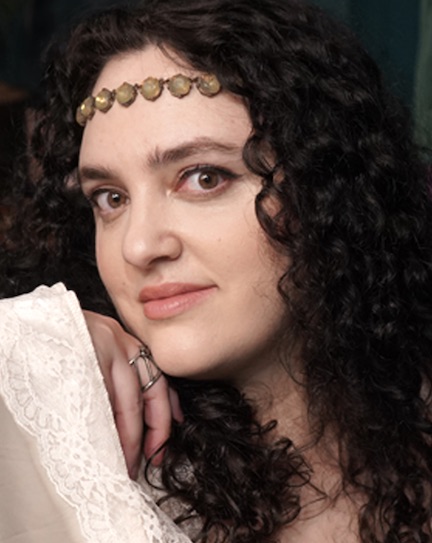
On this date in 1987, singer/songwriter Shelley Segal was born in Melbourne, Australia, to Jenny and Danny Segal in a traditional Jewish household. For years, her dad was president of the East Melbourne Hebrew Congregation, an Orthodox synagogue. He fronted a klezmer band that was often booked for celebrations of life-cycle events like bar and bat mitzvahs. Jenny, whom Shelley calls “Mum,” managed the band.
Displaying her own talent and surrounded by working musicians, Segal started sitting in with the group when she was 11, playing acoustic guitar and adding her voice to her dad’s. Her religious doubts started during school biology classes when the topic was evolution. “I probably called myself an atheist at 18, but I still thought religion was positive, if not for me. It was the beginning of learning to think critically.” (The Age, April 14, 2012)
“When I got some distance and perspective I saw things I might take issue with — women being separated [in synagogue] and not being allowed to take part in the service or lead the service and, looking back, it’s abhorrent to me that I didn’t see a problem. … When as a teenager I came home and said I didn’t believe in God, it must have felt like a complete rejection. The more I meet people in the movement and hear how hard it’s been for them, the more impressed I am by my family.” (Ibid.)
She released an EP composed of songs she wrote at ages 15–21 in 2009. “An Atheist Album” (2011) included the single “Saved.” It was the first time she’d ever written about her beliefs. “I was told very kindly and very politely by a preacher in the street that I was going to burn in hell forever. So I felt like I wanted to push back and say, ‘I won’t be told how to live my life.’ ” (FFRF’s “Freethought Matters,” Jan. 23, 2025)
“An Atheist Album” explored her beliefs and was hard for her dad to accept, she said, but they had reached common ground and could still play together. “My overall goals are to increase empathy and lessen suffering, humanist goals, those are things my dad can agree with me on.” (Melbourne Herald Sun, Feb. 27, 2013) One of their favorites to perform together is Leonard Cohen’s “Dance Me to the End of Love.”
Segal performed at the Reason Rally for religious skeptics in Washington, D.C., in 2012 and 2016, then moved to Los Angeles. By then she had released five recordings. Segal co-produced the 2023 single and video tribute “Mother” with her husband Rob J Robertson. Her dad played violin.
She opened Secret Sauce Studio & Production House in Los Angeles and has been a guest several times on FFRF media and at events, including the 2013 national convention and FFRF’s 2024 winter solstice celebration at Freethought Hall in Madison, Wis.
PHOTO: Courtesy of Shelley Segal.
What will it take for you
To start opening your eyes
To start questioning the bullshit everyone around you buys
You think it’s any of your business what goes on between my thighs?
I wonder, I wonder,
When we’ll be rid of your lies.— A verse from Segal's song "Saved"
Marjory Stoneman Douglas
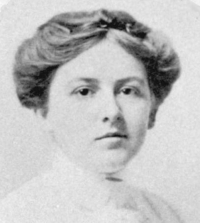
On this date in 1890, Marjory Stoneman Douglas, who became one of the greatest environmental writers and activists of the 20th century, was born in Minneapolis, the only child of Frank Stoneman and Florence (Trefethen) Douglas. Her parents separated when she was 6 and she had an unsettled upbringing, with her mother suffering from mental illness. Her upbringing, she wrote in her 1987 autobiography, contributed to her becoming “a skeptic and a dissenter.” After graduating from Wellesley College in 1912 (her mother died when she was a senior), Douglas served in Europe during World War I with the American Red Cross.
She became an early feminist and vigorous civil rights activist. In 1916 she and others lobbied Florida legislators for women’s suffrage. She had moved to Florida and married Kenneth Douglas in 1914, a much older man who was later revealed to be a bigamist and con artist. She went to work for her father in 1915 at the paper that became the Miami Herald. From 1920 to 1990, Douglas published 109 fiction articles and stories.
She dedicated five years to her groundbreaking book The Everglades: River of Grass (1947). The book forever changed the way that Americans viewed wetlands and the relationship between Floridians and the Everglades. It was a best-seller and battle anthem for preservationists. She founded Friends of the Everglades in the 1960s and led the group for three decades. In 1993 she was awarded the Presidential Medal of Freedom by President Bill Clinton. She was inducted into the National Wildlife Federation Hall of Fame in 1999 and the National Women’s Hall of Fame in 2000.
Although Douglas grew up in a religious household, she called herself an agnostic. In her autobiography she wrote, “The soul is a fiction of mankind, because mankind hates the idea of death. It wants to think that something goes on after. I don’t think that it does, and I don’t think we have souls. I think death is the end. A lot of people can’t bear that idea, but I find it a little restful, really.”
Before her death at age 108, she asked that there be no religious ceremony. (D. 1998)
PHOTO: Marjory Stoneman as a Wellesley senior.
“I believe that life should be lived so vividly and so intensely that thoughts of another life, or of a longer life, are not necessary.”
— Douglas' autobiography "Marjory Stoneman Douglas: Voice of the River" (1987)
Joseph Cunningham
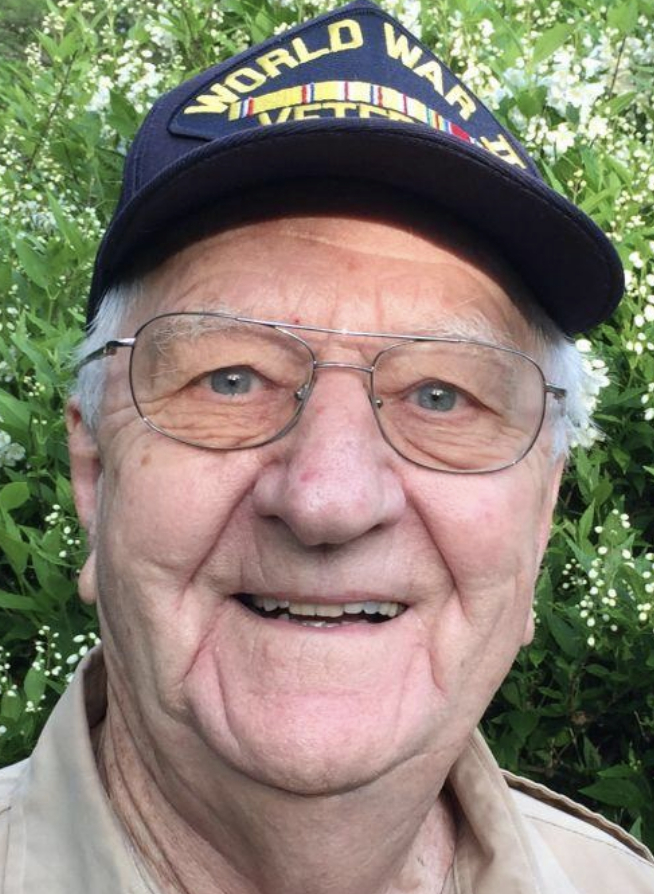
On this date in 1926, freethinking educator and military “foxhole atheist” Joseph Cunningham was born into a religious and financially struggling family near Wadestown, W. Va. (population 50). The family of eight moved to Oklahoma, then to Michigan, where they lived in an abandoned rural grocery store, and then to Illinois, where Cunningham graduated from high school in Carmi.
He enlisted in the U.S. Navy, serving in the Pacific aboard the attack transport USS Bosque. After World War II he received $65 a month from the G.I. Bill to attend Southern Illinois University, where he graduated with a major in history and minors in English and business.
He taught for two years in a one-room school without electricity. After earning his master’s from SIU he taught a wide variety of subjects at Mascoutah High School, where he met his future wife Norma Steines Cunningham, also a teacher and religious skeptic. They married in 1953 and had two daughters, Kathryn and Linda, who were raised in a secular environment. The Cunninghams were married for 64 years until her death in 2018 at age 100.
Cunningham served on FFRF’s executive board of directors for 38 years. As a veteran, he was also very involved with bringing FFRF’s Atheists in Foxholes monument to fruition in Madison, Wis.
Another project he took up after retirement was the planting of thousands of daffodils along Illinois Route 4. And since they are perennials, the thousands have turned into millions. He was honored nationally on Earth Day in 2015 for his green thumb and by the city of Mascoutah and the Federated Garden Clubs of Missouri and Illinois.
“Oh that I could have become a freethinker earlier in life,” Cunningham said in a 2019 email. “I spent many a sleepless night thinking the world would end at any second and that possibly I would end up in a never-ending, burning hell because I had accidentally done something that an angry god disapproved.”
“Any good that I can do, let me do it now, for I shall not pass this way again.”
— Cunningham's quote to live by (October 2019 email)
Sam Harris
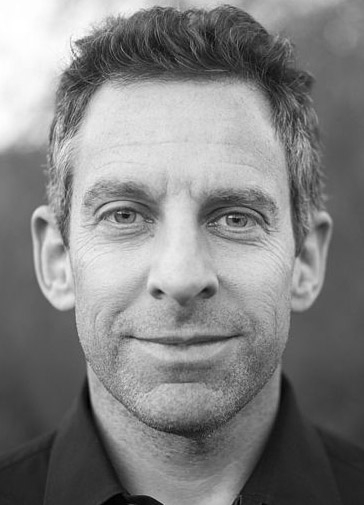
On this date in 1967, author and neuroscientist Samuel Benjamin Harris, a key figure in the 21st century freethought movement, was born in Los Angeles, the son of TV producer and writer Susan (Spivak) Harris and actor Berkeley Harris, who divorced when Sam was 2. He grew up in his mother’s secular household and enrolled at Stanford University to study philosophy but left during his sophomore year to study Eastern religions and meditation in India. He eventually returned to Stanford and graduated in 2000.
He started writing his first book, The End of Faith, after the Sept. 11 attacks in 2001. It received the PEN/Martha Albrand Award for First Nonfiction in 2005 and was followed by his Letter to a Christian Nation in 2006. Harris married in 2004 and has two daughters with his wife Annaka, an author and science editor. They co-founded the nonprofit Project Reason in 2007. He received a Ph.D. in cognitive neuroscience in 2009 from UCLA. Five of his books are New York Times bestsellers. His latest, as of this writing, are Waking Up: A Guide to Spirituality Without Religion (2014) and Islam and the Future of Tolerance (with British activist Maajid Nawaz, 2015).
Harris is generally considered a member of the “Four Horsemen of New Atheism” along with Richard Dawkins and the late Daniel Dennett and Christopher Hitchens. The name comes from the title of a video they made during a two-hour unmoderated discussion at Hitchens’ home on Sept. 30, 2007. Journalist Simon Hooper described New Atheism as “the view that superstition, religion and irrationalism should not simply be tolerated but should be countered, criticized and exposed by rational argument wherever its influence arises in government, education and politics.”
Harris has no use for the term New Atheism or for the atheist label. In a 2007 speech he said that while he had become “one of the public voices of atheism, I never thought of myself as an atheist before being inducted to speak as one. I didn’t even use the term in The End of Faith, which remains my most substantial criticism of religion. And, as I argued briefly in Letter to a Christian Nation, I think that ‘atheist’ is a term that we do not need, in the same way that we don’t need a word for someone who rejects astrology. We simply do not call people ‘non-astrologers.’ All we need are words like ‘reason’ and ‘evidence’ and ‘common sense’ and ‘bullshit’ to put astrologers in their place, and so it could be with religion.”
PHOTO: By Christopher Michel under CC 4.0.
“It is time that we admitted that faith is nothing more than the license religious people give one another to keep believing when reasons fail.”
— Harris in "Letter to a Christian Nation" (Knopf, 2006)
Jimmy Dunne
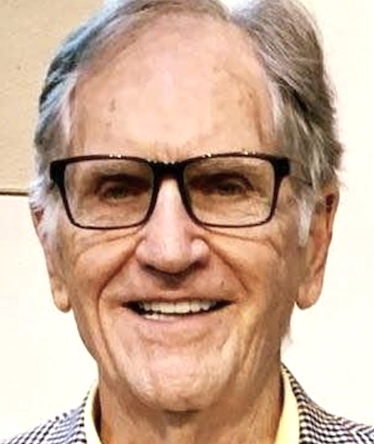
On this date in 1934, atheist activist Jimmy Charles Dunne was born in Houston, Texas, to Frieda (née Yost) and Julius Dunne. His mother was a Nebraska-born nurse who met his father in Chicago, where he was studying to be a podiatrist, a quest he gave up during the throes of the Depression and eventually founded a successful advertising company employing several salesmen.
The eldest of five children, he remembers his father taking them to Catholic Mass on Sundays. “As a teenager, I had doubts about religion — from Mary, mother of Jesus, being a virgin to the pope being infallible,” he said at age 90, describing himself as “a 100 percent atheist and a humanist.”
After high school graduation, he worked for a summer at a men’s clothing store before enrolling in 1952 at Texas A&M, an all-male college without enough social life to suit him. He transferred after a year to the University of Houston, where he graduated. He then worked in New Orleans in the U.S. Department of Labor’s wage and hour division.
He tamed his fear of public speaking by completing a Toastmasters International course, then started teaching math in middle school in Houston while operating a singles dance club during his off hours at various venues for three years starting in 1961.
Using corporal punishment to spank recalcitrant students bothered him as cruel and ineffective, so he founded People Opposed to Paddling Students (POPS) and started speaking out, appearing on “The Phil Donahue Show,” “Good Morning America” and other shows. He addressed school boards, the Texas Legislature and a U.S. congressional committee on the need to put away the paddles. Newsweek magazine detailed his efforts in a story on June 22, 1987.
As he detailed in a January 2025 speech titled “From Introvert to Extrovert to Atheist” to the Unitarian Fellowship of Houston, once when President Jimmy Carter came to Houston, Dunne asked him if using wooden boards on students constituted child abuse. The president replied that they had spanked their sons but stopped the practice after daughter Amy was born. Corporal punishment in schools is still legal in Texas and several other states as of this writing in 2025.
His career also includes service in the U.S. Army and employment with the Interstate Commerce Commission in Washington, D.C. He and his first wife Lindacarol, who worked as a draftsperson, married in 1968 and had a daughter Melody (b. 1971). Divorcing after 10 years, he married Melinda, a junior high English teacher who died from uterine cancer in their 21st year of marriage. He and Karen, his third wife, met at a current events discussion group and are divorced but still living together.
Dunne, an inveterate letter writer on behalf of progressive causes, served for five years as president of Humanists of Houston, led a local Amnesty International chapter and still gathers regularly with a lunch group called the Hungry Heathens. He supports the Freedom From Religion Foundation as a Life Member “for all the enlightenment they are doing through education and taking on legal issues concerning separation of church and state.”
His activism has involved campaigning against long-term solitary confinement in prison and working with the Texas Coalition to Abolish the Death Penalty. He credits Pope Francis for “inching” the church forward in a few regards but roundly criticizes it for barring gay marriage, birth control and female clergy. “It’s good that we have ‘cafeteria Catholics’ who pick and choose which pronouncements they will honor.”
“The Catholic Church is like a turtle. It moves very slowly, dropping poop along the way that followers must step in. … The church has lied for centuries claiming that there is a God, a heaven and a hell, when there is no evidence that they exist.”
— Dunne letter to the editor, Houston Chronicle (Dec. 31, 2023)
Anthony B. Pinn
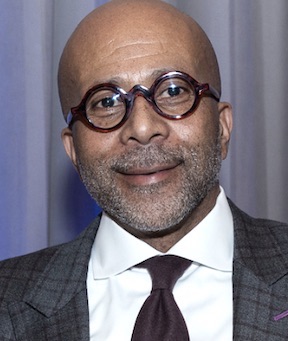
On this date in 1964, humanist scholar Anthony Bernard Pinn was born to Raymond and Anne Pinn in Buffalo, N.Y. He grew up going to Baptist and African Methodist Episcopal (AME) churches and decided that he was going to be a minister. He preached his first sermon from the pulpit at age 12 and later transferred from public school to a Southern Baptist high school before enrolling at Columbia University, where he earned a B.A. He worked as an AME youth pastor in Brooklyn and Boston but started to believe that the church had no real answers to people’s problems. “I was moving from this kind of evangelical fundamentalist position to something more along the lines of the social gospel, but it still wasn’t getting it done.” (October 2014 speech at the Freedom From Religion Foundation’s national convention.)
Continuing his studies, he earned a master of divinity degree and a Ph.D. in philosophy from Harvard in 1994. His dissertation title was “ Wonder as I Wonder: An Examination of the Problem of Evil in African-American Religious Thought.” He had been questioning whether God existed and was having issues with theism more than religion. He asked himself, “Do the people matter, or is it the tradition that matters?” He relinquished his minister’s credentials, remaining interested in religion but seeing it as “a force that needed to be wrestled with and understood as a cultural development that shaped world events in some profound ways.” In his first book, Suffering and Evil in Black Theology (1995), Pinn discussed theodicy (why God permits evil) from an African-American perspective. How, he asked, can black theists, particularly black theologians, make sense of a perfect, benevolent God in light of African-American suffering?
After teaching at Gordon-Conwell Theological Seminary, Suffolk University and Macalester College, he accepted an offer in 2003 from Rice University in Houston, becoming the first African-American to hold an endowed chair there as a professor of humanities and religion. Pinn is the founding director of the Center for Engaged Research and Collaborative Learning at Rice and director of the Institute for Humanist Studies in Washington. He’s the author, co-author or editor of more than 35 books, including the Fortress Introduction to Black Church History (with his mother, Anne H. Pinn, an AME minister, in 2001), The End of God-Talk: An African American Humanist Theology (2011), Writing God’s Obituary: How a Good Methodist Became a Better Atheist (2014), Humanism: Essays in Race, Religion, and Cultural Production (2015) and When Colorblindness Isn’t the Answer: Humanism and the Challenge of Race (2017).
His awards include the African-American Humanist Award from the Council for Secular Humanism (1999), Harvard University Humanist Association Humanist of the Year (2006) and Unitarian Universalist Humanist Association Humanist of the Year (2017). He was named a recipient in 2019 of FFRF’s Emperor Has No Clothes Award for speaking truth to power. Pinn’s research interests include humanism and hip hop culture. He married journalist Cheryl Johnson in 2000. They separated in 2005 and divorced in 2015.
PHOTO: Pinn receiving FFRF’s Emperor Has No Clothes Award; Ingrid Laas photo.
“For me the title is a way of capturing the decline and eventual death of a concept — God — that had been important to me for years. I wanted the title to reflect my transition from theism to nontheistic humanism through my push away from God — God being the central category of my religious youth.”
— Anthony Pinn, interview, Religion News Service, April 1, 2014, on his book "Writing God’s Obituary: How a Good Methodist Became a Better Atheist"
Richard E. Grant
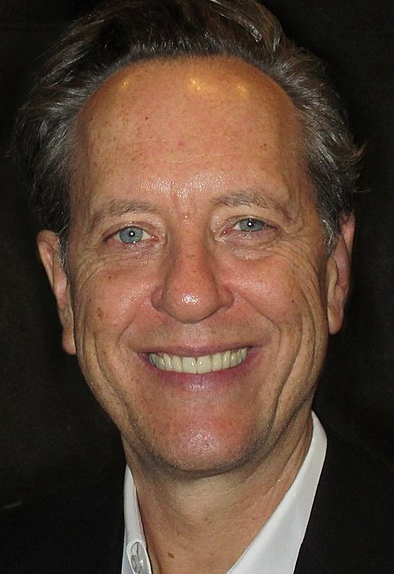
On this date in 1957, actor Richard E. Grant (né Richard Grant Esterhuysen) was born in Mbabane, the capital of Swaziland when it was a British protectorate and his father Henrik was the nation’s director of education. He had a tough childhood. Henrik was an alcoholic who could become abusive, and his mother Leonne ran off with her husband’s best friend not long after Richard saw them having sex in the back seat of a car when he was 10. Henrik shot at Richard one night and “then passed out. He didn’t remember it the next day,” Richard said. He told The Independent in 2006 that he was estranged from his younger brother Stuart.
After studying English and drama at the University of Capetown and joining an acting company there, he moved to England in 1982, the year after Henrik died at 51 of cancer. He made his film debut in the drama “Withnail and I” (1987), followed by film roles in “L.A. Story” (1991), “Bram Stoker’s Dracula” (1992), “Gosford Park” (2001), “The Iron Lady” (2011) and “Logan” (2017). He was nominated for a Best Supporting Actor Oscar for his performance in “Can You Ever Forgive Me?” (2018). On television, he played Bob Cratchit in TNT’s “A Christmas Carol” (1999) and appeared in “Star Wars: Episode IX” (December 2019 release).
Grant has written three books and started marketing a line of Jack perfumes in 2014. He married voice coach Joan Washington, eight years his senior, in 1986. They have a daughter, Olivia, and she has a son, Tom. He described himself in April 2014 to The Telegraph newspaper as a “confirmed atheist.”
In February 2000 he told The Daily Mail that, “Like [my father], I absolutely believe in the here and now. I have no expectation that there’s anything beyond. Life’s to be grabbed with every fibre of your being.” In October 2005, he told The Times of London that although his wife is a Christian, she encouraged their daughter to make up her own mind: “Like me, she came to the conclusion that both Heaven and Hell are here on Earth.”
PHOTO: Grant in 2018; photo by Greg2600 under CC 2.0.
“I took a comparative religion course when I was at university to get an overview, but it had no impact whatsoever. As far as I’m concerned, Darwin has come up with the best theory of how, when and why we are here. Nothing else has convinced me otherwise.”
— Grant interview, The Times of London, Oct. 29, 2005
Margaret Cole
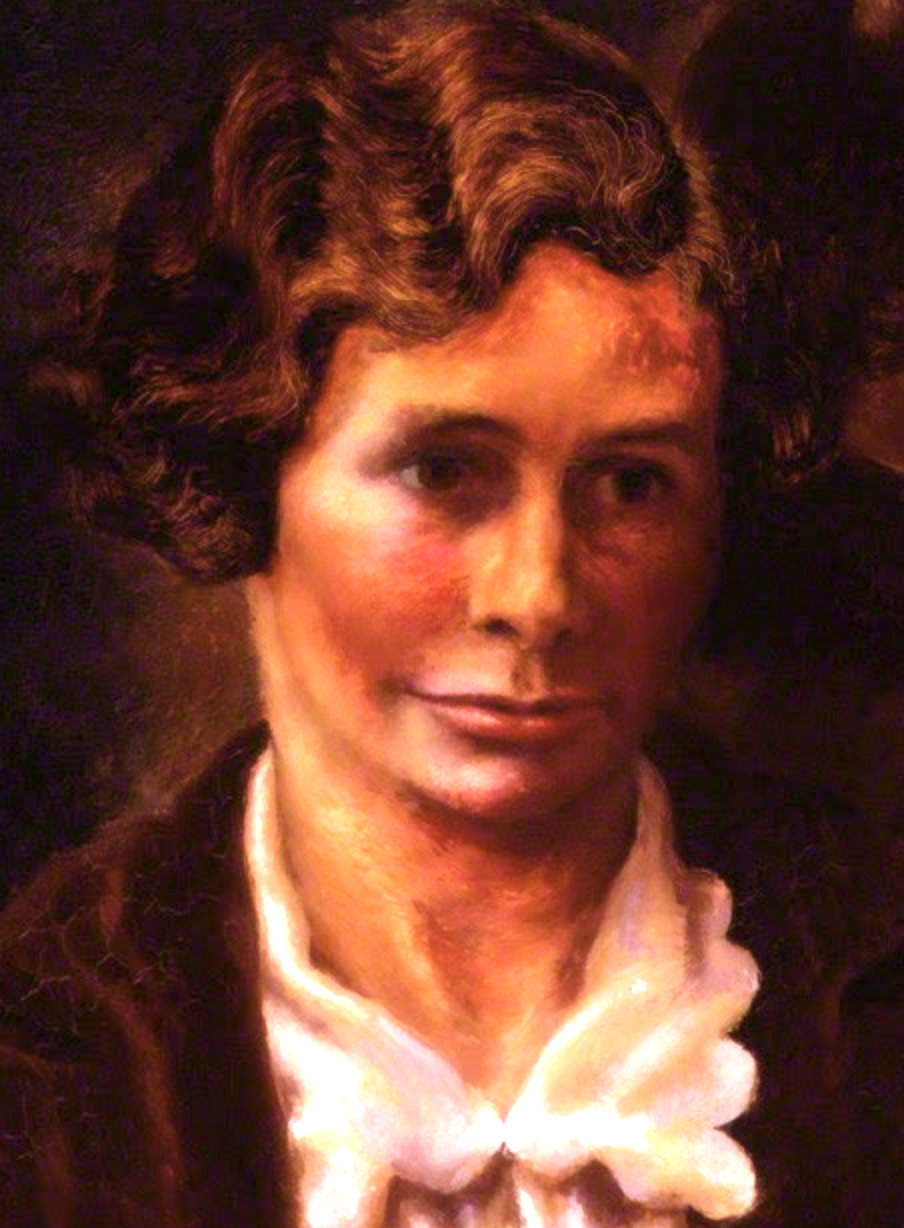
On this date in 1893, English socialist, politician and poet Margaret Isabel Cole (née Postgate) was born in Cambridge, England, to John and Edith (Allen) Postgate. They raised her with a well-rounded education at Roedean School and Girton College, Cambridge. During her time at Girton, Cole was inspired by the works of intellectuals such as J.A. Hobson, H.G. Wells, Sidney Webb, Beatrice Webb, George Bernard Shaw and Noel Brailsford.
These readings led her toward a life of socialism, feminism and atheism and away from her conventional Anglican upbringing. Cole became a classics teacher at St. Paul Girls School at Cambridge. Her brother shared some of her interests and was imprisoned during World War I as a conscientious objector.
While working with the No-Conscription Fellowship, she met George Cole, who led a movement known as Guild Socialism. They married in 1918 and joined the socialist Fabian Society before moving to Oxford in 1924. During their time there they taught, co-authored numerous mystery novels and created the Socialist League. Although she was anti-World War I, she espoused military action in the 1930s after witnessing the rise of Hitler and the Nazi Party.
In 1949, her autobiography, Growing Up Into Revolution, was published. She wrote many other books, including a biography of her husband.
Cole was committed to the well-being of London’s citizens and came to be a founding member of the Inner London Education Authority in 1965, where she remained until 1967, when she retired. She received the Order of the British Empire in 1965, the equivalent of being knighted for men, and thus became Dame Margaret Cole. She used her academic exposure to introduce comprehensive education in London throughout the rest of her life. (D. 1980)
PHOTO: Reproduction of a Cole portrait by Australian artist and feminist Stella Bowen, c. 1944.
“[Conscientious objection] on religious grounds was for most part treated with respect, particularly if the sect had a respectable parentage. … But non-Christians who objected on the grounds that they were internationalists or Socialists were obvious traitors in addition to all their other vices, and could expect little mercy.”
— Margaret Cole, "Growing Up Into Revolution" (1949)
Juan Mendez
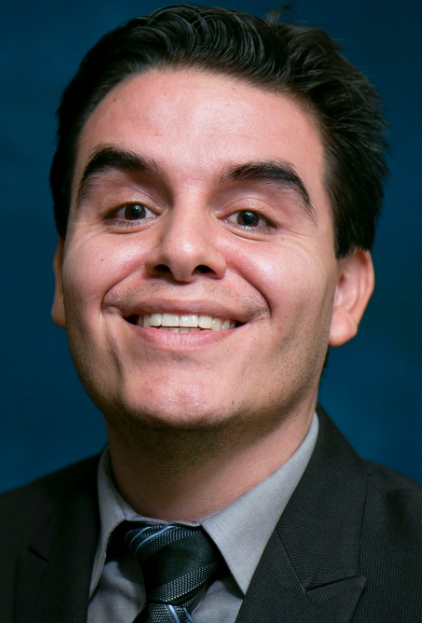
On this date in 1985, community activist and state legislator Juan Mendez was born in Arizona. A first-generation American, he graduated from high school in Tolleson, a Phoenix suburb, and from Arizona State University with a major in political science and minor in justice studies. He then worked as political coordinator for Iron Workers Local 75 and as a program instructor for the Boys and Girls Club of the East Valley. From 2009-13, he ran the nonprofit Arizona Community Voice Mail to help connect the homeless to jobs, housing, information and hope.
Mendez burst into the national consciousness after being elected in 2012 to the Arizona House of Representatives from District 26. The 240 words of his secular invocation to open a House session caused quite a stir on May 21, 2013.
Such a “nonprayer” in a statehouse was unheard of at the time. Mendez also introduced Secular Coalition for Arizona members sitting in the gallery. One member said later she was “witnessing history.” In recognition of Mendez’s courage, FFRF bestowed on him its Emperor Has No Clothes Award, which he accepted at the 2013 national convention in Madison, Wis. After Gov. Jan Brewer signed an executive order in August 2014 to create the Governor’s Office of Faith and Community Partnerships, Mendez joined a group at the Capitol to criticize the office.
He was reelected in November 2014 and became involved in another invocation controversy in 2016. After he had signed up in January to give an invocation, House Majority Leader Steve Montenegro blocked him, saying all invocations had to be made to a “higher power” and even barring moments of silence. Mendez then used his right in February to make personal comments from the floor to offer a secular invocation after the official prayer, saying the state’s diversity includes people of different religions “and lack thereof. We need not tomorrow’s promise of reward to do good deeds today.”
Early in the next month, he offered another, after which Montenegro said that because Mendez didn’t invoke God, a Baptist minister would, calling Mark Mucklow to the podium. “At least let one voice today say ‘Thank you, God bless you,’ ” Mucklow proclaimed at the end of his prayer.
Mendez was elected to the state Senate in 2016, 2018 and 2020. He and his wife, state Rep. Athena Salman, have a daughter, Nausicaa Mendez Salman, born in January 2022. They were both reelected in November 2022.
PHOTO: by Brent Nicastro
“I am an atheist because I’ve found no faith in any deity from Thor to Zeus. I am so grateful for the work the people in this room have done to advance the separation of state and church, to educate communities, to build a culture that made it possible for me, as a state legislator from Arizona, to talk honestly about what I do and don’t believe in.”
— FFRF convention speech, Sept. 27, 2013
José Mujica
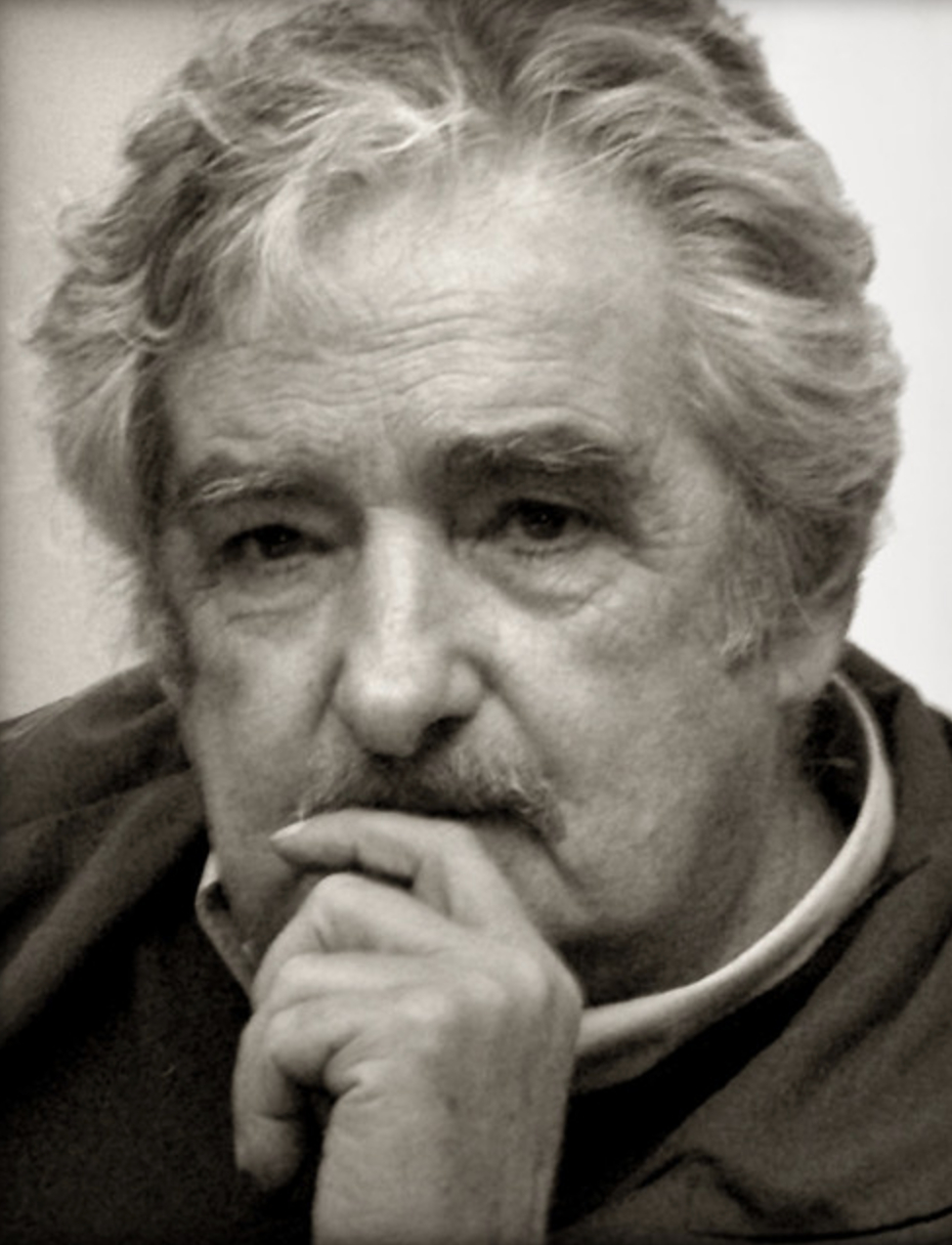
On this date in 1935, José Alberto Mujica Cordano, 40th president of Uruguay, was born in Montevideo. When Mujica was 7, his farmer father went bankrupt and died shortly after. Mujica worked delivering baked goods and as a teen was an avid bicyclist. Politically involved as a youth, he joined the Tupamaros, revolutionaries fighting Uruguay’s brutal dictatorship in the 1960s. He was imprisoned for 14 years, many spent in solitary confinement. He was freed in 1985, as the dictatorship waned, under a general amnesty.
First elected to the Senate in 2000, Mujica served as agriculture minister from 2005-08 before winning the presidential election in 2009 as a member of a coalition of left-wing parties. He led a party known as the Movement of Popular Participation (MPP) that he formed with fellow Tupamaros. During his presidency from 2010-15, the economy prospered and gay marriage, abortion and marijuana were legalized. He was nominated for the Nobel Peace Prize in 2012.
He was often referred to as “the world’s poorest” and “the world’s most humble” president since he donated 90% of his salary to charity, making his income similar to the average wage. Never taking residence in the presidential house, Mujica lived in a one-bedroom house on a small farm on the outskirts of Montevideo with his wife Lucía Topolansky and their three-legged dog Manuela.
He died a week short of his 90th birthday at his farm on the outskirts of Montevideo. The government declared three days of national mourning and an estimated 100,000 people attended his funeral. (D. 2025)
PHOTO by Vince Alongi
“I still have not been able to believe in God.”
— El Espectador, Colombian daily newspaper (May 16, 2012)
Andrei Sakharov
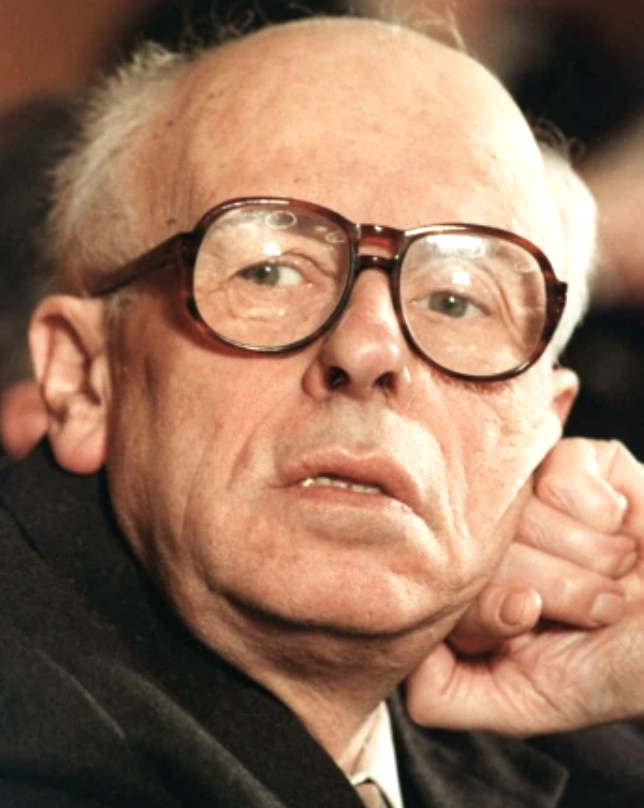
On this date in 1921, Andrei Dmitrievich Sakharov — nuclear physicist, dissident, Nobel laureate and activist for disarmament and human rights — was born in Moscow to Yekaterina Alekseevna (née Sofiano) and Dmitri Ivanovich Sakharov.
His father was a physics professor and nonbeliever, and his mother and grandmother were religious. The younger Sakahrov decided in his early teens that he was an atheist but believed a “guiding principle” transcended physical laws. (“Andrei Sakharov: The Conscience of Humanity,” 2015)
He studied physics at Moscow State University and after graduating worked in a laboratory in Ulyanovsk. He married Klavdia Alekseyevna Vikhireva in 1943. They raised two daughters and a son. He earned a Ph.D. in 1947. Under the auspices of the Physical Institute of the Soviet Academy of Sciences, he joined a team that built the USSR’s first device, a low-yield uranium bomb detonated in August 1949.
Sakharov played such an integral role in his next project that he became known as the father of the Soviet hydrogen bomb, a design first detonated in 1955. He would later express worry about the effects of radiation, along with deeper concerns: “What most troubles me now is the instability of the balance, the extreme peril of the current situation, the appalling waste of the arms race.” (“New Dictionary of Scientific Biography,” 2008)
He worked on what became the Partial Nuclear Test Ban Treaty signed in Moscow in 1963 by the the U.S., Soviet Union and Britain, banning nuclear weapons tests in the atmosphere, outer space and under water. He returned to fundamental science and began working on particle physics and physical cosmology, including theorizing why the curvature of the universe is relatively small.
He began taking public stances that were politically (and hence physically) risky in a “gulag” state. He opposed scientific academy membership for a proponent of the pseudoscience of Lysenkoism, which denies genetics and well-established agricultural science. The application of Lysenkoism led to the starvation of millions of Russians. Sakharov also opposed the development of an anti-ballistic missile system..
Sakharov married Yelena Bonner in 1972, three years after his first wife died. Bonner, who had a medical background, was a fierce critic of human rights abuses and thus fell under the eye of the KGB along with Sakharov. She was in Italy for medical treatment in 1975 and traveled to Norway to accept his Nobel Peace Prize after he was denied a visa to attend.
The Nobel citation called him “the conscience of mankind” and said he had “fought not only against the abuse of power and violations of human dignity in all its forms, but has in equal vigor fought for the ideal of a state founded on the principle of justice for all.”
After he denounced the 1979 invasion of Afghanistan, he was arrested and banished to Gorky, 250 miles east of Moscow, where he spent seven years in exile. He was named 1980 Humanist of the Year by the American Humanist Association and in 1988 was the recipient of the International Humanist Award by the International Humanist and Ethical Union.
The European Parliament established the Sakharov Prize for Freedom of Thought, to be given annually for outstanding contributions to human rights, in 1985. Biographer Gennady Gorelik called him “a totally nonmilitant atheist with an open heart.”
He died at home in Moscow at age 68 of dilated cardiomyopathy. (D. 1989)
“Like most of the physicists of his generation, he was an atheist. In his later years, this son of a physicist, grandson of a lawyer, and great-grandson of a priest was to come to a new — and free thinking — view of religion. … [He] was simply a humanist for whom it was enough to show his compassion for a fellow man.”
— "The World of Andrei Sakharov: A Russian Physicist's Path to Freedom" by Gennady Gorelik with Antonina Bouis (2005)
Amy Schneider
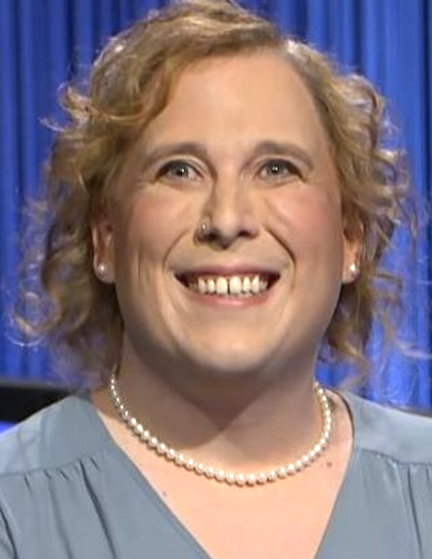
On this date in 1979, “Jeopardy!” champion Amy Schneider (née Thomas E. Schneider) was born in Dayton, Ohio, to Betty Jo (Sacksteder) and James Schneider. Her mother taught math, including at the college level, and her father was a programmer for the University of Dayton and later a reference librarian.
Schneider, the first transgender contestant in “Jeopardy!” history to make the Tournament of Champions and the highest-winning woman ($1,382,800), grew up watching the show with her devoutly Catholic parents. She participated in theater in high school before majoring in civil engineering and computer science at the University of Dayton on her way to becoming a software engineer.
Schneider, later living in Oakland, Calif., tweeted: “In 2016, my father passed away, Kevin Durant joined the Warriors, my wife and I split up, I realized I was trans, and Trump got elected. It was quite a year!” (Twitter, Dec. 7, 2021) Her father died at age 68 when a vehicle hit him and the bicycle he was riding. He was also undergoing cancer treatment.
She wore a transgender flag pin on the show around Thanksgiving because she wanted to show support for the “disproportionately high number of trans people” who are estranged or cut off from their families. (Washington Post, Jan. 26, 2022) That wasn’t the case for her.
She has a tattoo on her left arm of the titular character from L. Frank Baum’s novel “Ozma of Oz.” Schneider, explaining: “When she was an infant, she was kidnapped and enchanted by an evil sorceress and raised as a boy. And then the enchantment was lifted and she was revealed to be the beautiful princess she was all along.” (New York Times, Jan. 26, 2022)
New York Times reporter Shane O’Neill: “Catholicism was very important to her family, and Ms. Schneider struggled with her faith when she was younger. She recounted one moment in 2002 when she had driven with her brother and two cousins to Toronto to see Pope John Paul II for World Youth Day. Ms. Schneider agreed to the trip in part to avoid telling her mother that she no longer considered herself Catholic.” (Ibid.)
She was defeated in her 41st appearance by Chicago librarian Rhone Talsma, who correctly answered “What is Bangladesh?” to the clue “The only nation in the world whose name in English ends with an H, it’s also one of the 10 most populous.” Schneider left her response card blank.
“Ms. Schneider describes herself as an atheist who doesn’t believe in the occult or the supernatural but, as she said, ‘It’s not a queer meet cute if there’s not tarot.’ ”
— Interviewer Shane O'Neill, explaining "The Star" tarot card on a necklace Schneider was wearing that her girlfriend gave her. (New York Times, Jan. 26, 2022)
Kerry King
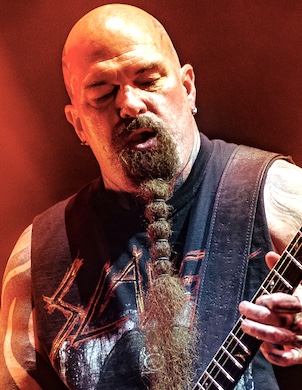
On this date in 1964, iconoclast and rock musician Kerry Ray King was born in Los Angeles, where he grew up with two older sisters. His father was an aircraft parts inspector, and his mother worked for a phone company. He started playing guitar at age 13. The first song he learned was Ted Nugent’s “Cat Scratch Fever.” He was enamored with artists such as Judas Priest and Eddie Van Halen.
Although they were not religious, his parents suggested, when he was in grade school, that he should check out Sunday school. “[L]ike a week into it, I went to my parents. I’m, like, ‘I don’t think I want to go to this anymore.’ Even that little kid knew it was a bunch of dog shit.” (Consequence.net, June 4, 2024)
King excelled academically and won an award as his school’s top math student in junior high. Then puberty kicked in. “I was really good at school until I discovered girls, and then it was all over. It’s a good thing I didn’t plan on college or anything because I probably would have failed miserably. I was such a smart kid, but once high school came around and girls were in the picture, the grades went south.” (Metal Hammer, Jan. 2, 2019)
In 1981 he formed a “thrash metal” group called Slayer with Jeff Hanneman, Dave Lombardo and Tom Araya. The group disbanded in 2019 and announced several reunion shows in early 2024. Slayer released 12 studio and three live albums, a box set, six music videos and a cover album. Four of its studio albums went gold in the U.S. It earned five Grammy nominations, winning two for songs from the album “Christ Illusion” in 2006.
King’s debut solo album “From Hell I Rise” was released in May 2024. He says he doesn’t believe in God or the devil and calls himself an atheist who thinks religion is “the biggest lie among humanity for centuries.” (Blabbermouth.net, June 25, 2024) He has been divorced twice and has a daughter named Shyanne Kymberlee with his first wife. He is married to Ayesha King, a former model and aerial performer who is also an atheist.
His political views don’t fit neatly into any category. In 2024 he said he was angry about the Supreme Court overturning Roe v. Wade but in the past has praised the archconservative Rush Limbaugh, agreeing that “penalizing the achievers” was poor policy. He said he wouldn’t vote for Bill Clinton, supported a flat tax and criticized people for drawing welfare. “That’s what being an American is about, not sitting on your ass and letting the rich people pay for you. It’s about getting off your ass and accomplishing things.” (Interview with Arsenio Orteza, May 9, 1995)
But in 2017 he said he was “embarrassed about Trump’s presidency,” terming it “divisive and polarizing.” He had called Hillary Clinton “the safe, correct choice” for president, explaining: “Trump is just a sideshow. … I think the reason he’s so popular is because he’s like the politics version of WWE. He’s sensational like wrestling and that’s why middle America loves him. He’s the biggest liar I’ve ever seen in politics.” (Rolling Stone, July 27, 2016)
“I don’t really have a life philosophy; my thing is just rebelling against pretty much organized religion. That is my main thing, because personally I think it’s a crutch for people that are too weak to get through life on their own. I’m the kind of guy that says if I don’t see it, then it doesn’t work. And nobody can show me God.”
— King responding to how his personal philosophy affects his music. (Ultimate Guitar, Aug. 6, 2006)
Susan Jacoby
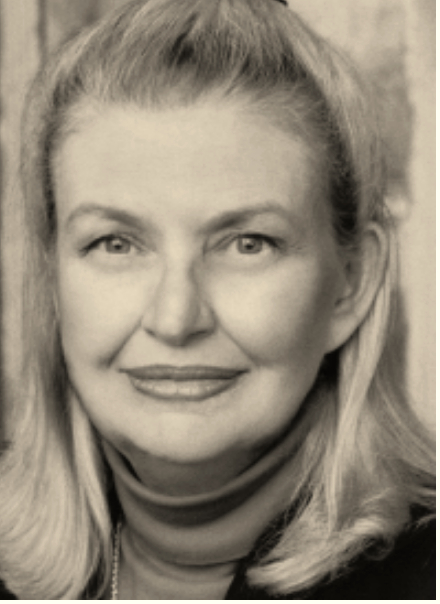
On this date in 1945, scholar and author Susan Jacoby was born in Okemos, Michigan. Her father was a secular Jew of German heritage who converted to Catholicism when Jacoby was a child and her mother was Irish Catholic. She graduated from Michigan State University in 1965 and started her writing career as a Washington Post reporter. Her first book, Moscow Conversations (1972), was based on articles she contributed to the Post from the Soviet Union between 1969-71. She then wrote Wild Justice: The Evolution of Revenge (a 1984 Pulitzer Prize finalist) and The Possible She (1979).
Among the best-known of the prolific Jacoby’s 13 books are Freethinkers: A History of American Secularism (2004) and The Age of American Unreason (2008). The latter was updated in 2018 with the title The Age of American Unreason in a Culture of Lies, which expanded on how the trends she analyzed in 2008 contributed to Donald Trump’s election in 2016.
In Half-Jew: A Daughter’s Search for Her Family’s Buried Past (2000), Jacoby detailed her quest to learn more about her family’s real history. In 2013 she published The Great Agnostic: Robert Ingersoll and American Freethought. Strange Gods: A Secular History of Conversion (2016) explored religious conversion, a topic of particular interest because of her father’s conversion to Catholicism. Her newest book, as of this writing, is Why Baseball Matters (2018), described by Yale University Press as “a love letter to the game and a tough-minded analysis of the current challenges to its special position — in reality and myth — in American culture.”
Jacoby lectures extensively, often on the links between feminism and secularism. Her reviews, articles and essays have appeared in a wide variety of prestigious national publications, including The New York Times, Los Angeles Times and Washington Post. She has been the recipient of numerous grants and awards from institutions such as the National Endowment for the Humanities and the Guggenheim, Rockefeller and Ford foundations. She was the recipient in 2019 of the Richard Dawkins Award from Atheist Alliance International.
She received FFRF’s Freethought Heroine Award in 2004. Her acceptance speech, “How Secularism Became a Dirty Word,” is here.
PHOTO: Courtesy of susanjacoby.com
“I’m an atheist because of, which has made a lot of people an atheist, because of the theodicy problem. The problem of if there is this all good, all powerful, all loving god, you know, how come kids are shot in Newtown? How come people when I was young died of polio, a child I knew? How come?”
“It started me thinking about what every religious thinker has thought about and had to come to grips with, which is how do you account for the problem of evil beside your belief in an all-powerful God? Well, the classic Christian answer, which satisfied Augustine, does not satisfy me or any atheist. Which is that we have free will and we are responsible for all the evil in the world.”
— Jacoby, interviewed on "Moyers & Company" (March 1, 2013)
Ken Follett
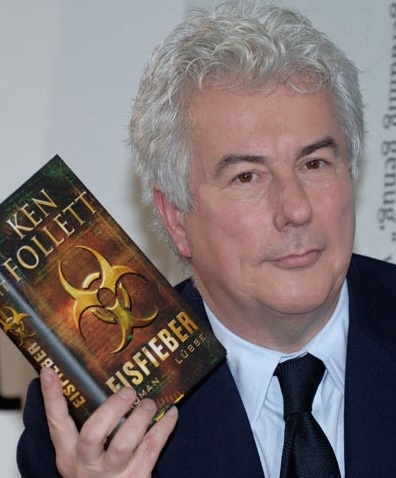
On this date in 1949, prolific author Kenneth Martin Follett was born in Cardiff, Wales, the eldest of four children of Martin and Lavinia Follett, respectively a tax inspector and stay-at-home mother. Follett’s parents and extended family belonged to a Puritan religious group called the Plymouth Brethren. “For us, a church was a bare room with rows of chairs around a central table. Paintings, statues and all forms of decoration were banned,” he remembers.
He was not allowed to watch TV or go to movies, so he found entertainment in books. When he was 10 the family moved to London, where he attended public schools, graduating with honors in philosophy in 1970 from University College. Follett then worked as a reporter with the South Wales Echo and London Evening News and started writing novels in his spare time.
He and Mary Elson had wed in 1968, the same year their son Emanuele was born. Daughter Marie-Claire was born in 1973. His spy novel Eye of the Needle (1978) became a best-seller, as did four others in that genre which were popular with readers in several languages. By then Follett was deputy managing director at Everest Books in London. The Pillars of the Earth (1989), a historical novel about building a cathedral in an English village in the Middle Ages, got rave reviews.
The Times of London once asked readers to rate the “60 greatest novels” of the last 60 years. Pillars placed second after To Kill a Mockingbird. Follett wrote in the preface: “What’s more, I don’t believe in God. I’m not what you would call a spiritual person. According to my agent, my greatest problem as a writer is that I’m not a tortured soul. The last thing anyone would have expected from me was a story about building a church.”
His historical Century Trilogy (2010-14), set in the 20th century, details the lives of five families: American, English, German, Russian and Welsh. His book sales top 130 million copies. He married politician Daphne Barbara Hubbard in 1985. She went on to serve 13 years in Parliament and in Prime Minister Gordon Brown’s administration. In 2010, Follett and 54 other public figures signed an open letter in The Guardian objecting to Pope Benedict XVI’s state visit to the UK.
Photo (cropped) by Blaues Sofa under CC 2.0.
“By the time I applied to college, I had grave doubts about my parents’ religion. I had arguments with my father about theology. Philosophy is, in part, a study of what is a good argument and what is not; what is evidence and what is fake evidence. So, my interest in philosophy stemmed from the agonizing conflict I had over whether or not I believed in my parents’ religion. In the end, I completely rejected it. I’m not a religious person. I’m an atheist. I ended up being the absolute opposite of my parents.”
— Huffington Post interview, Sept. 17, 2014
Sam Simon
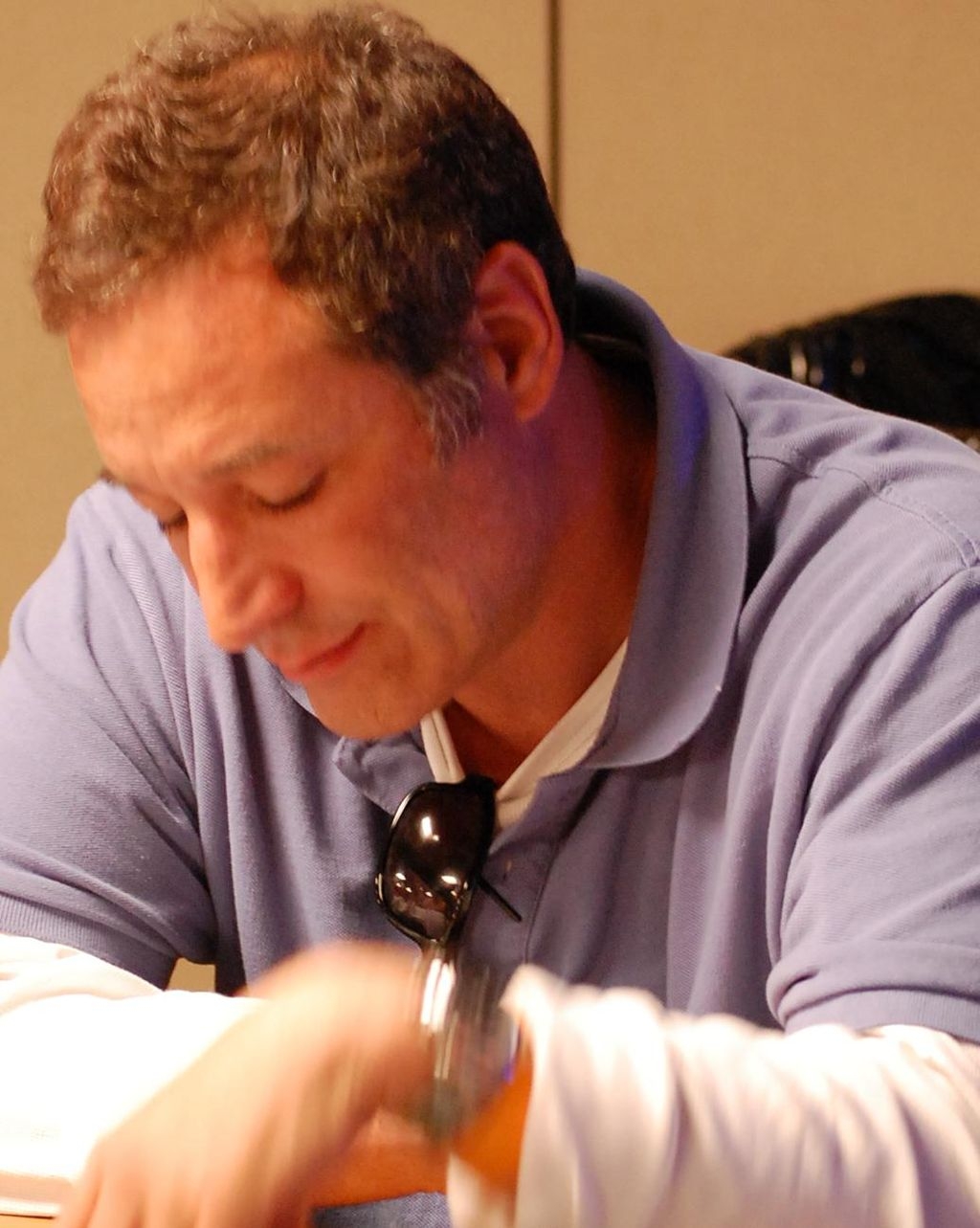
On this date in 1955, atheist philanthropist Samuel Michael “Sam” Simon, most noted as co-creator of the television series “The Simpsons,” was born in Los Angeles. His father, of Estonian Jewish heritage, became wealthy manufacturing affordable clothing. After graduating from Stanford University, Simon worked as a newspaper cartoonist and storyboard artist before contributing in various roles to “The Drew Carey Show,” “Taxi” and “Cheers.” In 1989, Simon developed “The Simpsons” with Matt Groening and James L. Brooks. He left the show in 1993 but not before negotiating a deal in which he received millions from annual show revenues. (As of this writing in 2016, his name still rolls with the credits.)
After a 2012 diagnosis of advanced colorectal cancer, he announced he would donate nearly all his $100 million fortune to various charities, many of which he supported during his lifetime. Twice divorced, he was childless. His bequests included the Sam Simon Foundation (with programs for service dogs for veterans and the hearing impaired), PETA, Save the Children and the Sea Shepherd Conservation Society, a global marine conservation organization. D. March 8, 2015.
Photo (cropped) by Matt Waldron under CC 2.0.
“I’m an atheist, but there’s a thing called tithing that a lot of religions do. Ten percent was the minimum you were supposed to give to charity every year. And I always outdid that.”
“ ‘People say I’m trying to buy my way into heaven, which I don’t believe in. So that can’t be true,’ Sam says. He paid for those atheist billboards that make news from time to time. Like the one by the Lincoln Tunnel, in New York, that read, IT’S A MYTH, on a picture of the stars over Bethlehem.”— Vanity Fair, Sept. 30, 2014
Aram Khachaturian
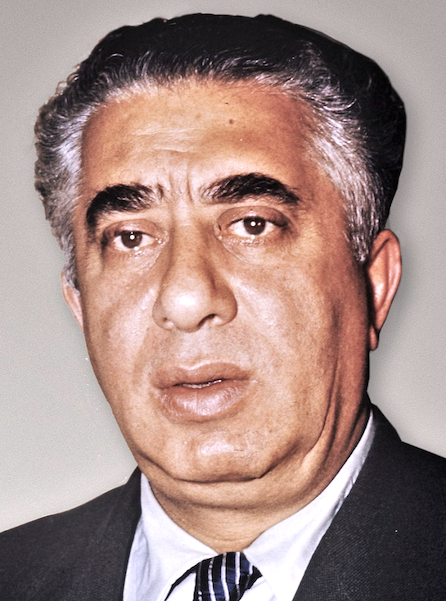
On this date in 1903, composer Aram Ilyich Khachaturian was born in Tiflis (now Tbilisi), the capital of Georgia, the youngest of the five children of Kumash Sarkisovna and Yeghia Khachaturian, both of Armenian descent. His parents were betrothed when his mother was 9 and his father, later a bookbinder, was 19.
Khachaturian, along with Dmitri Shostakovich and Sergei Prokofiev, is generally considered one of the three greatest composers of the Soviet era in Russia and the other republics. He studied at the Gnessin Musical Institute (while simultaneously studying biology at Moscow State University) and became proficient in composition and orchestration at the Moscow Conservatory.
His first major work, the Piano Concerto in D-flat major (1936), popularized his name inside and outside the Soviet Union as did his later concertos for violin and cello. Other significant compositions included the “Masquerade Suite” (1941), the “Anthem of the Armenian SSR” (1944), three symphonies (1935, 1943, 1947) and about 25 film scores.
Khachaturian is known for his ballet music: “Happiness” (1939), “Gayane” (1942), which was his wife’s nickname, and “Spartacus” (1954). “Sabre Dance” from “Gayane” is his best-known work. He married composer Nina Vladimirovna Makarova, a fellow student at the Moscow Conservatory, in 1933. They had a son, Karen, and daughter, Nune.
After 1950 he taught at the Gnessin Institute and the Moscow Conservatory and turned to conducting, traveling throughout Europe, Latin America and the U.S. with concerts of his own music. In 1957 he became secretary of the Union of Soviet Composers, a position he held until his death.
Khachaturian used Armenian and, to a lesser extent, Caucasian, Eastern and Central European and Middle Eastern folk music in his works. He is considered a “national treasure” in Armenia. “Besides his being an atheist, his Armenian descent grated against the patriotism and chauvinism of the Euphratians,” Leo Hamalian wrote in 1980 in “As Others See Us: The Armenian Image in Literature.”
He died just short of his 75th birthday after a long illness, two years after his wife’s death. D. 1978.
I’m an atheist, but I’m a son of the [Armenian] people who were the first to officially adopt Christianity and thus visiting the Vatican was my duty.”
— Khachaturian, when asked about his visit to the Vatican, Solomon Volkov, Novoye Vremya (Aug. 22, 2014)
Alexandra Lúgaro
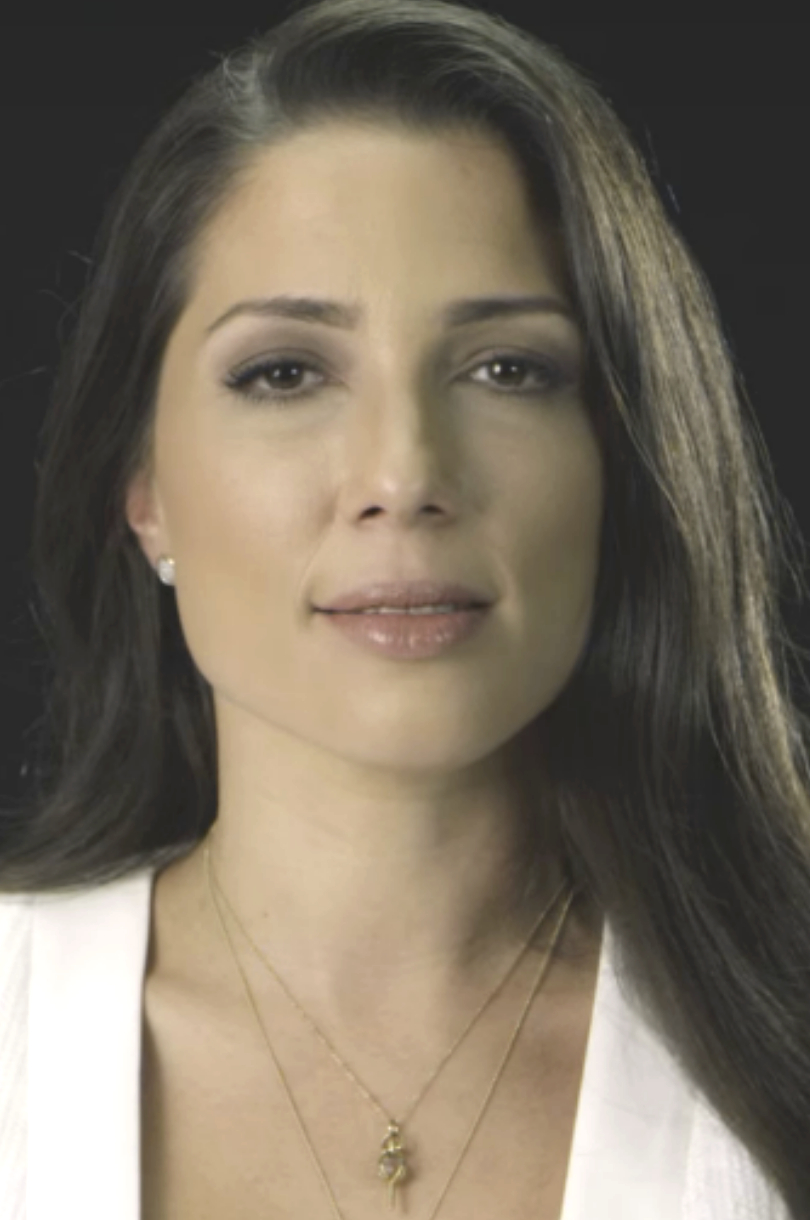
On this date in 1981, Alexandra Lúgaro Aponte — attorney, atheist, businesswoman and political activist — was born in San Juan, Puerto Rico, to América (Aponte) and Luis Lúgaro Figueroa.
After graduating from high school at age 15, she earned a degree in business administration from the University of Puerto Rico, followed by a juris doctorate in 2005. While engaged in her law practice, she received a master of laws (LL.M.) in public and private comparative law in 2014 from Complutense University of Madrid. Its thesis: taxation of income derived from illegal activities in Spain, the U.S. and Puerto Rico.
During that period she was also executive director of the Metropolitan New School of America and América Aponte & Associates — the latter founded by her mother — and president of Im-mortalis Corp. Lúgaro’s work focused on educational consulting for nonprofit and government clients. Her mother’s firm had contracts with the U.S. Department of Education for $46 million in funding for various tutorial programs.
Lúgaro gave birth in 2010 to her daughter Valentina through in-vitro fertilization with an anonymous donor. She married professional photographer Edwin Domínguez in Thailand in 2011 and announced their divorce in 2015.
She entered the political arena in 2015 as the first-ever Independent candidate for governor of Puerto Rico. The office traditionally had gone back and forth between the two major parties. Her platform, based on public education and economic development, supported same-sex unions, reproductive choice and legalization of marijuana for medical, social and economic reasons.
A religious group named PR for the Family condemned the platform after Lúgaro came out as an atheist: “You can’t call yourself a Christian and vote for this candidate,” it said in a December 2015 post. (Primera Hora, Nov. 27, 2016) She won just over 11 percent of the vote. In 2020 she ran as the candidate of the Movimiento Victoria Ciudadana (Citizens’ Victory Movement), finished with 14 percent of the vote and announced her retirement from politics.
After the first election, she had started managing reggaeton singer/rapper William Omar Landrón Rivera, aka Don Omar. He retired in 2019 after selling over 70 million albums. She became executive director in 2021 of the Foundation for Puerto Rico’s Center for Strategic Innovation. Motto: There is no future in rebuilding the past.
“I’m a supporter of our constitution, which enshrines the separation of church and state,” she has said. (Latin Post, April 21, 2015) “This is a principle constantly being criticized. But the separation of church and state, I believe, means there should exist, within a democratic state, a way in which we are all treated equally. The separation of church and state prevents the state from meddling in church affairs. In the same way, the church can impose rules on its members but not the rest of society.”
PHOTO: Lúgaro 2016 campaign photo under CC 4.0.
JOURNALIST: Do you attend any church?
LÚGARO: No, not at the moment.
JOURNALIST: Do you believe in God?
LÚGARO: First of all, I think that it is not relevant to the candidacy and I have always said it because I want people to be clear that I am here to represent Catholics, Protestants, Muslims, Buddhists … I have to ensure that all people are equal before the law. However, if you ask me about my personal quality, I don’t believe in God.— Responding to José Santiago Gabrielini of Nueva Isla online. (Primera Hora, Nov. 27, 2016)
Ingrid Newkirk
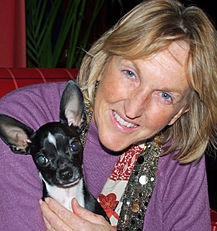
On this date in 1949, animal rights advocate Ingrid E. Newkirk was born in Surrey, England. The family moved to India when she was 7 after her father, a navigational engineer, took a job there. Her mother volunteered at Mother Teresa facilities and Newkirk attended a convent boarding school, where she was the only British student. “I was hit constantly by nuns, starved by nuns. The whole God thing was shoved right down my throat,” she told The New Yorker in April 2003.
The family moved to Florida when she was 18. She met her husband there (they divorced in 1980). Under Newkirk’s leadership in the 1970s as the District of Columbia’s first female poundmaster, the first spay/neuter clinic was started in Washington, along with an animal adoption program and public funding of some veterinary services.
Newkirk and Alex Pacheco co-founded People for the Ethical Treatment of Animals in 1980. National prominence came after Pacheco photographed 17 macaque monkeys being experimented on inside the Institute of Behavioral Research in Silver Spring, Md. That led to the first police raid in the U.S. on an animal research lab and to a 1985 amendment to the Animal Welfare Act.
As the longtime president of PETA, she saw it grow into a Norfolk, Va.-based nonprofit with 300 employees and international affiliates. She has written numerous articles and books, including Save the Animals! 101 Easy Things You Can Do, The Compassionate Cook, One Can Make a Difference and The PETA Practical Guide to Animal Rights.
PHOTO: Newkirk in 1970 with Little Man, photographer David Shankbone’s Chihuahua, CC 3.0.
“I’m an atheist. I don’t believe in God. I believe that the horrors in this world could not ever have been created by a loving God. I believe in kindness, I believe in personal responsibility, and I believe in being decent to people.”
— Newkirk, HBO documentary (Nov. 19, 2007)
Gene Wilder
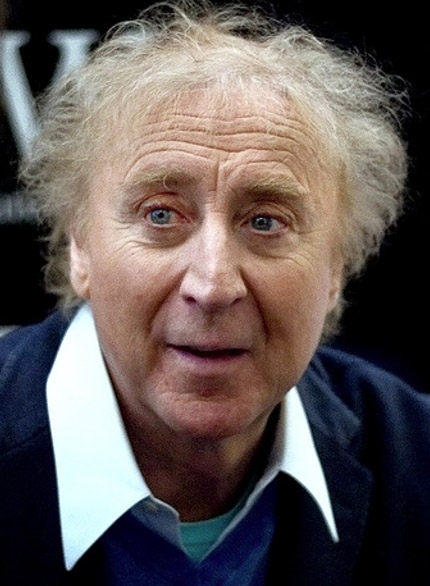
On this date in 1933, actor Gene Wilder (né Jerome Silberman) was born in Milwaukee to Jeanne (Baer) and William Silberman, a Russian-Jewish immigrant. As an adult, Wilder would call himself a “Jewish-Buddhist atheist.” His mother was stricken with rheumatic fever when Wilder was 8 and remained in ill health, which was said to give impetus to his comedic talents as he tried to cheer her up on doctor’s orders. He was involved in local and high school theater and studied communication and theater arts at the University of Iowa and the Stanislavski method in New York City while serving in the U.S. Army. He married Mary Mercier in 1960, the first of four wives.
After several roles on the stage (his stage name came from Gene Gant, the hero of Thomas Wolfe’s Look Homeward Angel, and playwright Thornton Wilder, whose “Our Town” was his favorite play), he made his movie debut in 1967 in “Bonnie and Clyde,” which led to a stellar career in the film industry and iconic, usually eccentric and neurotic roles, often in collaboration with Mel Brooks, in “The Producers,” “Young Frankenstein,” “Blazing Saddles” and “Willy Wonka & the Chocolate Factory.” He later co-starred with Richard Pryor in four movies, the last of which, 1991’s “Another You,” was his final appearance in a feature film.
Wilder also produced and directed movies and wrote screenplays and several books. With oncologist Steven Piver, he wrote Gilda’s Disease (1998), which chronicled his life with his third wife and co-star Gilda Radner, who died in 1989 of ovarian cancer. After marrying speech pathologist Karen Boyer in 1991, he wrote a memoir, Kiss Me Like a Stranger: My Search for Love and Art, a collection of stories titled What Is This Thing Called Love? and three novels. He died of complications from Alzheimer’s on Aug. 29, 2016.
“I’m going to tell you what my religion is. Do unto others as you would have them do unto you. Period. Terminato. Finito. I have no other religion. I feel very Jewish and I feel very grateful to be Jewish. But I don’t believe in God or anything to do with the Jewish religion.”
— "Stars of David: Prominent Jews Talk About Being Jewish," Abigail Pogrebin (Oct. 25, 2005)
Dave Barry
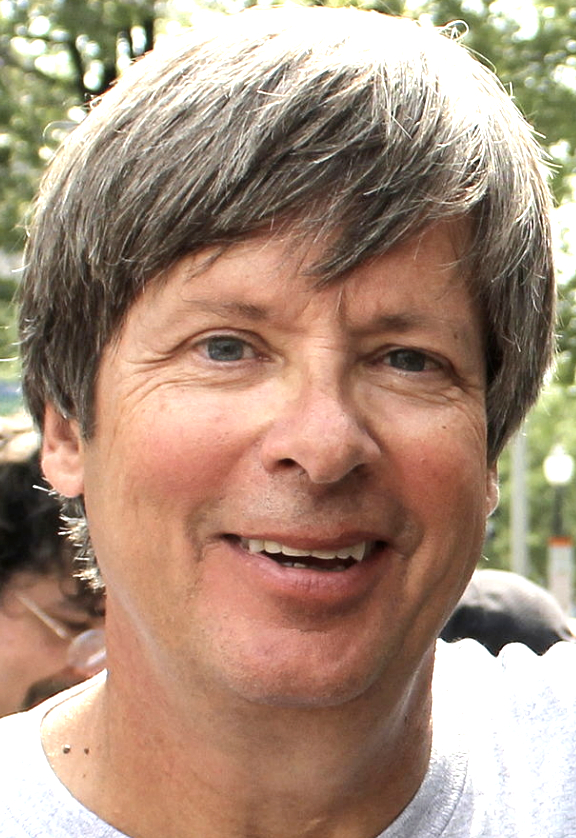
On this date in 1947, author and humorist David McAlister Barry was born in Armonk, N.Y. (home to IBM’s corporate headquarters). His father and grandfather were Presbyterian ministers, but Barry grew up attending an Episcopal church, where he was an altar boy, because Armonk had no Presbyterian congregation.
He recalled his dad as being “more of a social worker than like a pastor.” Barry was raised “sort of religious” but he really wasn’t and called himself an atheist. “It’s okay to believe whatever you believe as long as you don’t think that everyone has to believe it, and if you’re willing to laugh a little bit about your own beliefs, then it’s just going to be easier for everybody to get along with different beliefs.” (Barry, undated video on Big Think web portal)
He had a very happy, stable childhood with “the coolest parents in the world.” At Pleasantville High School, he was voted Class Clown in 1965, then graduated with an English major from Pennsylvania’s Quaker-affiliated Haverford College in 1969, the year he married Lois Ann Shelnut. (Later oft repeated: “Haverford College — Official Motto: No, not Harvard.”) He had two subsequent marriages: to Beth Lenox in 1976 (with a son Robert) and Michelle Kaufman in 1996 (with a daughter Sophie).
Barry worked as a newspaper reporter, editor and columnist until 1975, when he joined Burger Associates, a consulting firm that taught effective business writing. “He spent nearly eight years trying to get various businesspersons to for God’s sake stop writing things like ‘Enclosed please find the enclosed enclosure,’ but he eventually realized that it was hopeless.” (Author bio, davebarry.com)
In 1983 he started an association with the Miami Herald that lasted until 2004. It was there he developed his chops as a widely syndicated humor columnist. He received the 1988 Pulitzer Prize for Commentary “for his consistently effective use of humor as a device for presenting fresh insights into serious concerns.” Other finalists were Molly Ivins, Ira Berkow and Michael Kinsley.
“I always worry when I start thinking my work has to have meaning,” he later wrote. “I don’t write to help people, I write to be funny. Listen, I’d be happy if my column always ran on the comics page, then it would be clear my only goal is entertaining.” (South Florida Sun-Sentinel, Oct. 20, 2001)
His lengthy Year in Review annual columns are reader favorites. From 2021: “The Capitol riot is widely condemned, with much of the blame falling on Trump. He swiftly receives the harshest punishment allowed under the Constitution: He is permanently banned from Twitter, the first sitting president to suffer this fate since Chester A. Arthur.”
One of his most recent books is proof that Barry strives to be silly. “A Field Guide to the Jewish People” (2019), co-written with Alan Zweibel and Adam Mansbach, has an explanatory blurb: “Who they are, where they come from, what to feed them, what they have against foreskins.” He’s published over 40 fiction and nonfiction books, including ones for young adults and children.
From 1993-97, CBS aired the sitcom “Dave’s World” based on his books “Dave Barry Turns 40” and “Dave Barry’s Greatest Hits.” It starred Harry Anderson as Barry and DeLane Matthews as his wife Beth. He identifies politically as a Libertarian and has run several less-than-serious presidential campaigns.
PHOTO: Barry at age 63 in Washington in 2011; Amazur photo under CC 3.0
THE FEDERALIST: You mention that you’re not a believer in God. Are you a Christopher Hitchens-God-is-the-cause-of-all-the-troubles-in-the-world atheist or an agnostic? Do you see any value in religion?
BARRY: I don’t think God is the cause of all the troubles in the world, because I don’t think there’s a God. I think religion causes a lot of problems, although I’ve known a lot of people — my dad, for example — who did a lot of good because of their religious faith.— Interview, The Federalist (April 3, 2014)
Christopher Cameron
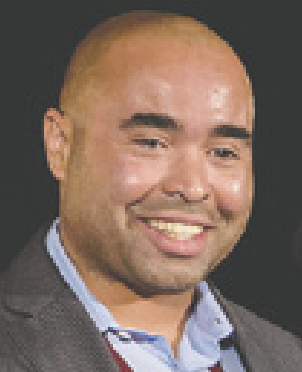
On this date in 1983, historian Christopher Cameron was born on a U.S. Army base in Heidelberg, Germany, where his mother Sylvie Cameron was stationed. The oldest of five children, he grew up primarily in New Hampshire, where his Catholic and French-Canadian family had migrated to in the early 1960s.
What little religious upbringing he had revolved mostly around attending midnight Mass on Christmas Eve or Mass on Easter. That changed soon after he was incarcerated in 2001 on multiple drug charges and he became a born-again Christian, although after release he rarely if ever attended church.
Studying the works of Jiddu Krishnamurti, Daniel Dennett, Richard Dawkins and other philosophers and secular writers during his years in graduate school led to his embrace of atheism. He received his B.A. in history from Keene State College in New Hampshire and his M.A. and Ph.D. in American history from the University of North Carolina at Chapel Hill.
Cameron is a scholar of atheism and freethought more broadly as well as being an atheist. As a professor of history at UNC-Charlotte, he teaches courses on freethought, American intellectual history and African American history. He was the founding president of the African American Intellectual History Society.
He’s the author of “To Plead Our Own Cause: African Americans in Massachusetts and the Making of the Antislavery Movement” (2014) and “Black Freethinkers: A History of African American Secularism” (2019). He co-edited “New Perspectives on the Black Intellectual Tradition” (2018) and “Race, Religion, and Black Lives Matter: Essays on a Moment and a Movement” (2021).
Cameron lives in Charlotte with his wife Shanice, his oldest child Cassidy and his twins Caleb and Callie. His speech to FFRF’s 2021 convention attendees is here.
“Despite views of Blacks as naturally religious, freethought has been a vital and significant component of Black culture and politics since the 19th century.”
— Cameron remarks at FFRF’s national convention in Boston (Nov. 20, 2021). Photo by Ingrid Laas.
Ernst Mayr
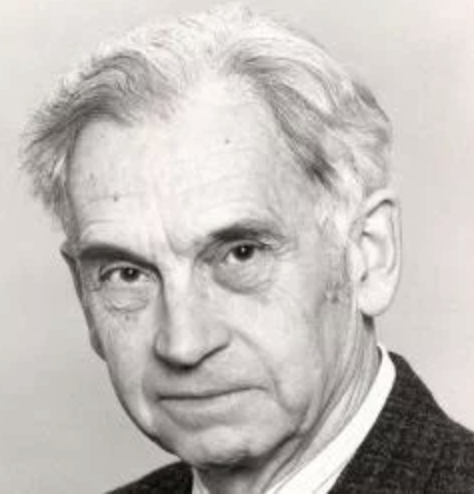
On this date in 1904, evolutionary biologist Ernst Mayr was born in Kempten, Germany. From a young age, he showed an interest in a variety of bird species. Originally studying medical sciences, he changed his mind and received his Ph.D. in ornithology from the University of Berlin. Mayr spent much of his life studying the theory of evolution and eventually established himself as a leading neo-Darwinist. Mayr traveled to New Guinea and the Solomon Islands, where he was able to show that species can arise from isolated populations.
While working in 1942 as a curator at the American Museum of Natural History in New York, he published Systematics and the Origin of Species. During his career, he identified 26 new species of bird and 38 species of orchid. Mayr became a professor at Harvard University in 1953 and led Harvard’s Comparative Zoology Museum from 1961-70. He transformed Darwin’s abstract theories into the science of evolutionary biology and wrote or edited over 600 journal articles and 20 books, well into his 90s, about his experimental and observational studies to support evolution.
He married Margarete Simon in 1935. They had two children and lived together until her death in 1990. Mayr received a number of awards, including the Darwin-Wallace Medal (1958), National Medal of Science for Biological Studies (1969) and the International Prize for Biology (1994). Harvard renamed its Museum of Comparative Zoology Library in his honor in 1995. He died at age 100 in Bedford, Mass. (D. 2005)
“I have the honesty to say I’m an atheist. There is nothing that supports the idea of a personal God.”
— Mayr, Skeptic magazine, Vol. 8 No. 1 (2000)
Pauline McLynn
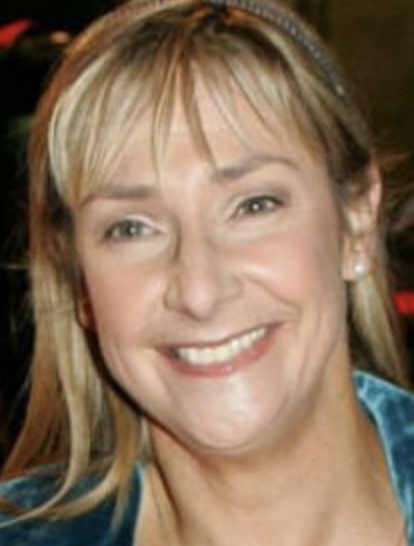
On this date in 1962, actress and author Pauline McLynn was born in Sligo, Ireland, to Padraig and Sheila McLynn. Six months later they moved to Galway, where she grew up and was educated by the Sisters of Mercy (one of the orders operating the infamous Magdalene Laundries) before enrolling at Trinity College-Dublin to study modern English and the history of art.
McLynn pursued an acting career after graduating and performed with all of the major Irish theater companies. She got her television start on RTÉ, Ireland’s public broadcaster, in the sitcom “Nothing to It?” She’s perhaps best-known for playing the housekeeper Mrs. Doyle on the British comedy “Father Ted,” which aired from 1995-98 and followed the misadventures of three Irish Catholic priests. She was featured in 24 episodes of the series “Shameless,” on which the American Showtime series starring William H. Macy is based.
McLynn won the British Comedy Award for “Top TV Comedy Actress” in 1996 for “Father Ted” and the 2007 Irish Film and Television Award for “Best Actress in a Lead Role in a Feature Film” for the movie “Gypo.” She’s had numerous other TV series and movie roles, including Aunt Aggie in the 1999 film “Angela’s Ashes.” Most recently as of this writing, she played Bunni in 52 episodes of “Drop Dead Weird” on the Australian Seven Network.
Married to theatrical agent Richard Cook since 1997, she has written 10 novels, the first three featuring private detective Leo Street, several short stories and a chapter of Yeats Is Dead, the serial novel by 15 Irish writers, including Frank McCourt.
In the three-part BBC miniseries “Pilgrimage: The Road to Istanbul” (2020), seven celebrities travel from Serbia to Turkey to promote tolerance for all beliefs and cultures. “I was christened a Catholic but I’m a secular person,” McLynn explained on the show, rejecting the notion that religious people have a monopoly on kindness and decency just because of their belief in God. “All of the talking about ‘Well, I like to be kind and everything,’ yeah, I do as well, but I just think that’s being a decent human being.”
“I was brought up an Irish Catholic at a time when the church and the state were so entwined in Ireland that you just didn’t get a choice. It was more a habit than a religion to the point where I realized I wasn’t practicing or anything anymore, it just meant so little that I didn’t even miss it. I’m an atheist.”
— McLynn, quoted in the Irish Mirror (March 22, 2020)
Alfred “Dilly” Knox
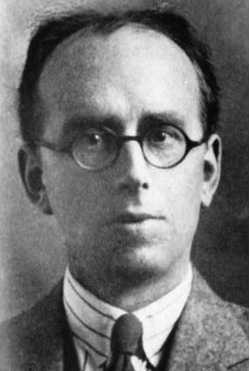
On this date in 1884, classics scholar and cryptographer Alfred Dillwyn “Dilly” Knox was born in Oxford, England, to Edmund Knox, an Anglican cleric and future bishop of Manchester, and Ellen (French) Knox. She died when Knox was 8. The fourth of six children, Knox was educated at Eton College and King’s College-Cambridge, where he studied classics and papyrology and was friends with Lytton Strachey and John Maynard Keynes.
When World War I broke out, he was recruited by the Royal Navy to work in its cryptology unit, which broke the code for the German “Zimmermann Note” to Mexico that helped bring the U.S. into the war. After the armistice, he completed deciphering the work of 3rd-century BCE Greek poet Herodas from papyrus fragments. He married Olive Roddam, his former secretary, in 1920. They had two sons.
He also resumed his codebreaking work, and at the start of World War II was senior cryptographer at the Government Code and Cypher School at Bletchley Park. He believed women had a greater aptitude for the work and more attention to detail than men, and thus his staff included a coterie dubbed “Dilly’s fillies.” It was here he worked with project director Alan Turing on refinement of Turing’s “bombe” device that would be instrumental in breaking encoded German “Enigma” messages and help doom the Third Reich.
Knox did not live to fully see the fruits of his labor, dying of lymphoma at age 58 after working from home for an extended period due to his illness. He received the Most Distinguished Order of Saint Michael and Saint George for extraordinary service to the commonwealth. (D. 1943)
At King’s College, Knox became the only confirmed atheist in his family. “According to his niece [biographer Penelope Fitzgerald], Dilly became convinced that Christianity was a two-thousand-year-old swindle eliciting false fears and hopes in believers.”
— The American Scholar, Vol. 69, No. 4 (Autumn 2000), pp. 140-42
Michael Terence Wogan
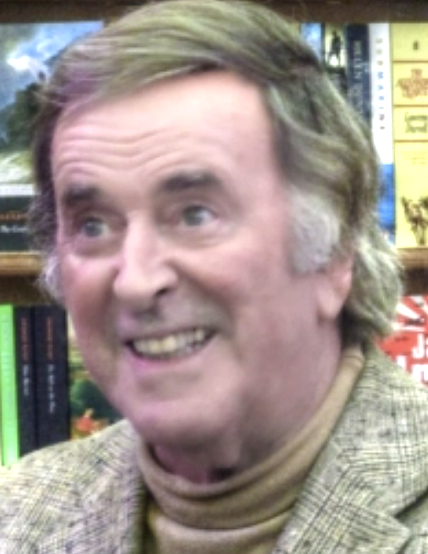
On this date in 1938, Michael Terence “Terry” Wogan was born in Limerick, Ireland. When he retired from his BBC Radio morning program “Wake Up to Wogan” in 2009, he had about 8 million listeners, making it the most popular radio broadcast in Europe. He had started his career in 1963 with Radio Éireann, the Irish national broadcaster. He was educated by Salesian nuns in primary school and later at Crescent College and Belvedere College, both Jesuit schools.
In 1966, when his daughter Vanessa died at 3 weeks of age, his wife sought refuge in Catholicism but the tragedy cemented his nonbelief, Wogan said in 2005. He called losing his faith at age 17 a relief. Interviewed by New Internationalist magazine on Aug. 1, 2004, he said, “There were hundreds of churches, all these missionaries breathing fire and brimstone, telling you how easy it was to sin, how you’d be in hell. We were brainwashed into believing.”
Wogan branched out from strictly radio work to television game and interview shows. He was also the voice of the Eurovision Song Contest for many years and was involved with and hosted the Children in Need telethon since its inception in 1980. He acquired dual British citizenship in 2005, the same year he was knighted. “There was no one better at being a friend behind the microphone than Sir Terry,” said fellow broadcaster Simon Mayo. Wogan said the two most important attributes a person could have were kindness and family. He and his wife Helen Joyce had four children. He also wrote a column in The Sunday Telegraph for many years and wrote several books, including the autobiographies Is It Me? and Mustn’t Grumble.
When he died of cancer at age 77, The Telegraph’s obituary said he was “the most popular and best-loved broadcaster in Britain for more than three decades, confecting a middlebrow, old-fashioned brand of gentle Irish whimsy that barely concealed his forthright and often antagonistic views about the BBC and the people who run it.” (D. 2016)
PHOTO: Wogan at the 2015 Cheltenham Literature Festival; Julie Anne Johnson photo under CC 2.0.
“I’m afraid I don’t believe in God. My mother was devout and so is my wife. But I have the intellectual arrogance that makes it very hard to believe in him. I don’t have the gift of faith. I remember at school I used to make up sins at confession. What we were told were sins by priests were not sins at all.”
— The Sunday Independent (May 8, 2005)
Walter Plywaski
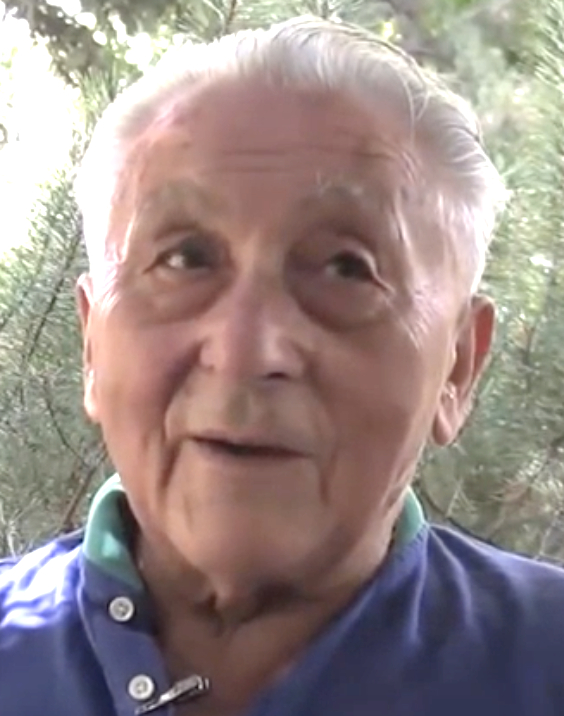
On this date in 1929, atheist Walter Plywaski (né Wladyslaw Plywacki), who won a landmark court case on religious oaths, was born in Łódź, Poland, to Regina and Maksimilian Plywacki. The family lived above the pharmacy his parents operated. His father, a socialist and former cavalry officer, was a religious agnostic of Jewish descent. His mother was raised in Orthodox Judaism.
Religion was not a significant influence in his upbringing, Plywaski said, recalling theological discussions with his father. “He wanted me to be a debater, so I read theologians like St. Augustine and Pascal to sharpen my skills.” (Intermountain Jewish News, Jan. 6, 2011)
The family’s world fell apart in 1939 when Germany invaded and forced Jews and persons of Roma descent into a ghetto in Łódź. They arrived in a railroad freight car at Auschwitz-Birkenau on Plywaski’s 15th birthday in 1944. His mother soon ended up in a line leading to the gas chamber. He would see his father beaten to death by a Nazi camp commander. He later said Auschwitz turned him into an atheist (see quote below).
Prisoners were moved from camp to camp as it became clear to the Germans that the war was lost. One extermination method was to lock barracks doors or nail them shut, douse buildings with fuel and set them afire. In 1945 Plywaski was among over 30,000 liberated by U.S. troops from Dachau.
He worked as an interpreter for the Americans and emigrated to the U.S. in 1947. He served four years in the U.S. Air Force before completing a degree in electrical engineering at Oregon State University, then worked for 18 years for the National Oceanic and Atmospheric Administration and for defense contractors before starting an electronics design company.
His petition for U.S. citizenship while living in Hawaii in 1952 was denied by a judge after Plywaski told him that as an atheist he could not end the oath with “so help me God” and requested an alternative affirmation. The judge refused. Plywaski moved to Oregon, and with the help of the American Civil Liberties Union, prevailed in court in 1955 and was granted citizenship.
Before divorcing, he and his wife had three daughters: Cybele, Ariel and Gabriella. His Boulder, Colorado, home was destroyed by wildfire in 2010, a loss he accepted. “I have lost more before. It’s almost like water off a duck’s back when you compare it to the Holocaust.”
Plywaski, who spoke six languages, was actively involved with Boulder Atheists along with speaking to students in elementary and secondary schools and colleges about the Holocaust. Before the 2020 election, he appeared in a No Bystanders video that got 2.2 million views about the importance of voting against hatred and fear.
He died at age 91 at Sunrise Senior Living in Boulder. (D. 2021)
“I’m an atheist. Once in Auschwitz, we were on lockdown in the barracks. And we hear high-pitched screams coming from somewhere outside. The Kapo comes in and tells us that the Nazis are burning children seven and under alive. Whether that was true or not, I cannot say. But I accepted it as truth. So for me, the voice of G-d at Auschwitz was the scream of a burning child.”
— Interview, Intermountain Jewish News (Jan. 6, 2011)
George Soros

On this date in 1930, George Soros (né György Schwartz), entrepreneur, philanthropist and social activist, was born to upper-middle-class, nonobservant Jewish parents in Budapest, Hungary. The family changed its surname to Soros in 1936 because Jews were being persecuted. He lived through the Nazi occupation that resulted in the murder of over 500,000 Hungarian Jews and posed as a teen as Christian to escape detection.
After the establishment of a communist government under Soviet hegemony after World War II, he fled to England in 1947 to attend the London School of Economics, where he earned bachelor’s and advanced degrees in philosophy.
He worked for a merchant bank in London before emigrating in 1956 to New York City, where he began working in finance and investment and securities analysis. He developed the theory of reflexivity, which posits that market values are driven by the fallible ideas of participants as well as economic fundamentals. He launched the Soros Fund Management in 1970, a hedge fund that eventually made him a multi-billionaire.
He started the Open Society Foundations in 1979, supporting democracy, human rights and economic development in over 120 countries. In 2017 he announced he had transferred $18 billion of his fortune into an endowment to fund future work of the Foundations, bringing his total giving to the Foundations since 1984 to over $32 billion. He has also heavily supported liberal and progressive causes and political candidates, making him a convenient target for conservatives and the Religious Right.
Soros has written 14 books, including Underwriting Democracy (1991), The Bubble of American Supremacy: Correcting the Misuse of American Power (2004), The Crash of 2008 and What it Means (2009) and The Tragedy of the European Union: Disintegration or Revival? (2014). Soros was twice divorced with five children when he married Tamiko Bolton in 2013, a Japanese-American businesswoman 42 years his junior.
Among the FAQs (frequently asked questions) on his website is “What faith is George Soros?” It’s answered like this: “He identifies himself as an atheist.” About his views on religion: Soros “respects all faiths and religious practices. He believes that people of faith and faith communities contribute to the public’s understanding of pressing social issues and often add a principled, moral aspect to debates that are too often dominated by politicians, statistics and polling.”
PHOTO: Soros in 2011 in Munich, Germany; Harald Dettenborn photo.
STEVE KROFT: Are you religious?
GEORGE SOROS: No.
KROFT: Do you believe in God?
SOROS: No.— Interview on CBS “60 Minutes” (Dec. 20, 1998)
Margaret Downey
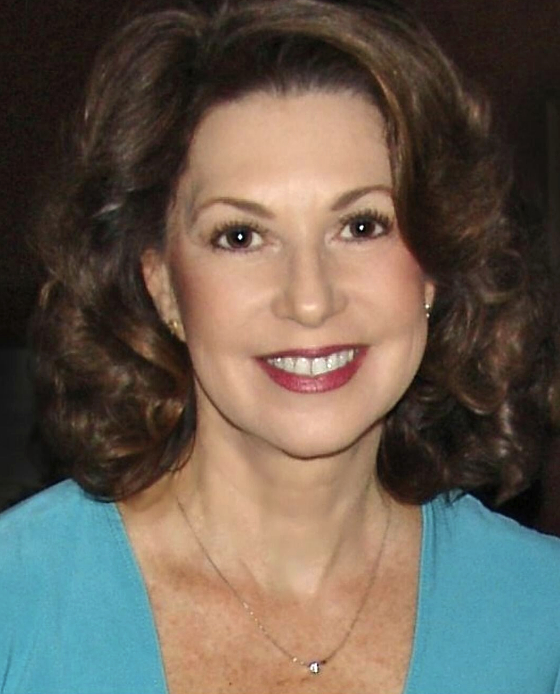
On this date in 1950, secular activist Margaret Downey was born in Baton Rouge, La., where she lived until 1957. She was raised primarily by her mother, a Puerto Rican immigrant, after her father of Irish descent left the family when she was 3. She witnessed the racial prejudice inflicted on her mother and her half-sister, a person of color, who had come to live with them.
The family struggled financially and by age 10, Downey was sewing and cleaning houses to make money. By age 15, she had come to identify as an atheist. College was out of the question and she saw only marriage in her future. Pregnant at 17, she married and divorced a man of Mexican heritage by age 21. “My first marriage, to a Catholic man, dissolved when we disagreed on such questions as the baptism of our infant daughter,” Downey said. (“Parenting Beyond Belief: On Raising Ethical, Caring Kids Without Religion,” ed. Dale McGowan, 2007)
“I married again three years later, this time to someone who did not attend church or believe in God. He was kind, honest, reliable, and a terrific father. I was glad to have another child with Tom [Schottmiller] as my loving husband. Matthew was born when my daughter Holly was 9 years old.” (Ibid.) Matt went unbaptized. “Tom’s parents were not religious, and they never went to church. My mother and many others from my side of the family had given up their religious beliefs by then as well.”
Downey’s workplace efforts promoting equality for women (pay, promotional opportunities, fairness in dress codes) often landed her in trouble with employers. Due to her husband’s promotions that led to frequent moves, she stopped and started an interior design business five times.
She founded the Freethought Society of Greater Philadelphia in 1993, then continued her activism by starting the Anti-Discrimination Support Network to combat discrimination against the atheist community. In 1991 she filed a discrimination case against the Boy Scouts of America in Pennsylvania for rejecting her nonreligious son’s application after he’d been a New Jersey Scout previously. The Freethought Society under her leadership formed the Thomas Paine Foundation in 1994 to conduct programs promoting the ideals of Paine’s freethought philosophy. She was named the first president of the newly formed Thomas Paine Memorial Association in 2021.
She has represented the nontheist community since 1995 at several United Nations conferences and is a past board member of the American Humanist Association and the Humanist Institute, as well as a past president of Atheist Alliance International and Reason Rally board member. Downey became a certified Secular Officiant in 2001 and operates Secular Celebrations to serve nontheists’ life celebration needs.
She also serves as an adviser for the Robert Green Ingersoll Birthplace Museum in Dresden, N.Y. Downey’s one-woman play about Ingersoll and his wife Eva Parker Ingersoll was performed at the 25th anniversary celebration of the reopening of the museum. The setting is five years after Robert’s death. Eva reflects on their lives together and invites all her guests (the audience) to dinner.
Along with her essay in “Parenting Beyond Belief,” she has been published in “50 Voices of Disbelief: Why We Are Atheists” (2009) and in Chris Johnson’s 2014 book “A Better Life: 100 Atheists Speak Out on Joy & Meaning in a World Without God.”
After being a co-plaintiff in a federal lawsuit to remove a Ten Commandments plaque from the facade of a courthouse in West Chester, Pa., Downey led the effort in 2007 to place the Tree of Knowledge (a godless holiday tree) at the courthouse to counter religious displays. The tree, decorated with facsimiles of covers of books about atheism, religious skepticism and secular philosophy, is installed annually. “This helps to balance and shows the diversity of the community,” Downey said. “We want people to read these kinds of books so they can make up their minds about religion, not just be spoon-fed by pastors and priests and rabbis.” (Philadelphia Inquirer, Dec. 10, 2008)
Downey isn’t all serious business: “I’m the only Friggatriskaidekaphobia Treatment Center nurse in the world teaching critical thinking skills in a fun way every Friday the 13th.” She also organizes a parade entry every year at Dragon Con in Atlanta at which about 50 costume-clad skeptics parade past tens of thousands of viewers.
“Religion, after all, is based on superstitious nonsense, and people sitting in church pews praying to a god are no different from people sitting in a circle conducting a séance.”
— From Downey's essay "My 'Bye Bull' Story" in "50 Voices of Disbelief: Why We Are Atheists" (eds. Russell Blackford and Udo Schuklenk, 2009)
Shirley Manson
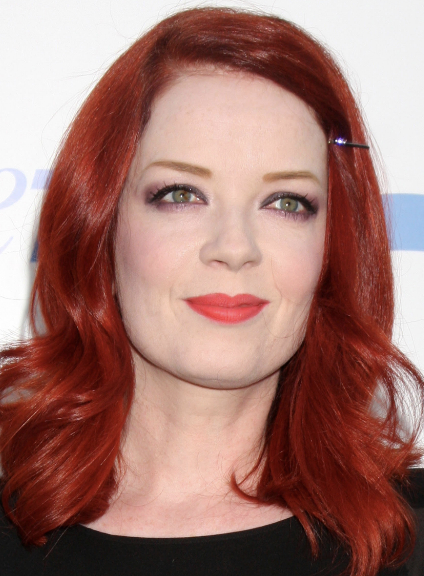
On this date in 1966, musician-songwriter Shirley Ann Manson was born in Edinburgh, Scotland, to big band singer Muriel (MacKay) and John Manson, a university lecturer. Manson started her music education in primary school with lessons for piano, recorder, clarinet and violin. She took part in amateur dramatic and musical performances in secondary (high) school.
Bullied and suffering from depression as a teen, she rebelled and started skipping school. She worked for several years in the retail sector and as a waitress while singing with local groups. Manson sang backing vocals and played keyboards for the band Goodbye Mr Mackenzie and then recorded albums with the group’s side project performing as Angelfish.
Drummer and co-producer Butch Vig of the alternative rock band Garbage was impressed with her musical abilities and stage presence and invited her to join the band. The 1995 debut album “Garbage” sold 4 million copies and was followed by five studio albums, with Manson assuming most of the songwriting duties. The first four albums were recorded at Smart Studios in Madison, Wis. (also FFRF’s home turf). Garbage toured worldwide and sold 12 million records over 10 years.
In 2009 she announced she was stepping away from music but the hiatus was brief. She performed with The Pretenders, Iggy Pop, Incubus and Kings of Leon, Gwen Stefani and No Doubt. Manson and Garbage reunited to record the albums “Not Your Kind of People” and “Strange Little Birds” in 2012 and 2016. A 2019 Irish Times story (“Garbage in Dublin: Manson emerges on stage, an absolute badass”) reviewed her contralto voice as “note-perfect” 24 years after joining Garbage.
In July 2019 she was announced as the host of the new seven-episode podcast “The Jump” featuring conversations with musicians about “the moments in an artist’s career where they decide to take a leap into something new, and after that, nothing is the same.”
Manson was married to Scottish artist Eddie Farrell from 1996 to 2003. She married record producer and Garbage sound engineer Billy Bush in Los Angeles in 2010. She has been actively involved in several charitable endeavors, including raising money for HIV-AIDS and children’s cancer research, Haiti hurricane relief efforts and People for the Ethical Treatment of Animals.
She told Rolling Stone magazine in 1998 that she’s an atheist: “The perverse thing about my spiritual growth as a child was that my father was my Sunday school teacher. We grew up very much under Scottish Presbyterian schooling. I went to church every Sunday and when I was about 12, I had a huge fight with my father over the dinner table. I’m screaming at him that religion’s a sham, it’s crazy and I’m not going to church anymore, it’s just bullshit.”
Photo: Manson in 2010 at PETA’s 30th anniversary gala at the Hollywood Palladium. Image via Shutterstock by Kathy Hutchins.
ROLLING STONE: Do you believe in God?
MANSON: No, not at all.— Manson interview with Rolling Stone magazine (September 1998)
Bob Carter
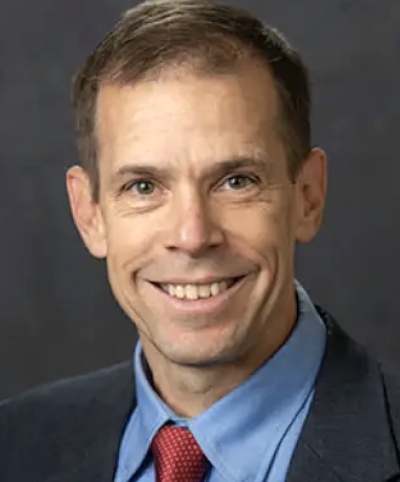
On this date in 1965, future state legislator Bob Carter was born in Great Falls, Montana, where he grew up working on area farms and ranches during high school and college. He was baptized Episcopalian and was raised in a Catholic household. After high school, he enrolled at the University of Montana, earned a B.S. in computer science with minors in math and media arts with an emphasis in accounting and worked in the Silicon Valley in software development and as chief information officer (I.T. manager) for several leasing and finance-related companies.
Carter and his wife Laurie then moved to Montana to raise a family. They have three sons — Nick, Max and Ben — and as licensed foster parents have cared for as many as seven children in their home, ranging in age from 4 to 16. “When we decided to have kids, I volunteered for the job as primary caregiver, choosing to be a stay-at-home dad while still volunteering for a multitude of nonprofit, childhood and education-related causes in the Missoula area,” Carter said on his campaign website.
“In college I had a Jewish friend who cast doubt on all of Christianity,” Carter said in an email shortly after being named FFRF Action Fund’s Secularist of the Week in November 2024. “Not long after that I concluded that maybe all religions were wrong. From a young age I was a fan of Charles Darwin and Richard Dawkins, and that broadened my perspective even further. I remember thinking, ‘If God is able to create an entire universe, and is credited with healing all kinds of sicknesses, cancers and tumors, why has she never healed an amputee? Does God not like amputees? Do amputees not pray hard enough to be healed?’ ”
He threw his hat in the legislative ring as a Democrat in red-state Montana in 2022 after serving four terms on the Missoula School Board and won a seat in the state House. He was reelected in 2024 by a margin of 22 points. Former president Donald Trump won Montana by 20 points in 2024.
On his campaign site, Carter lists nearly three dozen groups he supports, volunteers for or is active with in some capacity, including FFRF and the Missoula Area Secular Society. On Ballotpedia in 2022, he named women’s reproductive rights and public education as the issues he’s most passionate about and climate change as the biggest challenge facing Montana. “If I had to choose the one thing that I felt would be most important for the future of humanity, it would be the progressive, science-based education of our children.” (The Humanist, March 20, 2023)
Carter said in his email to FFRF that he knows and respects that religious beliefs are important to many people: “In fact, I volunteer to support of all kinds of beliefs like Native American ceremonies, churches, mosques and temples. That said, I am against indoctrinating children. I am a proponent (and product) of our public education system. I feel strongly that a child’s education needs to be secular and not based on whatever theology happens to be popular at the time. The knowledge, values and actions that we pass on to future generations need to be independent of any religious authority.”
“So many of my colleagues wear their religion on their sleeve and claim religion is what gives society its morals. I want them to know that here I am, an atheist and humanist, who does not believe in the supernatural. My question is: As a nonbeliever, where do I get my morals from? Maybe kindness and compassion are simply human traits just because they are the right thing to do.”
— Carter, answering why it's important to him to be open about his nonreligious identity. (The Humanist, March 20, 2023)
Mandisa Thomas
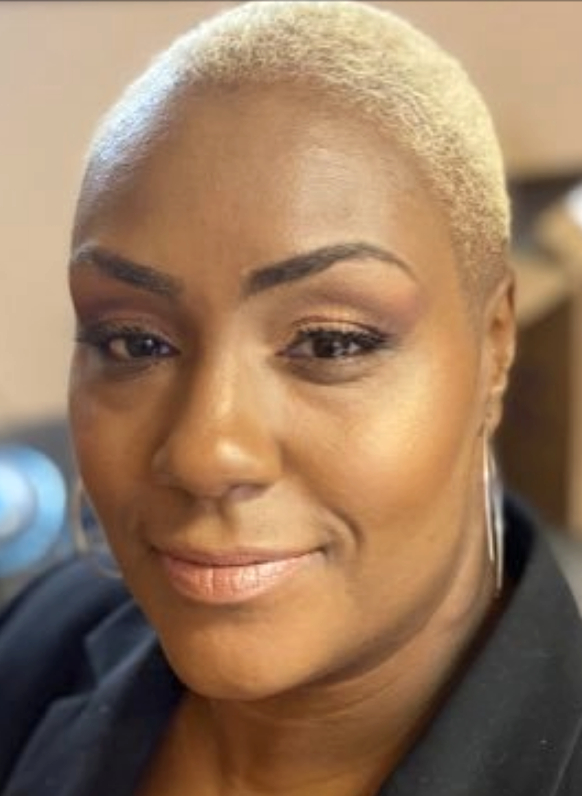
On this date in 1976, secular activist and atheist Mandisa Lateefah Thomas, née Dixon, was born in New York City. She was raised in a black nationalist household that wasn’t religious, although some extended family members were and she sang in church choirs.
“I was exposed to Christianity, Islam and different forms of supernaturalism that is rampant in our community,” she told Secular Woman in a 2013 interview. Mulling in her early teens what she believed, “I thought maybe I was ‘spiritual but not religious’ because I knew how Christianity was forced on blacks.” Before long she ended up firmly in the atheist camp.
After moving in 1997 to Atlanta, she worked for several companies, including the Centers for Disease Control (CDC), where she stayed until 2018. In 2011 she co-founded Black Nonbelievers of Atlanta, with “Atlanta” later dropped after a decision to expand the organization. In 2013 she was one of the principal organizers for the Blackout Secular Rally that celebrated and featured atheists and nonbelievers of color and was held at Flushing Meadows Park in Queens, N.Y.
After leaving the CDC, she started working full-time as an activist. As president of Black Nonbelievers Inc., Thomas urged people to “come out and stand strong with their nonbelief. … The more we make our presence known, the better our chances of working together to turn around some of the disparities we face. We are not alone.”
As of this writing, Thomas serves on the board for American Atheists and is board nominating committee chair for the American Humanist Association. She previously held board positions with the Foundation Beyond Belief, the Secular Coalition for America and the 2016 Reason Rally Coalition. She was named the Unitarian Universalist Humanist Association’s 2018 Person of the Year and as a Freethought Heroine in 2019 by FFRF.
She regularly presents at conferences nationwide and has appeared on major media such as “CBS Sunday Morning” and CNN and has been featured in JET, Playboy and The Humanist magazines and other print and online media, including FFRF’s “Freethought Matters.” Thomas and her husband Craig, who is also an atheist, were married in 2006 and live in the Atlanta area. They have three children.
“It once felt weird to identify as atheist, but I had to be honest with myself: At the end of the day I don’t believe in any gods at all.”
— Thomas interview, SecularWoman.org (July 19, 2013)
Carter Warden
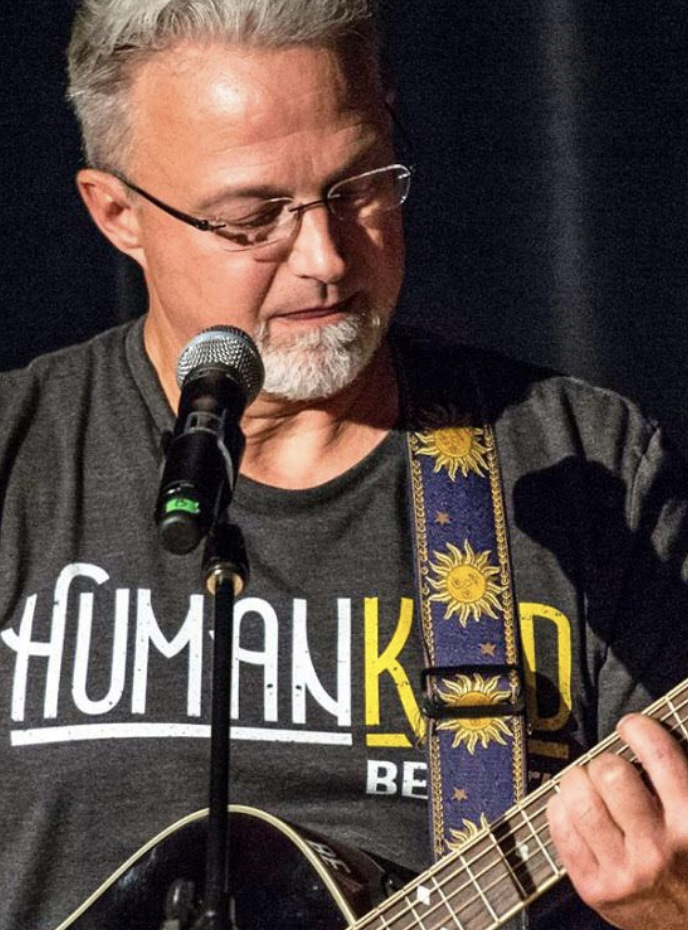
On this date in 1963, Carter Warden was born in Melbourne, Florida. A pastor for 25 years for conservative Protestant congregations, he co-founded the Clergy Project in 2011, was one of its first forum moderators and is now openly atheist. Using the pseudonym “Adam Mann,” he was one of the five interviewees in the Tufts University study by Daniel C. Dennett and Linda LaScola published in 2010 as “Preachers Who Are Not Believers” in the journal Evolutionary Psychology.
While still in ministry he was interviewed in 2010 with his identity veiled on “ABC World News Tonight,” where he said, “In that point where I realized I was losing my faith yet I still feared for my own salvation, I asked God to take my life before I lost my faith.” Later on after a lot of books, movies, classes and conversations, his thinking had changed: “Instead of deepening my once precious faith, my intense study left me no choice but to abandon it. I did not lose my faith, as though it was something that regrettably slipped away, rather I chose to discard it because it no longer made sense.”
Not until FFRF’s 2016 national convention would he “come out” publicly. (Speech video is here and a transcript is here.) He told the audience, “My true voice has been suppressed and silenced and, as a result, I have been living a life of secrecy, duplicity and hypocrisy. But that stops today.” Eight years of Adam Mann were enough.
Warden’s early religious upbringing in east Tennessee was United Methodist. As a young adult he transitioned to the Christian Church/Church of Christ. After earning an associate’s degree, he worked as an automotive technician for several years. He then graduated from Milligan College in Tennessee with a major in bible and a minor in sociology. He was ordained in 1988 and graduated from the Emmanuel School of Religion (now Emmanuel Christian Seminary) in 1998.
As of this writing in 2025, he lives in Johnson City, Tenn., works as a university administrator in student affairs and is a member of the Secular Student Alliance’s speakers bureau. His story was featured in a 2022 off-Broadway play by playwright Marin Gazzaniga titled “The Unbelieving.” It’s based on interviews conducted for the book “Caught in the Pulpit“ by Dennett and LaScola.
Warden has recorded several secular songs, including “Freedom From Religion” (listen or download here), with all proceeds going to the Clergy Project. An avid scuba diver, he has two children and two grandsons.
“I learned that I am not alone. I learned that reason and science are the best tools for people to discover truth, freedom, happiness and purpose for this life. I learned that goodness and morality do not come from a god. Goodness, morality, happiness, compassion, love, selfless sacrifice and the desire to make this world a better place can be found within each of us as we accept our role as one of the most privileged species on Earth.”
— Warden, on what he's learned from the secular community, FFRF national convention speech (Oct. 7, 2016)
Daniel Sloss

On this date in 1990, comedian Daniel Sloss was born in London, the eldest of four children of Ph.D. chemist Lesley — an international consultant on carbon emissions and climate change — and Martyn Sloss. His father works in I.T. The family moved to Scotland, where its roots are, when he was 4 and underwent the tragic loss of his sister Josie to cerebral palsy when she was 7.
Sloss got his comedic start at age 16 writing jokes for satirist Frankie Boyle. His desire to pursue comedy won out over studying history at the University of Dundee. He debuted onstage in 2008 at the Edinburgh Fringe — the world’s largest arts festival — and in 2009 became the youngest comic to perform a solo season at London’s Soho Theatre.
Numerous TV and solo stand-up shows followed, including his U.S. debut on “Conan” in 2013. As of this writing, Sloss has performed in over 50 countries and his streamed shows have been seen in 190 nations. The COVID pandemic shut down his 11th solo show “Daniel Sloss: HUBRIS,” which premiered in New York and was rescheduled to 2021-22.
Sloss and fiancée Kara Mitchell announced their engagement in August 2021 but said the wedding wouldn’t take place until 2023 in hopes that the pandemic would be over and friends from everywhere could attend. “I want them to experience a traditional Scottish wedding with kilts and a ceilidh. I don’t want restrictions,” Sloss said.
His book “Everyone You Hate Is Going to Die: And Other Comforting Thoughts on Family, Friends, Sex, Love, and More Things That Ruin Your Life” was published in October 2021.
Some Sloss humor: “I think one of the hardest things about being a parent is Christmas morning, when you’ve spent all this time, money and effort making this day so magical. And then you look down at your child with those beautiful blue eyes that you hope resemble yours. And they spend the whole day thanking Santa. You know that disappointment that parents feel in that moment — that’s exactly how doctors feel whenever you thank God.” (Melbourne International Comedy Festival, March 2016)
Sloss says his riffs on religion aren’t meant to offend but sometimes they do. “I did an atheist joke in Indianapolis. I was kind of warned against it. They said, ‘Maybe don’t do that joke here.’ I said, ‘Nah, it’ll be fine.’ It was not fine.” One man showed Sloss his gun and about 40 people in the crowd of 100 walked out. (Canton Repository, Feb. 12, 2015)
“I’m an atheist, but was raised in a partially religious family. So I’ve always been allowed to make fun of religion, knowing full well that no one would ever take it personally. They’re just jokes. But when you fight faith with logic, people tend to get angry because they don’t have the logic to back up their faith and they feel personally attacked by it.”
— Interview, Bristol24/7 magazine (Nov. 8, 2016)
Avijit Roy
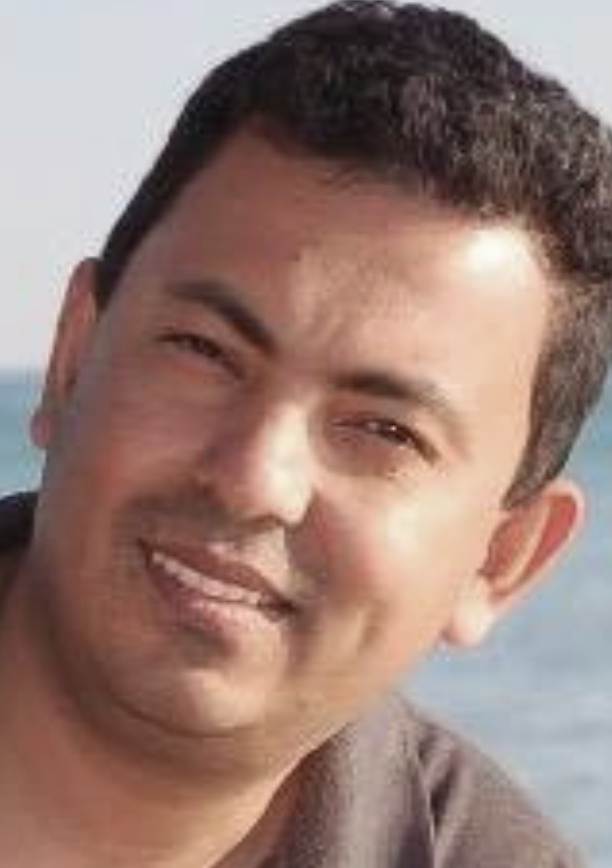
On this date in 1972, Avijit Roy, author, atheist/social activist and martyr to the secular cause, was born in Bangladesh to Ajoy and Shefali Roy. Ajoy, his father, was a physics professor at the University of Dhaka. Avijit Roy earned a bachelor’s degree in mechanical engineering from the Bangladesh University of Engineering and Technology and a master’s and doctorate in biomedical engineering from the National University of Singapore. While working in his field, Roy in 2001 started a Yahoo group named Mukto-Mona (Free Mind) for Bangladeshi secularists, rationalists and atheists to discuss issues related to human rights, secularism, humanism and the impact of religious doctrines — especially Islam and Hinduism — on politics in South Asia. Mukto-Mona was born as an online platform in 2002 and expanded its reach worldwide.
Roy moved from Singapore to the U.S. in 2006 to work as a software engineer. He’d met Atlanta resident and eventual wife Rafida Bonya Ahmed, known as Bonya, on Mukto-Mona. They settled in Alpharetta, Ga., with Bonya’s daughter Trisha, and Roy became a U.S. citizen. He wrote prolifically on many varied subjects, including religion, atheism, cosmology, homosexuality and Rabindranath Tagore. Seven of his books were published in Bangladesh.
In a 2013 column in Free Inquiry magazine, he and Trisha Ahmed, then a high school senior, wrote an essay defending Bangladeshi atheists: “Nonbelievers are not only valuable contributors to society; they also constitute a large fraction of the world’s intellectual and academic community.” (Baltimore Sun, March 2, 2015.) As a free-speech advocate, Roy took an active role in protesting the arrests of atheist bloggers and the murder of others in Bangladesh. His writing and activism brought him the ire of fundamentalist Muslims, and on Feb. 26, 2015, he was hacked to death with machetes by militants at a book fair in Dhaka. Bonya was severely injured but survived.
Trisha wrote on the day he died: “He and my mom started dating when I was six years old. In the twelve years that followed, he became my friend, my hero, my most trusted confidante, my dance partner (even though we’re both terrible dancers), and my father. Not once did he tell me to simmer down or be more polite; he taught me to be informed, bold, and unafraid.” (CNN column on the first anniversary of Roy’s death, Feb. 26, 2016.)
In 2018, the Freedom From Religion Foundation and Bonya announced the first recipient of the Avijit Roy Courage Award: Roopbaan, the first gay magazine published in Bangladesh. One of its founders was murdered by Muslim fundamentalists. FFRF established the $5,000 award in 2018 to recognize “a person who has been working toward the spread of rational and logical discourse, toward diminishing the influence of regressive fundamentalist religious thinking, toward building a society based on humane laws and without discrimination.” (D. 2015)
“If one thing is certain, it is that the virus of faith is dangerously real.”
— Avijit Roy, "The Virus of Faith," posthumously published in Free Inquiry magazine (April/May 2015)
Periyar
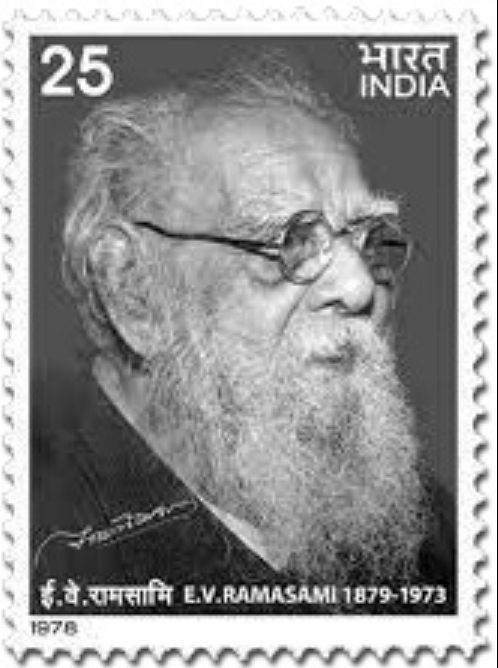
On this date in 1879, Indian rationalist and social reformer Periyar (“respected one” or “elder” in Tamil), né Erode Venkata Ramasamy, was born in Erode, now part of Tamil Nadu, India. He was raised in a religious family with an older brother and two sisters. His father was an affluent businessman, and Periyar left school after five years and joined the business at age 12. When he was 19, his father set up a marriage with Nagammai. The couple had one child who died during infancy. Nagammai steadfastly supported Periyar’s social and political actions.
In 1919, Periyar joined the Indian National Congress party and was eventually elected president of the Madras Presidency Congress Committee before leaving in 1925 when he learned the party was dominated by individuals from the Brahmin priestly caste who were indifferent or hostile toward his fight for equal rights. He later headed the Justice Party, which was dedicated to social and economic equity.
Periyar propagated rationalism over Hinduism, which he began to question from a young age and believed to be a major contributor to inequality in his state. He spoke out against Brahmin oppression and was a renowned advocate of caste emancipation and women’s rights. According to Periyar, self-willed reason is the only factor necessary for freeing oneself from the enslavement of religion.
He once stated, “Men today do not have self-confidence. They do not think that [it is] they who conduct [their affairs] on their own. They have made a muddle of God, God’s dictates, God’s philosophy, all of which were invented by man himself.” His Self-Respect Movement, aimed at generating pride among lower caste members, drove this point home further. He started his own political organization, Dravidar Kazhagam, to promote rationalism and social justice and against invidious religious practices.
After Nagammai’s death in 1933, he married Maniammai, who continued his social work, leading the Dravidar Kazhagam after his death. (As of this writing in 2023, it is headed by Krishnasami Veeramani.) Periyar is recognized as the “Father of modern Tamil Nadu” and has an iconic status in the state. Both major political parties in Tamil Nadu have been spawned from his political movement Dravidar Kazhagam. (D. 1973)
“He who created God is a fool, he who propagates God is a scoundrel, and he who worships God is a barbarian.”
— Periyar slogan he repeated and popularized throughout his political career
Malachy McCourt
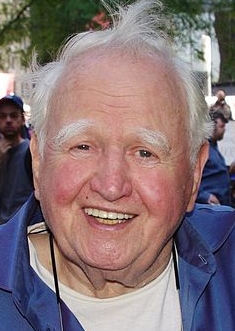
On this date in 1931, actor-writer Malachy Gerard McCourt was born in Brooklyn, N.Y., one of seven children born to Irish immigrants Malachy and Angela (Sheehan) McCourt. The family moved back to Ireland during the Great Depression, with the children growing up in poverty due to their father’s frequent absence and alcoholism — a disease his namesake would later fall prey but not succumb to — and their mother’s subsequent depressed state. At age 20, McCourt returned to New York.
After an Air Force hitch, he worked as a laborer, dishwasher, longshoreman and concrete inspector for the New Jersey Turnpike. He started the first singles bar in Manhattan, then began a tumultuous radio talk show career in 1970, which ended six years later with his firing. He had some success as a stage and TV actor and eventually made several movies. After divorcing his first wife Linda Wachsman after they had two children, he married Diana Galin in 1963. They had two more children together. He took his last drink of alcohol in 1985.
While his brother Frank was the more acclaimed writer (particularly for his Pulitzer Prize-winning Angela’s Ashes), McCourt also wrote extensively, including his own best-selling memoir A Monk Swimming (from his mishearing as a child the Hail Mary’s “Blessed art thou amongst women”).
He also wrote about being molested by two priests, and in Death Need Not Be Fatal took the Catholic Church to task for failing him personally and the poor and impoverished generally. He was the 2006 Green Party candidate for New York governor, losing to the Democratic candidate Eliot Spitzer.
He died at age 92 at Lenox Hill Hospital in New York City. (D. 2024)
PHOTO: By David Shankbone under Creative Commons Attribution 3.0
“I started out life as a member of the One Holy Roman Catholic Apostolic Church, and I am coming to the end of it without organized religion or mystical thinking. I am an atheist, thank God, with no fear of hell and no hope of heaven.”
— "Death Need Not Be Fatal" (Center Street, May 16, 2017)
Linda LaScola
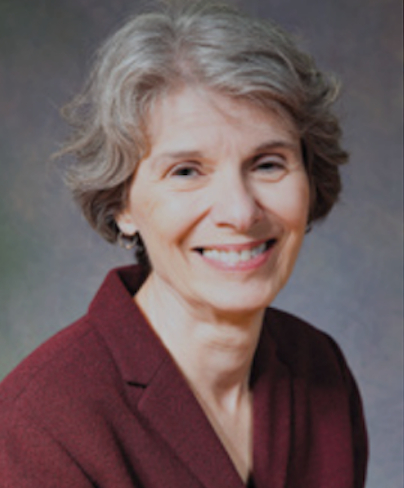
On this date in 1945, Linda LaScola — qualitative researcher, clinical social worker and Clergy Project co-founder — was born to Elvira (née Favorite) and Philip LaScola in New Castle, Pa. Her mother was a housewife and clerk typist. Her father was a wholesale produce merchant. The youngest of three children, she had a stable and very happy childhood.
“Although we went to church every Sunday, we weren’t very religious,” LaScola said. “My mother refused to send us to Catholic schools. She didn’t go to church much herself, claiming ‘claustrophobia,’ and my father guiltlessly skipped [mandatory Mass on] holy days.” (In-sight Journal, Dec. 5, 2016)
She attended church less at Penn State University, where she earned a B.S. in secondary education in 1967. “Though I still believed in God, there was too much silliness in Catholicism for me to take the religion seriously. After about 20 years of marriage and without children, my husband, an agnostic, and I started attending an Episcopal Church, to fill his need for community.” (Ibid.)
Her employment included recreation and case work for the American Red Cross and five years as a U.S. Capitol tour guide during which she went back to school and earned a master’s degree in social work in 1979 from the Catholic University of America in Washington, D.C. She had married Arthur Siebens that same year after they’d met at a neighborhood public library.
Alcohol abuse and issues affecting work performance took up much of her time as a social worker. A natural outgrowth of that was her subequent career in qualitative research, which is commonly used in the humanities and social sciences to gather in-depth insights into an issue or to generate new ideas for research.
In a speech to FFRF’s national convention in 2016, LaScola detailed her project with nonbelieving clergy:
When I made my personal academic study of religion in 2005-2006, I learned that clergy learn about the mythological basis for the bible in seminary. As a qualitative researcher and former clinical social worker, I couldn’t figure out how they could then go out and teach and preach something they knew wasn’t true. How could they deal with the cognitive dissonance? I learned that philosopher Daniel Dennett had the same question. So, to make a long story very short, we teamed up with Tufts University to conduct a small pilot study, and then a larger study of 35, including current and former pastors, seminary students and professors.
Their 2010 paper in Evolutionary Psychology on the pilot study was titled “Preachers Who Are Not Believers” and was expanded in 2013 for their book “Caught in the Pulpit: Leaving Belief Behind.”
In 2011, LaScola became a co-founder of The Clergy Project, along with Dennett, FFRF’s Dan Barker, Richard Dawkins, a pastor called “Chris” and another named “Adam,” the latter who came out publicly in 2016 as Carter Warden. It launched with 52 charter members in a collaborative effort to provide online space where deconverted clergy could gather to support and encourage one another.
“The Unbelieving,” a 90-minute, off-Broadway play that was years in the making and was produced by LaScola and Dennett with staging by The Civilians theater company was scheduled for a 2022 run from Oct. 20 through Nov. 20 at 59E59 Theaters. The playwright is Marin Gazzaniga. Based on interviews conducted for “Caught in the Pulpit,” the play is described as a “classic tale of religious conversion, [in which] finding God holds the promise of a life filled with purpose and meaning. But what happens when this transformation occurs in reverse, and a faith you have built your life around begins to fall away?”
LaScola also blogged extensively at Rational Doubt on Patheos. As of this writing in 2022, she and her husband live in Washington, D.C., and The Clergy Project has over 1,000 members.
“After about a year of reading and taking adult education classes at church, I realized there was nothing to believe and we left. My husband, who, like me, now identifies as an atheist, has since joined an Ethical Society and a Unitarian Church. I stay home and read the paper.”
— Interview, In-sight Journal (Dec. 5, 2016)
Pedro Almodóvar
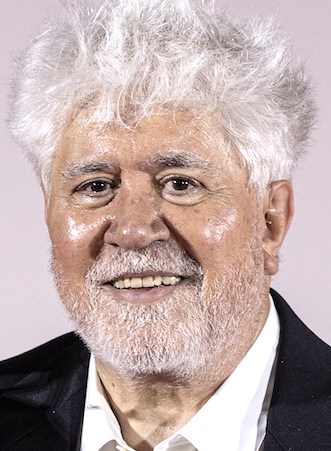
On this date in 1949, filmmaker Pedro Almodóvar Caballero was born in rural Calzada de Calatrava, Spain, to Francisca Caballero and Antonio Almodóvar. His father, never a financial success in various enterprises, at the time was sort of a traveling salesman with his wares packed on the back of a mule. His mother earned pocket money by reading and writing letters for illiterate neighbors.
His brother Agustín later described their rustic birth village as “the sort of place where people spend their whole lives saving up for a decent headstone in the cemetery.” Almodóvar got a scholarship at age 8 to attend a Catholic boarding school run by Salesian priests and soon knew the priesthood did not appeal to him like it did his parents.
He moved to Madrid to attend the National School of Cinema when he was 18, supporting himself as an administrative assistant with the phone company Telefónica, where he worked for 12 years while enmeshing himself in experimental film and theater and writing for newspapers and magazines. His first feature film, “Pepi, Luci, Bom” (1980), attracted followers and drew comparison to films by John Waters for its irreverence toward sexuality and social mores.
His next feature, “Labyrinth of Passion” (1982), focused on a nymphomaniac pop star who falls in love with a gay Middle Eastern prince. It drew even more followers and marked the first of several collaborations with actor Antonio Banderas. “Dark Habits” (1983), a black comedy, featured a cabaret singer seeking refuge in a convent of nuns with extremely sordid and some illegal habits (lesbianism, cocaine, murder). It drew controversy from religious critics after premiering at the Venice Film Festival.
Almodóvar started his own production company, El Deseo, in 1986. Nearly all its staff members in 2004 were women, explained production director Esther García in the New York Times Magazine: “There’s an expression in Spain. One cock and all hens. That is this company. Pedro communicates very well with women.”
The film that brought him attention and success in the U.S. was “Women on the Verge of a Nervous Breakdown” in 1988. “Tie Me Up! Tie Me Down!” (1990), was initially given an X rating, later changed to NC-17. “All About My Mother” (1999) won an Oscar and Golden Globe for Best Foreign Language Film. “Talk to Her” (2002) brought Almodóvar his first personal Academy Award, for Best Original Screenplay, and he was nominated for Best Director.
“Bad Education” (2004) focused on a priest’s sexual relationship with his teen male student. Discussing the film made him remember his Catholic education and how he was told he had an “abrasive” character. “Because my education was under the priests, I always had problems. The priests considered my questions heretical. I discovered the word ‘hedonist,’ and I thought of myself as a hedonist. At the same time — I think it was after seeing an Antonioni movie — I discovered the word ‘nihilism.’ I was 10 or 12.” (New York Times Magazine, Sept. 5, 2004)
After several dramatic and serious films, the comedic “I’m So Excited!” (2013), the title of a Pointer Sisters song, was deemed by one reviewer as “a piece of extravagant, kitsch entertainment.” Almodóvar called it “my gayest film ever” when it was released. (The Guardian, April 27, 2013)
“The Room Next Door” (2024) premiered at the Venice Film Festival and became the first Spanish film to win the Golden Lion. Starring Tilda Swinton and Julianne Moore, it was Almodóvar’s first feature-length film in English. Though he is fluent in English, he prefers to speak and write in Spanish.
Moore’s role is best friend to Swinton, who is dying after failed cancer treatments and wants to end her life peacefully with a euthanasia pill she bought on the dark web. “When I was younger, I didn’t think so much about death because, in my case, that I don’t believe in God,” Almodóvar explained. “[I]f I am seriously ill, then absolutely I want to decide about my death. If life doesn’t offer me nothing but pain, then I want to be the owner of my death.” (NPR “Morning Edition,” Dec. 19, 2024)
Openly gay and an avowed atheist, he described himself as actively bisexual until age 34 and has been with his partner, the actor and photographer Fernando Iglesias, since 2002. They live in separate dwellings in Madrid.
PHOTO: Almodóvar at the 2024 Venice International Film Festival; Harald Krichel public domain photo.
“I am not a believer. Spain is a nonconventional country, but the majority are Catholic. But I am not. I never believed in God. So I feel really I don’t have any support of any religion or any credo.”
— Almodóvar explaining on PBS “Amanpour and Company” how he feels about death and mortality (Jan. 10, 2024)
Bhagat Singh
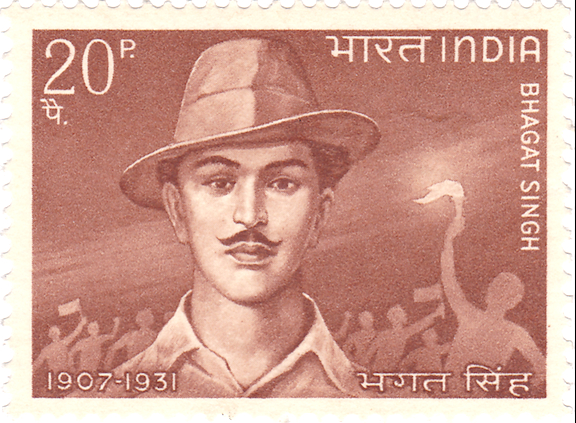
On this date in 1907, Bhagat Singh, a revolutionary hero of the Indian independence movement, was born in Lyallpur (in current-day Pakistan). Although he’s revered almost universally in India, few of his admirers know that he was an avowed atheist and Marxist.
Singh was part of a family of freedom fighters and quickly acquired a radical consciousness. In 1928 he was convicted of conspiring to kill a British police officer in revenge for the beating death of an elderly independence stalwart, Lala Lajpat Rai. Singh escaped from the assassination scene only to reappear at the Punjab state Assembly building some months later, setting off bombs and shouting slogans.
Singh was willingly arrested with his comrade Batukeshwar Dutt. He was hanged by the British authorities along with two other co-conspirators on March 23, 1931, rendering him “immortal” in the eyes of his fellow Indians. He is remembered all across India and glorified in movies, TV shows, plays and songs. Singh was of Sikh background but became disillusioned with religion by his early youth. A turning point was religious unrest in his hometown of Lahore. He wrote articles analyzing the deleterious role that religion was playing in preventing Indians from coming together to oust the British.
His seminal essay on the issue was composed in prison in response to friends who thought his unbelief stemmed from vanity. In “Why I Am an Atheist,” written while he was facing execution, Singh patiently explained why he stopped believing in God and challenged every major Indian religion: “By the end of 1926 I had been convinced as to the baselessness of the theory of existence of an almighty supreme being who created, guided and controlled the universe. I had given out this disbelief of mine, I began discussion on the subjects with my friends. I had become a pronounced atheist.”
Singh offers a paradox in present-day India, where a man is venerated but his freethought and radicalism are conveniently ignored. A postage stamp with his image was issued in 1968. An 18-foot statue of him stands tall in the Indian Parliament, and his cremation site has been designated as the National Martyrs Memorial, but there are few takers for his ideas.
Singh’s proud embrace of atheism, even in the face of imminent death, presents a possible way out of the religious nationalism that has been bedeviling the country. D. 1931.
“One friend asked me to pray. When informed of my atheism, he said, ‘During your last days you will begin to believe!’ I said, ‘No, dear sir, it shall not be. I will think that to be an act of degradation and demoralization on my part.’ ”
— Singh, “Why I Am an Atheist” (Oct. 5-6, 1930)
Francesca Stavrakopoulou
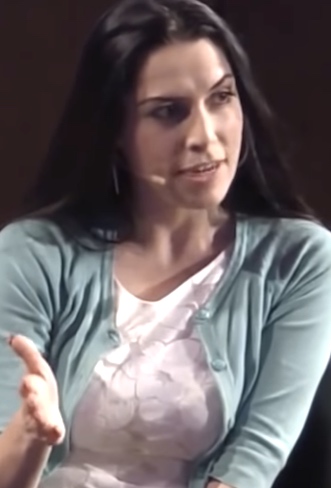
On this date in 1975, biblical scholar and atheist Francesca Stavrakopoulou (Stav-rah-kah-poo-loo) was born in Bromley, Greater London, to an English mother and a Greek father. “I wasn’t brought up religious at all. There were people in my family who were different flavors of Christianity, but not in a going-to-church-all-the-time kinda way. Or the bible being read every day. Just that kind of cultural Christianity that so many of us grow up with in Western society.” (What I Wanna Know online, Aug. 25, 2023)
Perhaps due to her heritage, she loved stories about Greek gods and goddesses. “And I just remember not being able to quite understand why there’s all this fuss about Jesus, because it seemed to me like this was completely normal in sort of mythological terms. Here’s a guy whose mum was immortal and whose dad was a god. So what? Why is he so special? How come this guy gets all the attention now and some of those great mythological figures from the past had disappeared?” (Ibid.)
After earning a doctorate in theology from the University of Oxford, she joined the Oxford faculty for several years before assuming a position at the University of Exeter, one she holds as of this writing in January 2025 as a professor in the department of classics, ancient history, religion and theology.
Her book “God: An Anatomy” (2021) won the PEN Hessell-Tiltman Prize celebrating the best nonfiction writing on any historical subject. It was named one of The Economist’s Books of the Year. “It’s the book I always wanted to write – to find out why this deity, out of all the ancient gods, is the one who managed to survive into the present day. I wanted to set God in his natural cultural habitat, and what we discover is that he was no different than the other gods in ancient southwest Asia,” she said in a University of Exeter post. (Dec. 21, 2022)
Penguin Random House called it “a vividly corporeal image of God: a human-shaped deity who walks and talks and weeps and laughs, who eats, sleeps, feels, and breathes, and who is undeniably male.” Stavrakopoulou believes that “very little, probably” of the Hebrew bible is historical fact, based on the contention that ancient writers had an understanding of “fact” and “fiction” very different from a modern understanding.
On Channel 4 in 2010, she posited that figures like Moses and King David did not actually exist. A former secretary of the British-based Society for Old Testament Study, she has appeared on BBC One to discuss topics such as “Is the bible still relevant?” “Is there a difference between a religion and a cult?” and “Are religions unfair to women?”
She took issue with this comment in a review by The Independent that included her physical appearance: “Clearly whoever commissioned a three-part series on biblical scholarship for BBC2 was entirely indifferent to the fact that it would be presented by someone who looks as if she’s shimmied out of one of the hotter passages of the Song of Solomon.” (The Guardian, Oct. 26, 2014)
A foul statement, Stavrakopoulou responded. “Essentially, the message is the same: Unless women dress modestly and conservatively, they look out of place in academia, because fundamentally, they don’t have the right bodies to be academic authorities. This infuriates me, and I refuse to accept it.”
In a long interview that more than amply displayed the depth of her religious scholarship exploring the mythical deities of classical antiquity as well as Christianity and Judaism, Stavrakopoulou said people were confused by her early on. “Even when I started my academic studies, when I did my first degree and then my master’s and then my doctorate and even doing postdoctoral work, people always said, ‘But you’re an atheist? Why would you be interested in the bible?’ … This collection of texts has shaped so much of our cultural assumptions and preferences and our cultural anxieties. And it just seems to me to be wrongheaded to think that an atheist wouldn’t be interested in the bible.” (Ibid. What I Wanna Know)
As a patron of both Humanists UK and Defence Humanists, Stavrakopoulou advocates for improved mental health services and nonreligious pastoral support for active and veteran military members and their families. Her husband is a former Royal Marines commando who suffered a life-altering injury while on duty. “When were you the happiest?” she was asked by The New Statesman in 2023. “The day I got married. I’m very soppy,” she answered.
She thinks the hate mail she gets, including threats of rape and death, stems from fear and deep-seated insecurity that maybe she’s right that their beliefs are mostly based on myth: “Religion is obviously terrible in all sorts of ways for all sorts of different people, but it’s not going anywhere. And so there is no point in trying to dismiss it and ridicule it, not least because not all religious people are bad, unthinking, stupid people. I know a lot of very deeply wonderful, caring, fantastic, clever people who also happen to be religious.” (Ibid.)
PHOTO: Stavrakopoulou in 2015 on London Thinks: A Scientist, an Atheist Biblical Scholar and a Vicar Walk Into an Ethical Society; Conway Hall photo under CC 3.0.
“Whether we like it or not, [the bible] matters. It’s like how Shakespeare matters, and the bible matters in that sense. So it’s a cultural icon, whether you believe it or not. But certainly, it’s not the divine word of God.”
— Interview, What I Wanna Know (Aug. 25, 2023)
Bob Geldof
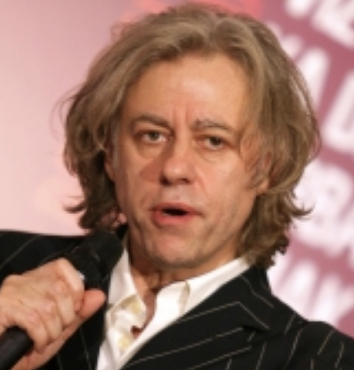
On this date in 1951, Robert Frederick Zenon Geldof was born in Dun Laoghaire, Ireland. He attended Blackrock College and became a music journalist for Georgia Straight in Vancouver, B.C., after graduation. Returning to Ireland, he became the lead singer of the punk rock band the Boomtown Rats (1975–86), known for the songs “I Don’t Like Mondays” (1979), “Rat Trap” (1978) and “Up All Night” (1981).
In 1986 he went solo and published his autobiography Is That It?. He portrayed Pink in “The Wall” (1982), based on Pink Floyd’s album. He married journalist Payla Yates in 1986 and the couple had three children: Fifi, born in 1983, Peaches, born in 1989, and Pixie, born in 1990. They divorced after Yates left him for INXS lead singer Michael Hutchence, who committed suicide in 1997. Yates died of a drug and alcohol overdose in 2000. Peaches died of a heroin overdose in 2014.
Geldof is a philanthropist and anti-poverty activist. In 1984 he formed the musical group Band Aid, which raised $8 million to aid Ethiopia. Geldof also helped organize the Live Aid concerts in 1985, which raised over $150 million to combat African famine. He followed with the Live 8 concerts in 2005 featuring over 1,000 musicians. He was elected a member of the Commission for Africa in 2004, received a Lifetime Achievement Award at the 2005 Brit Awards for his musical accomplishments, was nominated for the Nobel Peace Prize three times and was knighted in 1986.
When asked in an Independent article (July 10, 2006) if he was a saint or a sinner, Geldof replied, “Being an atheist I can’t be either.” In a 2011 interview with the Manchester Jewish Telegraph, he explained: “I was a quarter Catholic, a quarter Protestant, a quarter Jewish and a quarter nothing — the nothing won.”
After several successful business ventures, he formed the private equity firm 8 Miles in 2008, investing solely in Africa and domiciled on the Indian Ocean island of Mauritius. The firm has come under criticism for operating out of a country seen as a tax haven instead of locating in Africa.
“I actively disliked the Church and its institutionalized morality which I felt bedeviled Ireland.”
— Geldof in his autobiography "Is That It?" (1986)
Roy Zimmerman
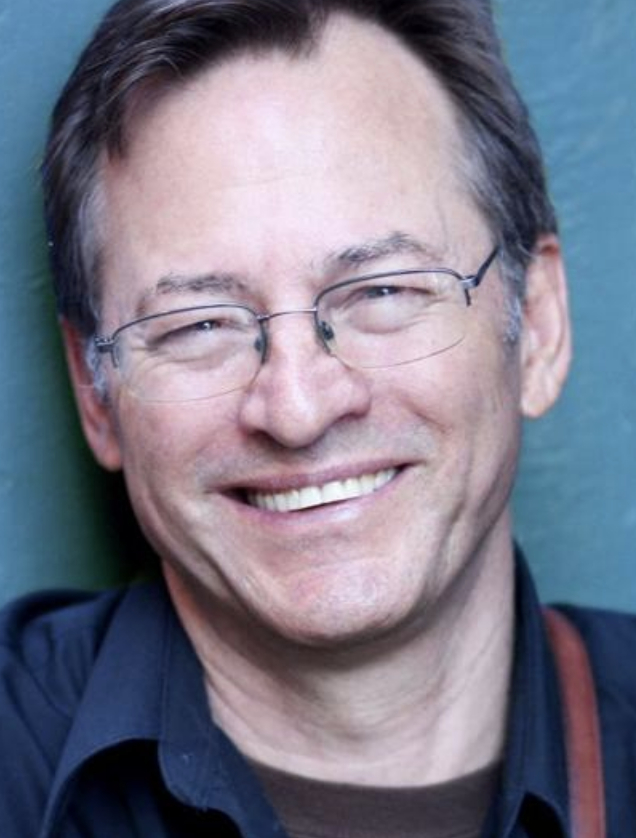
On this date in 1957, satirist and singer-songwriter Roy Zimmerman was born in San Francisco and was raised “in a cult,” he quips. “It was called Lutheranism.” After a time as his church’s choir director as a young adult, he “drifted into other waters.”
Zimmerman wrote a series of satirical musical revues in the 1980s that were produced by the San Jose Repertory Theatre, including YUP! (1984), UP the YUP (1985) and YUP It UP! (1986). They parodied the excesses of the evolving yuppie culture in the Silicon Valley. In 1996 he founded a satirical folk quartet named The Foremen that performed at the national conventions of both major political parties.
He continued to work as a solo performer with liberal and irreligious points of view. “I write satire because I want to use humor to do serious work. I’m often accused of preaching to the converted, but I don’t think of it that way. I think of it as entertaining the troops,” Zimmerman said. “If we ever attain a worldwide consciousness of peace and justice, I’ll be happily out of a job.”
He performed at the Rock Beyond Belief concert in 2012 at Fort Bragg, N.C., and at FFRF’s 2017 national convention. His song “The Liar Tweets Tonight” in various versions has had over 11 million video views as of this writing in 2020. In 2019 he released his 10th studio album, “RiZe Up.” He and his wife Melanie Harby have co-written an estimated 1,000 songs, live in Marin County, Calif., and tour extensively. Their best collaboration, Zimmerman said, is their two sons, Joe and Sam.
Harby is an award-winning bluegrass guitar player and was an original Broadway cast member of the musical “Quilters” in 1984. She worked as a guitar tech for Joni Mitchell and was her research assistant on the 31-track “Hits” and “Misses” recording project.
Richard Dawkins has called Zimmerman “a modern-day Tom Lehrer.” Asked if being openly atheist has caused him problems as a performer, he said: “It’s important, I think, to present these ideas, whether they be religious or political or just social satire, in a way that’s inviting, in a way that brings people into your argument. The implicit argument is not here’s what I think and you should think that, too. The implicit argument is here’s what I find absurd, don’t you?” (“Freethought Matters,” Oct. 29, 2020)
On that episode of FFRF’s TV talk show, Zimmerman sang his song “I Want a Marriage Like They Had in the Bible” and commented, “As Dan [Barker] was saying, if people were to harken to what the bible actually has to say about marriage, they’d be horrified. For you and I actually read the bible. A lot of believers don’t.”
Freedom to oppress
In the name of righteousness
Religious freedom to scratch where it itches
Religious freedom to burn our own witches.— Chorus of the 2015 Zimmerman-Harby song "Religious Freedom"; D.C. Anderson photo
Hector Avalos
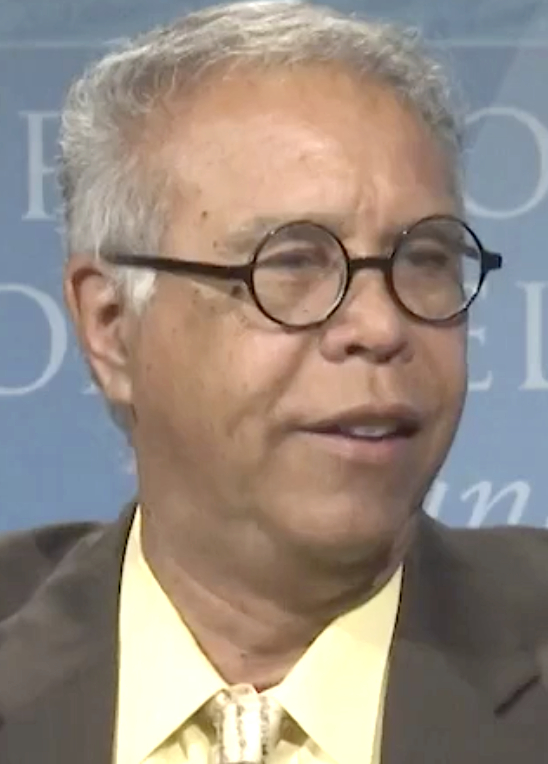
On this date in 1958, cultural anthropologist and biblical scholar Hector Avalos was born in Nogales, Sonora, Mexico. As a child, he attended the Church of God and gained some notoriety as a traveling Pentecostal evangelist before he was 10 years old and living with his grandmother in Arizona.
“We talked about sin and salvation. That you needed to be saved because Jesus died for your sins, and it will help you transform your life. We were against abortion. We were against premarital sex. We were against homosexuality. We were against rock ‘n’ roll.” He was determined to become a Christian missionary. (Iowa State Daily, Nov. 9, 2010)
After years of intense bible study to determine what was true and what wasn’t, he came to realize as a college freshman “that the arguments I made for Christianity were not the best, and that I could make just as excellent of an argument for other religions as I could for mine.” He had started studying to defeat any argument against his faith in God, but those studies led him instead to a faith in science and in family. Before long he was calling himself an atheist. (ibid., Iowa State Daily)
A diagnosis of a rare vascular disease called granulomatosis with polyangiitis and a dire prognosis that he had only two years to live forced him out of his anthropology degree program in 1978. He battled the disease and complications from it until he died 43 years later.
He returned to the University of Arizona in 1980 to complete his degree and then earned a master’s in theological studies from Harvard Divinity School and a Ph.D. in Hebrew Bible and Northwest Semitic philology from Harvard. Overcoming his physical challenges, he taught anthropology and religious studies at the University of North Carolina-Chapel Hill before joining the faculty at Iowa State University in Ames in 1993 to teach those subjects.
Avalos founded the U.S. Latino/a studies program at ISU, where he was 1996 Professor of the Year in 1996, and founded the Atheist and Agnostic Society at ISU three years later. “Prior to ’99, the word ‘atheist’ was like a dirty word,” he told the school newspaper in 2010. “It still is, actually. People were reluctant to call themselves atheists, so they would call themselves skeptics or freethinkers.” He told the paper his courses weren’t meant to “convert” students to atheism but to show them different perspectives. “A lot of these kids come here not even knowing there are other viewpoints. That in itself is an eye-opening experience for them.”
He published 10 books, including “Fighting Words: The Origins of Religious Violence” (2005), and most recently “The Reality of Religious Violence: From Biblical to Modern Times” (2019). In 2018 he received the inaugural Hispanic American Freethinkers Lifetime Achievement Award in Washington, D.C. He was inducted into the Iowa Latino Hall of Fame in 2019.
Avalos was an FFRF member and a guest on its radio show and TV talk show “Freethought Matters” (Oct. 16, 2019). He was married twice and was survived by his wife Cynthia after dying at age 62 of cancer. (D. 2021)
“One thing led to another, and I realized that I did not believe in Christianity or that the Bible was the word of God, or that the Bible had any kind of divine origin.”
— Interview, Iowa State Daily, Nov. 9, 2010
Neal Brennan
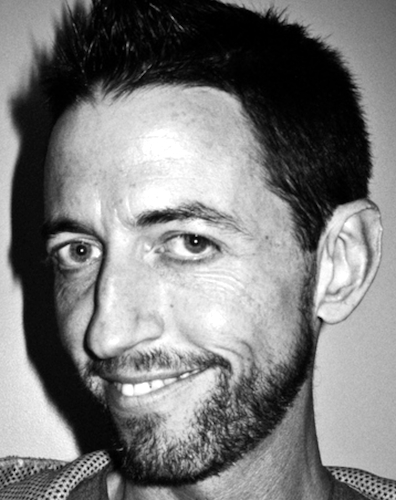
On this date in 1973, comedian-writer-director Neal Brennan was born in Villanova, Pa., the youngest of 10 children in an Irish-Catholic family. He studied film for a year at New York University, then worked as a doorman at a Greenwich Village comedy club where he met Dave Chappelle.
He moved to Los Angeles in the mid-1990s to write for television. He teamed with Chappelle in 1997 on the screenplay for the film “Half Baked,” a commercial failure that became a cult classic. He and Chappelle co-created the sketch comedy series “Chappelle’s Show” in 2002, which debuted in 2003 on Comedy Central and aired until 2006. Chappelle left the show without warning in 2005.
Brennan received three Emmy nominations for directing, writing and producing “Chappelle’s Show.” It’s the top-selling television show DVD of all time with nearly 9 million units sold as of this writing in 2019. It was Comedy Central’s highest-rated program after two seasons.
He also wrote material for “Saturday Night Live” when Chappelle and Aziz Ansari were hosts and for Seth Meyers’ speech at the White House Correspondents Dinner in 2011. His first one-hour stand-up special, “Women and Black Dudes” premiered on Comedy Central in 2014.
Brennan became a contributor to “The Daily Show with Trevor Noah” in 2016 as “Trevor’s friend Neal.” In 2017 he released “3 Mics,” his second special on Netflix, followed by an all-new half hour of material in 2019 as part of the Comedians of the World series.
An atheist, Brennan doesn’t mind taking potshots at it, calling it “the height of white privilege.” (The Hollywood Reporter, April 15, 2019): “Think about it: Religion basically says, ‘Hey, can we interest you in an after-life?’ And white people are all like, ‘No, thank you.’ Like, ‘Why, how much better can it be?’ ”
On Peter McGraw’s podcast (Sept. 26, 2018), Brennan said: “The only thing that matters to me now is the first-person experience. Legacy is hogwash to me, even any religion. I’ve been shaky at best on religion for the last decade.”
PHOTO: Brennan in 2012; photo by CleftClips under CC 2.0.
“God is unbelievable! (I’m an atheist)”
— Brennan tweet, July 10, 2011
Cara Santa Maria

On this date in 1983, journalist and science communicator Cara Louise Santa Maria was born in Plano, Texas. Her parents were raised Catholic but converted to Mormonism as adults. Santa Maria was baptized as a Latter-day Saint at age 8 but by age 15 had left the church and started identifying as an atheist.
She earned a B.S. in psychology from the University of North Texas in Denton in 2004, followed by an M.S. in neurobiology in 2007 and of this writing was working toward a Ph.D. in clinical psychology from Fielding Graduate University in Santa Barbara, Calif.
Santa Maria was laboratory manager and chief cell culture technician at the Center for Network Neuroscience at UNT. She also taught biology and psychology courses at the high school and undergraduate level. In 2009 she moved to the Los Angeles area to begin a career in science communication. She was senior science correspondent for the Huffington Post and later a correspondent on “Bill Nye Saves the World.”
Santa Maria co-produced and hosted a pilot titled “Talk Nerdy to Me” for HBO but it never aired. “Talk Nerdy” is the title of her weekly science podcast, which celebrated its sixth anniversary in March 2020. Atheism and politics are sometimes featured topics. She has been a science correspondent and guest on National Geographic’s TV series “Brain Games.” Since 2015 she has co-hosted “The Skeptics’ Guide to the Universe” podcast and co-wrote the 2018 book with that title.
On Earth Day 2017, she was an emcee at the March for Science in Washington, D.C. “Science is under attack,” she told the crowd. “The very idea of evidence and logic and reason is being threatened by individuals and interests with the power to do real harm.”
From 2009 to 2011, she was in a relationship with television host and political commentator Bill Maher but has never married. Neil deGrasse Tyson presented her with a 2014 Knight Foundation award for her efforts to make science clearer for a broad public audience.
She was the recipient in 2017 of FFRF’s Freethought Heroine award. She told convention attendees she remembers the day when she was 14 that her father told her “I have a moral obligation to God to force you to go to church until you’re 18 so long as you live under my roof.” Santa Maria replied, “Then maybe I won’t live under your roof anymore.” Her acceptance speech is here.
“I don’t believe in God.”
— Santa Maria remarks at FFRF’s 40th annual convention (Sept. 15, 2017)
Fran Lebowitz
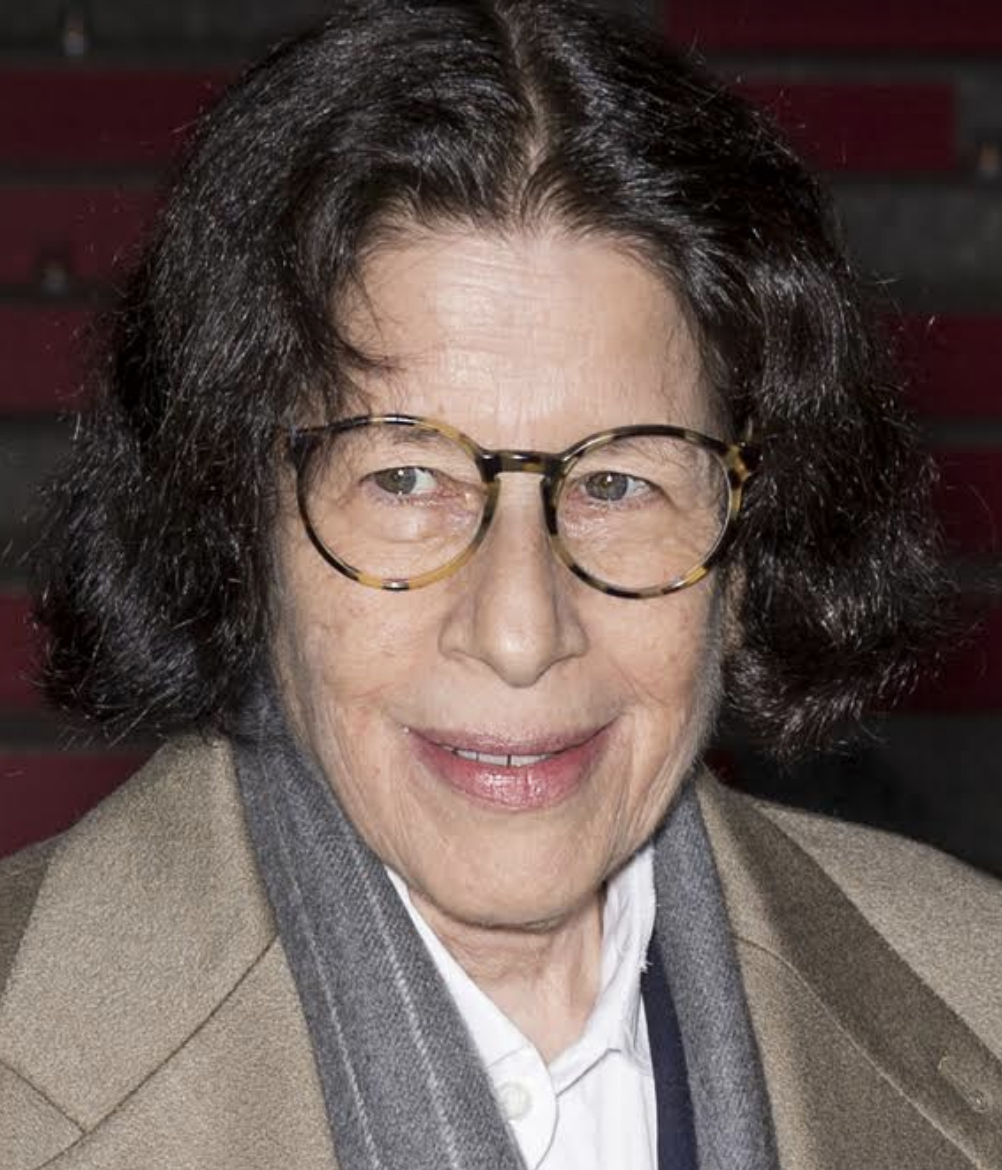
On this date in 1950, author and humorist Frances Ann Lebowitz was born in Morristown, N.J., to Ruth and Harold Lebowitz, who owned a furniture store and upholstery shop and attended a Conservative Jewish synagogue. She was expelled from an Episcopalian high school at age 17 for what she later called “non-specific surliness” and completed her GED.
She moved to New York City in 1969 and worked as a cleaning lady, chauffeur, taxi driver and freelance writer. Andy Warhol hired her as a columnist for Interview magazine. She also wrote for Mademoiselle. Her first book, a collection of comedic essays titled Metropolitan Life, was published in 1978.
“All God’s children are not beautiful. Most of God’s children are, in fact, barely presentable,” Lebowitz wrote in Social Studies (1981), another essay collection. The Fran Lebowitz Reader and the children’s book Mr. Chas and Lisa Sue Meet the Pandas followed in 1994.
Since then she has worked on uncompleted book projects like Exterior Signs of Wealth — a novel about rich people who want to be artists and artists who want to be rich — and her book Progress, excerpted in Vanity Fair starting in 2004 but still unfinished as of 2021. “For every mandatory moment of silence before classes at a public school, during which students are free to pray or not, there will be a mandatory moment of noise before services at a religious institution, during which congregants are free to listen or not.” (Vanity Fair, Oct. 17, 2006)
Lebowitz later largely supported herself with TV appearances, speaking engagements and as a contributing editor and occasional columnist for Vanity Fair. She is a political liberal and a lesbian who is uncomfortable in long-term relationships. “I’m the world’s greatest daughter. I’m a great relative. I believe I’m a great friend. I’m a horrible girlfriend. I always was. I’m great at the beginning, because I can be very romantic.” (Interview magazine, March 11, 2016)
She was the subject of film director Martin Scorsese’s 82-minute documentary “Public Speaking” on HBO in 2010 before a limited theatrical release the next year. She collaborated again with Scorsese on “Pretend It’s a City,” a seven-part documentary series featuring her interviews and conversations with Scorsese. It was released on Netflix in January 2021.
“I got in trouble when I was 12 or 13, because I told the Sunday school teacher I don’t believe in God. I have not changed my mind on that,” Lebowitz once told an interviewer. “My Jewish identity is ethnic or cultural or whatever people call it now. But it’s not religious.” (New Jersey Jewish News, Jan. 27, 2016)
PHOTO: Lebowitz at the 2015 Tribeca Film Festival in New York City; Ovidiu Hrubaru / Shutterstock.com
“I’ve been an atheist since I was about 7 years old.”
— Haaretz interview (Oct. 6, 2011)
Lee Child
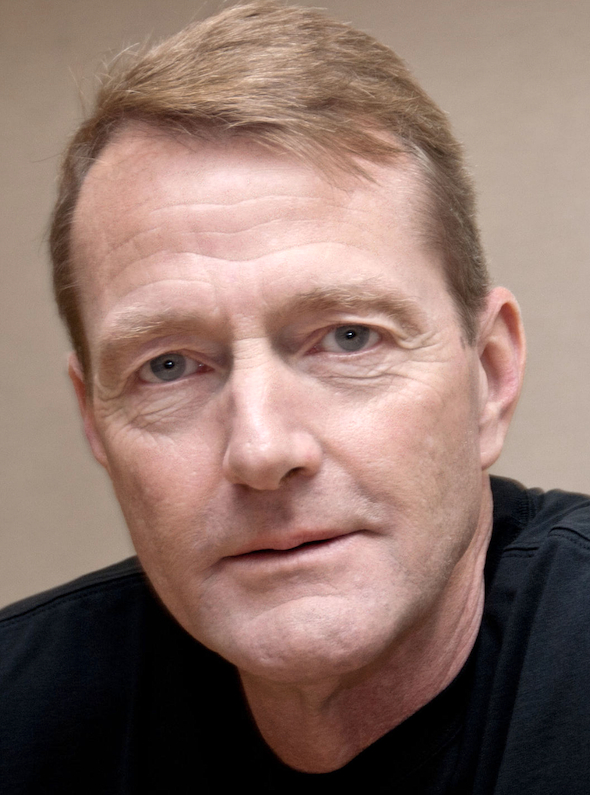
On this date in 1954, best-selling author Lee Child, né James Dover Grant, was born in Coventry, England. Best known for his Jack Reacher series of novels, Child attended the same high school as JRR Tolkien before enrolling in law school (with no intention of practicing law).
He then joined Granada Television in Manchester. It turned out to be an 18-year career as a presentation director during British TV’s “golden age.” During his tenure, Granada made “Brideshead Revisited,” “The Jewel in the Crown,” “Prime Suspect” and “Cracker” before he lost his job in 1995 at age 40 during corporate restructuring.
“Always a voracious reader, he decided to see an opportunity where others might have seen a crisis and bought six dollars’ worth of paper and pencils and sat down to write a book, Killing Floor, the first in the Jack Reacher series,” says the bio on Child’s website. Killing Floor won the 1997 Anthony Award and the Barry Award for Best First Novel.
As of 2020, 48 Reacher titles have been published, with over 100 million books sold. Forbes magazine called it the “The Strongest Brand In Publishing” in 2014. Two of the titles were adapted for movies starring Tom Cruise. Some Reacher fans cried foul because their hero is a strapping 6-foot-5 while Cruise is 5-foot-7.
Child was elected president of the Mystery Writers of America in 2009. He had moved to New York in 1998 with his American wife, Jane, and their daughter, Ruth, while maintaining British citizenship and other homes outside the U.S. After accepting a visiting professorship in 2008 at the University of Sheffield, where he attended law school, he funded 52 Jack Reacher scholarships. In 2019 it was announced he would host a new TV show called “Lee Child: True Crime.” Child announced in 2020 he would be turning over the Reacher series to his brother Andrew Grant, who would write them under the surname Child.
Child identifies as an atheist and has made Reacher, an ex-military cop vigilante, one also. “Anyone who writes will use a good deal of autobiography in a protagonist,” Child said in a 2016 interview. “You can insert your own enthusiasm, jokes and opinions.” In Nothing to Lose (2008), Reacher tells a Christian preacher, “We’re all atheists. You don’t believe in Zeus or Thor or Neptune or Augustus Caesar or Mars or Venus or Sun Ra. You reject a thousand gods. Why should it bother you if someone else rejects a thousand and one?”
In Bad Luck and Trouble (2007), Reacher pays a higher fare for another airline because “Reacher hated Alaska Airlines. They put a scripture card on their meal trays. Ruined his appetite.”
PHOTO: Child in 2010 at Bouchercon XLI in San Francisco; Mark Coggins photo under CC 2.0.
“I’ve no sympathy for any religion. I’m an atheist; I think they’re all nuts.”
— Interview, Saga Magazine (Oct. 24, 2016)
Narendra Dabholkar
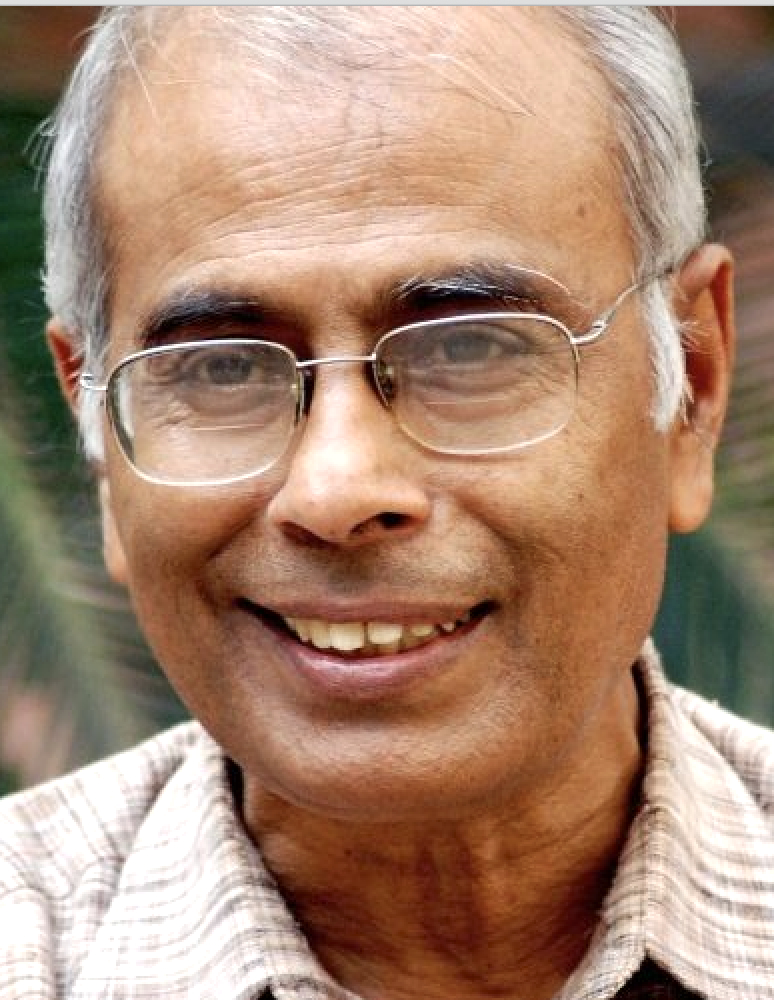
On this date in 1945, Dr. Narendra Dabholkar, an atheist and rationalist assassinated for his anti-superstition activism, was born in Satara, Maharashtra state, India. The youngest of 10 children, Dabholkar was remarkably multifaceted. He was a physician, prolific writer and international level athlete who represented India in the game of kabaddi.
After practicing medicine for a dozen years, his involvement in social work started in the 1980s and gradually focused on the harm done by organized religion. In 1989 he founded the Maharashtra Andhashraddha Nirmoolan Samiti (Committee for the Eradication of Superstition).
He became well known for public criticism of godmen (self-proclaimed demigods and charlatans with cult followings) and for anti-superstition drives in his home state of Maharashtra. The state includes Mumbai and has more than 120 million people. He was also the author of several books advocating rationalism and a scientific outlook.
Dabholkar refused police protection despite being constantly targeted with death threats and even assaults. He was murdered at age 67 on Aug. 20, 2013, in the city of Pune while on a morning walk. Although one of the two gunmen was caught, the masterminds, allegedly belonging to a fringe Hindu nationalist group, are still at large. His assassination was the first in a series claiming the lives of four freethinkers in that region, as of this writing in 2022.
Dabholkar was occupied in his final days working on an anti-superstition bill titled “Anti-Superstition and Black Magic Ordinance,” which became law four days after his murder. The next year, the Indian government posthumously awarded him one of its top civilian honors, the Padma Shri. The date of his assassination, Aug. 20, is now observed as National Scientific Temper Day in his memory.
FFRF honored the Maharashtra Andhashraddha Nirmoolan Samiti and Avinash Patil, its head at the time, with the Avijit Roy Courage Award at its 2019 convention. Dabholkar was close friends with Amol Palekar and Shriram Lagoo, two actors who are Indian legends and are included in FFRF’s freethinking pantheon. (D. 2013)
“Scientific thinking is purely logical: the adjective ‘rational’ cannot be applied to it. Scientific temperament is a process of thinking, method of action, search of truth, wayof life, spirit of a freeman.”
“When a so-called spiritual man amasses riches in billions, feasts on scrumptious meals, wears expensive silk clothes, and resides in an ivory tower, seeking the company of glamorous women, the contradiction in his life is obvious.”
— QUOTE 1: "The Case for Reason: Understanding the Anti-Superstition Movement, Vol. 1" (English translation, 2018) QUOTE 2: "The Case For Reason: A Scientific Enquiry into Belief, Vol. 2" (English translation, 2019)
Steven Wilson

On this day in 1967, musician Steven John Wilson was born in the Kingston upon Thames section of London to music-loving parents. His father, an electronic engineer, built him a multi-track tape recorder and a type of synthesizer called a vocoder. Wilson’s first instrument was a guitar but he grew to learn to play others, including keyboards, autoharp, hammered dulcimer and flute. The rock group Porcupine Tree, for which he’s most well-known, started as his solo project in 1987 before disbanding in 2010.
Associated mainly with progressive rock, Wilson’s influences and work as a composer, performer and producer have encompassed genres such as psychedelia, pop, extreme metal, electronic and jazz. He’s worked with groups like King Crimson, Pendulum, Jethro Tull, Yes, Tears for Fears, Roxy Music and Anathema. The Daily Telegraph in 2017 called him “the most successful British artist you’ve never heard of” in that he has avoided mainstream music, an industry he calls “dreadful.”
Wilson has been nominated four times for Grammy Awards, twice with Porcupine Tree, with his collaborative band Storm Corrosion and as a soloist. He was crowned “king of prog rock” in 2015 at the Progressive Music Awards in London. AllMusic.com credits him on 976 different releases as either songwriter, instrumentalist or producer.
Wilson, an atheist, frequently criticizes religion in his songs. His 2017 album “To the Bone” includes the track “People Who Eat Darkness,” which is about living next door to a fundamentalist religious terrorist and being none the wiser. The song “Last Chance to Evacuate Planet Earth” (2001) commented on the disturbing details behind the Heaven’s Gate cult’s mass suicide in 1999. “Prodigal” from Porcupine Tree’s 2003 album “In Absentia” says “I tried to find myself a better way/I got religion but I went astray/They took my money and I lost my faith.”
Wilson is a vegetarian who doesn’t smoke or do recreational drugs and drinks only occasionally. In a 2012 interview he said “a lot of musicians produce fantastic work in their 20s that’s incredibly creative and prolific. By the time they get to 30, they get married and have kids. Suddenly, the music starts to get more predictable. I think that’s because they become focused on other things and the music becomes a job as opposed to being a vocation. That’s never happened to me. I don’t have a family. I’m not interested in having a family. Some people might think that’s very tragic and sad. I don’t. It’s not for me.”
PHOTO: Wilson in Bologna, Italy, in 2019; photo via Shutterstock by Carlo Vergani.
INNERVIEWS: Are you an atheist?
WILSON: I guess I am in some ways your archetypal atheist. I think the whole myth of religion is absolutely absurd. I say this with the caveat that I understand it brings happiness to people who would otherwise be unhappy. There is comfort in it for people who would otherwise be tortured by their own existence and all that stuff. I appreciate those reasons and arguments, but at the end of the day, I’m afraid it’s just a silly fairy tale that mankind has dreamed up because of our fear of death. It’s as simple as that.— Innerviews online music magazine (2012)
Andy Partridge
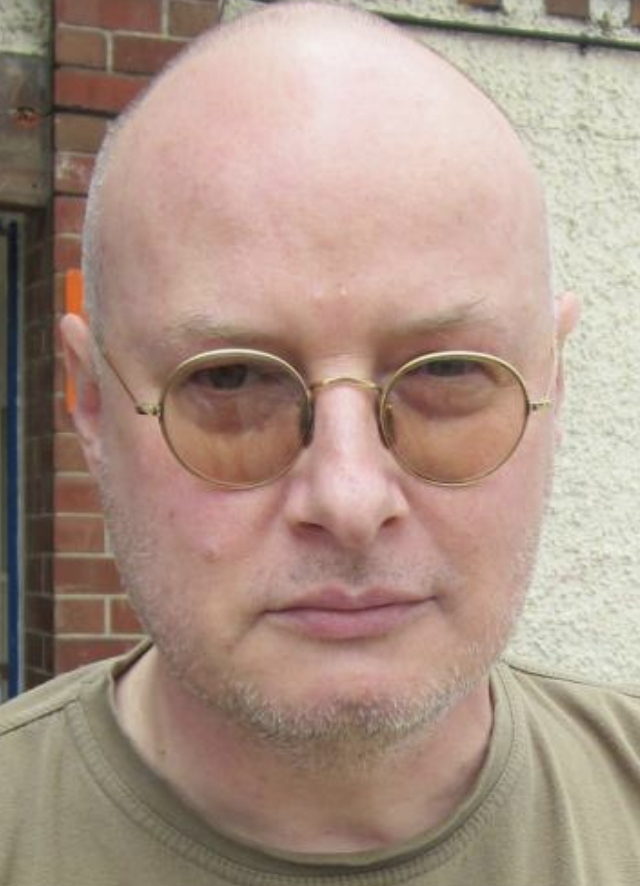
On this date in 1953, English musician Andrew John Partridge was born in Mtarfa, Malta, the only child of a Royal Navy signalman and a retail assistant in a pharmacy. Growing up in Swindon, England, he taught himself to play the guitar. The first records he ever bought were “Sgt. Pepper’s Lonely Hearts Club Band” (1967) and “The Monkees” (1966).
He dropped out of school to play in several rock bands (and to meet girls). In 1972 he and Colin Moulding started XTC, a formative punk group for which Partridge wrote most of the songs and sang most of the lead vocals. His music drew heavily from ’60s British Invasion songwriters, and his style gradually shifted to more traditional pop. He wrote XTC’s only UK top 10 hit, “Senses Working Overtime,” in 1982.
That year the band stopped touring but kept recording. Partridge also formed the Dukes of Stratosphear, whose albums outsold XTC’s. He started producing albums for other artists. In the 1990s he came to be regarded as “godfather” to the Britpop movement that expressed artists’ “Britishness.” XTC went on hiatus in 2006, and Partridge announced in 2008 his “musical partnership with Colin Moulding has come to an end.” He continued to work with other groups and on solo projects, including a 2021 four-song EP he called the first in “My Failed Songwriting Career” series.
Partridge was married to Marianne Wyborn from 1979 to 1994 and they had two children, Holly and Harry. After divorcing, he had a long-term relationship with American singer Erica Wexler. They started dating shortly after she split from artist Roy Lichtenstein.
In 2016 he called himself “very left” politically and said he had voted for Margaret Thatcher “purely because she was a woman. I was that naive.” He identifies with atheism and paganism, he has said. On the record sleeve of “Apple Venus Volume 1” (1999), XTC’s 13th studio album, is the Wiccan directive “Do what you will but harm none.”
“So Andy Partridge, nonbeliever, believes in heaven,” an interviewer once asked him? “Yes. Here, now. This is heaven and hell,” he replied. “I’m sure that’s what heaven is, really. Heaven is not hurting anyone.” (“The Dukes of Swindon,” Chalkhills.org, May 1989)
“I’m interested in the pre-Christian appreciation of the land and the spirit of things, spirits in animate things and inanimate things. I think it’s more of a natural wanting to believe in something natural and something tangible rather than Christianity, which I think is totally fake. Maybe well-meaning, but it’s held together by a terrible web of fibs and stealing other people’s good stories.”
— Interview, Chalkhills: The XTC Resource (March 5, 1999)
Norm Allen
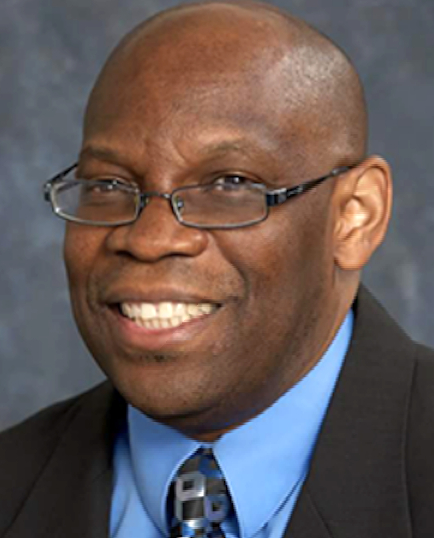
On this date in 1957, Norman Robert Allen Jr. was born in Pittsburgh to Fayevern (Robinson) and Norman Allen Sr., respectively a postal employee and a legal aide, and was the oldest of three sons. According to Allen, his mother encouraged him to keep an open but skeptical mind about religion. His father was a member of the Organization of Afro-American Unity headed by Malcolm X.
Allen attended the University of Pittsburgh before serving in the Air Force for four years, then enrolling at the State University of New York at Buffalo, majoring in English. He became a “full-fledged atheist” at age 31. (Mythinformed MKE, Oct. 14, 2016)
While working for the Council for Democratic and Secular Humanism in Buffalo, he started African Americans for Humanism (AAH) to explore the ideas and work of Black deists, humanists, agnostics, freethinkers, rationalists and atheists. He was AAH’s executive director from 1991 to 2010 and edited its quarterly the AAH Examiner. He also edited “African American Humanism: An Anthology” (1991) and “The Black Humanist Experience: An Alternative to Religion” (2003).
“I was originally motivated because I understand the many ways in which religion sends out contradictory messages, thereby contributing to widespread misery,” Allen said. “While acknowledging the good that many religions do, I believe it is necessary to unsparingly critique its many weaknesses.” (Council for Secular Humanism, Feb. 26, 2005)
Allen retired from organized secular humanism in 2013 after serving as secretary of the Institute for Science and Human Values and editing its journal The Human Prospect. He kept writing a regular column titled “Reasonings” for the institute and edited other writers’ work while traveling extensively to Africa, visiting over 30 nations to promote secularism.
In 1997, single and living in Buffalo, Allen told a newspaper that “atheism remains high atop the list of Topics to Avoid on the First Date,” comparing it to a felony conviction. Black atheists have a “harder row to hoe,” he said. “Religion permeates everything in our culture. You go to an NAACP meeting, and they’ll want to pray. You can go to a secular meeting, and they want to pray. When I’m in that coercive situation, I’m not going to stand for it. I don’t hesitate to walk out.” (Buffalo News, Dec. 14, 1997)
“Humanism is about solving our differences peacefully. We know of many religious wars, but organized humanists have not settled their differences with violence.”
— Allen statement to Humanists International on the United Nations International Day of Peace (Sept. 21, 2017)
Larry King
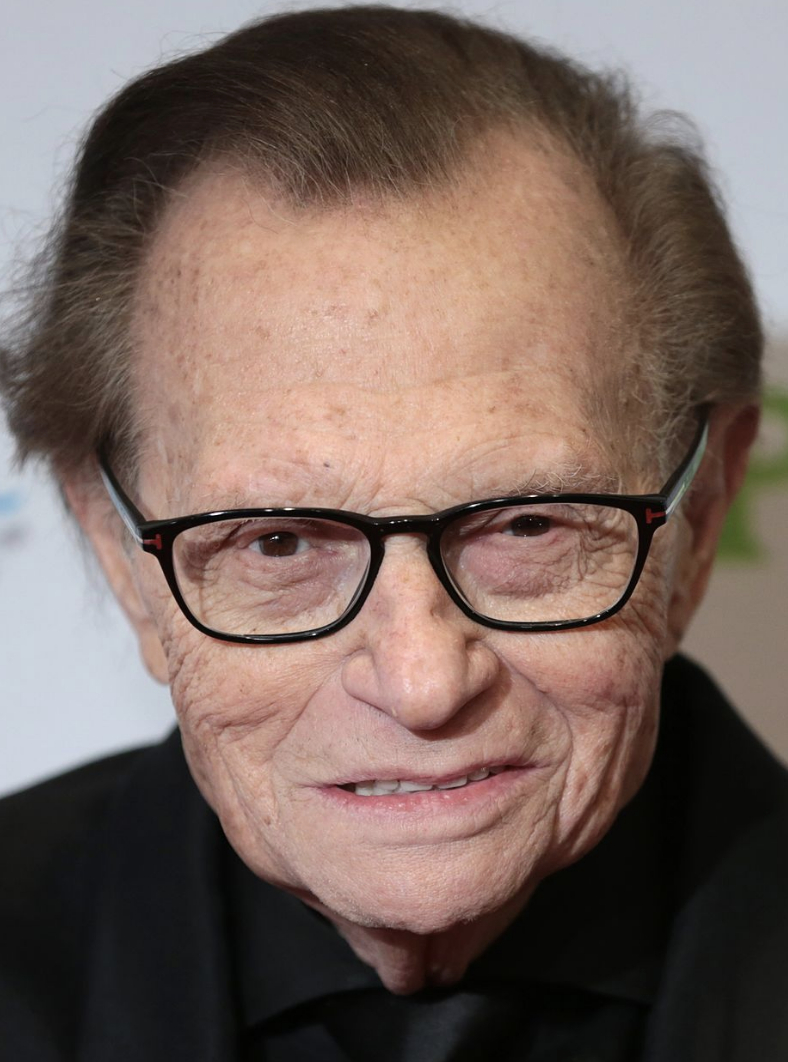
On this date in 1933, TV and radio host Larry King (né Lawrence Harvey Zeiger) was born to Jennie (Gitlitz) and Aaron Zieger. His parents were Russian Orthodox Jews who immigrated to the U.S. from Belarus in the 1930s. King attended public schools, and after his father died at age 47 of a heart attack when Larry was 9, the family had to rely on welfare.
His first broadcasting job was in 1957 at a radio station in Miami Beach, Fla. He started using the name Larry King on air at the behest of management and changed his name legally about two years later. Singer Bobby Darin was his first celebrity interview.
“The Larry King Show” gained national prominence on the Mutual radio network, with the show airing from 1978-94, rising from 28 to over 500 affiliates. “Larry King Live” had started airing on CNN in 1985. Along with those two shows, he wrote a regular column for USA Today from 1982 to 2001. The final edition of “Larry King Live” aired in December 2010 after over 6,000 episodes. During his career, he did more than 60,000 interviews. But he was soon back on the air after co-founding a production company called Ora TV. In 2017 he said he had no intention of ever retiring, despite having had a heart attack and five-bypass surgery in 1987.
The recipient of numerous awards, King in 2002 was named by Talkers magazine as the fourth-greatest radio talk show host of all time (behind Rush Limbaugh, Howard Stern and Don Imus) and the top TV talk host ever.
King was married eight times to seven women, the first when he was 19 in 1952. He married Shawn Southwick twice, though they were estranged and divorcing again when he died at age 87 from sepsis stemming from respiratory failure and renal disease. He had five children, including a son, Larry King Jr., born during his brief second marriage. They didn’t meet until Larry Jr. was in his 30s.
“I’m not a churchgoer. I used to go sometimes with my wife — I don’t go anymore,” King told an interviewer from GQ magazine. (April 30, 2009) “In fact, the more I interviewed religious leaders, the less religious I became. Because they don’t have the answers I need. I don’t get the answer to why. Why is there a Holocaust? And the answer I get is ‘We do not question the ways of the Lord.’ A lot of it — I tend to agree with Bill Maher — is superstitious.” (D. 2021)
PHOTO: King at Celebrity Fight Night XXIII in 2017 in Phoenix; Gage Skidmore photo under CC 3.0.
REASON: Are you still into cryonics?
KING: Yes. I’m putting it in my will. I’ll tell you why. I’m an atheist. Most libertarians should be atheists.— Interview with Reason magazine (April 4, 2015)
Nate Phelps
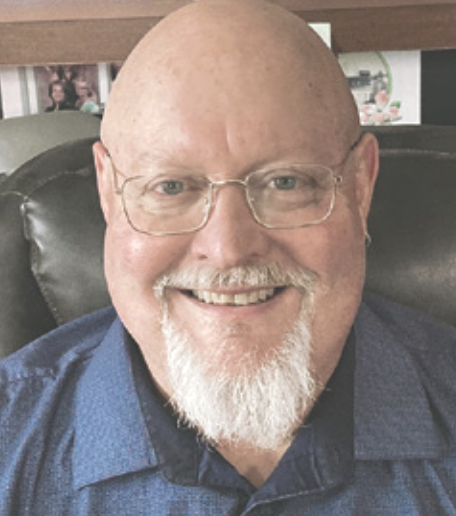
On this date in 1958, writer and LGBTQ activist Nathan “Nate” Phelps was born in Topeka, Kansas, to Margie (Simms) and Fred Phelps, the sixth of their 16 children (three were stillborn). His father was the notorious founder in 1955 of the homophobic and nativist Westboro Baptist Church, which was Primitive Baptist in origin and fueled by hyper-Calvinism. At age 7, Nate could recite the names of all 66 books of the bible in 19 seconds.
Fred Phelps, who had a law degree from Topeka’s Washburn University, was emotionally and physically abusive to his wife and children. When the barber strap he beat the children with to instill biblical discipline frayed, he started using the handle of a mattock, a tool shaped like a pickaxe with an adze and a chisel on the head. He led the church, which never had more than about 70 members, until he was forced out in a power struggle shortly before dying in 2014 at age 84.
Nate waited until midnight on his 18th birthday to leave the family in his Rambler Classic car he’d kept hidden. He then worked at several jobs before joining his older brother Mark, who’d left the household earlier. They started a printing company near Kansas City in 1978.
He and the business where he would work for about 25 years moved to southern California in 1981. He got married in 1986 to his wife Tammi (which led to his father calling him an adulterer because she was divorced). They had a son, Tyler, in 1987, and twins Hayley and Hunter two years later. They and Tammi’s three older children were raised in an evangelical church “where I began my search for the kinder, gentler God of mainstream Christianity,” Phelps said. (Freethought Today, November 2020)
After a “painful” marital breakdown in 2005, fueled in no small part by his increasing religious doubts, he moved to British Columbia (still his home as of this writing in 2021): “I had recently read Richard Dawkins’ “The God Delusion” and for the first time in my life I was willing to consider that I might be an atheist. That was such a horrible, terrifying word that I would not say it out loud.” (Freethought Today, ibid.)
Phelps was hired as Calgary branch director of the Centre for Inquiry Canada in 2009, served on the board of directors for Recovering from Religion and spoke at the Reason Rally in Washington in 2012, where he said the events of 9/11 ended his religious beliefs. “In the fierce storm of emotion that rolled across this country, one realization rose to the surface of my mind with blinding clarity: Certainly this mechanism of unassailable blind faith is one of the greatest risks mankind faces today.”
He was the 2020 recipient of FFRF’s Henry Zumach Freedom From Religious Fundamentalism Award for his years of speaking out publicly for freethought and humanism. The $10,000 award is endowed by FFRF Member Henry Zumach. Phelps was a guest on “Freethought Matters” on Feb. 18, 2021.
“I would argue that Westboro Baptist Church is just giving voice to the same destructive ideology at the foundation of even the most moderate iteration of that faith. How do we sit idly by considering that reality?”
— Phelps, writing in Freethought Today {November 2020)
Candace R.M. Gorham
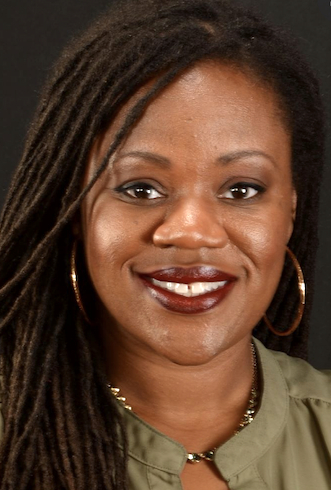
On this date in 1980, author, mental health professional and secular activist Candace Rene Miller Gorham was born in North Carolina. Her family was religious and as a child she went door to door as a Jehovah’s Witness. She also started having mood disturbances, which by early adulthood led to severe depression and anxiety that became debilitating. She was confirmed in her father’s Methodist church before gravitating to a nondenominational one with Pentecostal beliefs. She was ordained as an evangelist at age 21, a year after she was married, then was “promoted” to eldress and prophetess.
She preached, spoke in tongues, healed the sick and drove out demons. Gorham would come to see this behavior as “psychological abuse” of people — the belief that “hellhounds would come out of hell and grab your children.” She would later come to see that according to the Diagnostic and Statistical Manual of Mental Disorders, she met all 27 criteria for post-traumatic stress disorder. “It’s almost impossible to come out of a conservative, biblical, literalist type environment without some level of PTSD.” (Freethought Matters, April 30, 2018)
After earning a degree in secondary education from North Carolina Central University, she taught high school English. Her therapist convinced her to enroll in the community counseling master’s program at Wake Forest University, which she completed while focusing on black women’s mental health. She had started to deeply question her religious beliefs and her faith began to crumble. She moved to Bermuda and taught middle school English for two years.
In 2011 Gorham decided to reach out to other women suffering from the oppression of religious dogmatism and launched the Ebony Exodus Project, which was the title of her 2013 book, subtitled Why Some Black Women Are Walking Out On Religion — and Others Should Too. It tells the stories of women she interviewed, interspersed with topics detailing religion’s effects on mental, emotional and physical health, sex and flawed thinking patterns. Black women bear a particular burden because of religion’s cultural as well as theological hold on the community.
In addition to her work as a counselor, she’s a member of the Clergy Project, the Secular Therapist Project, the Black Humanist Alliance and the speakers bureau for the Secular Student Alliance. She has a daughter (age 15 as of this writing in 2019) and they live in Durham, N.C.
“Through a long, slow, painful process, I moved through stages of being an unaffiliated believer, to being a non-Christian theist, to being an agnostic, to finally being an atheist.”
— "The Ebony Exodus Project" (2013, Pitchstone Publishing)
Kate Smurthwaite
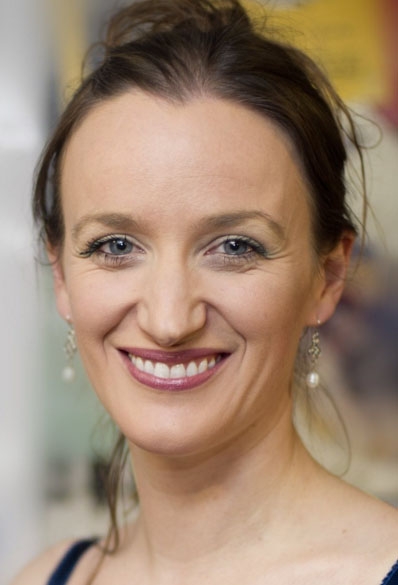
On this date in 1975, comedian Kate Smurthwaite was born in London. After growing up in Bury St. Edmunds, Suffolk, she studied mathematics at Lincoln College, Oxford, from 1994-97 and then worked in London and Japan as a convertible bond researcher for UBS Warburg, an investment bank. She started performing comedy professionally in 2004 and describes herself on her website as “a left-wing, feminist, atheist stand-up comedian and political activist.” (To wit: “Isn’t it weird when atheists call their child Christian? Surely it should be Godfrey?”)
She’s a regular contributor to mainstream print publications and to BBC and Sky News television and radio shows, both as a writer and commentator. In 2014 her science show “The Evolution Will Be Televised” was nominated for an award by the Center for Sustainable Practice in the Arts, a group that fosters business models that don’t have to rely entirely on donations from nonprofits and government funding. She has also taught stand-up at the City Academy in London.
BBC Radio 4’s “Four Thought” series in 2012 included a 15-minute program written and performed by Smurthwaite about sexist humor and sexism in comedy. She later responded to former BBC director of television Danny Cohen’s suggestion to have at least one woman on panel shows by calling it a highly progressive idea — if he’d had it in the 1950s: “This is 2016. There’s absolutely no reason why panel shows can’t have 50 percent women on all the time. There are loads of great female comedians. … Plus, when you have just one woman on, she becomes the representative of all womankind rather than just a guest, free to muck about.”
As a popular guest on BBC One’s religious debate show “The Big Questions” (sometimes representing the National Secular Society), Smurthwaite feistily stood up for nonbelievers. A 2010 clip that went viral under the name “Atheist Bitchslap” got 3.8 million views on YouTube. The question was “Does heaven exist?” Responding to a man who said every aborted child is in heaven, she said, “So we would be doing them a favor by aborting them then?” She went on to say, “Faith is believing in things without evidence, and I don’t do that because I’m not an idiot.”
PHOTO: by Jon Cartwright.
“A powerful well-supported movement of atheist feminists — of us Godless women — has the potential to free fifty-two percent of the world’s population from compulsory continuous motherhood and restrictions on everything from clothing to education, work to sex — as well as the financial and time resources that organised religion demands.”
— The Daily Telegraph (Jan. 7, 2016)
John Davidson
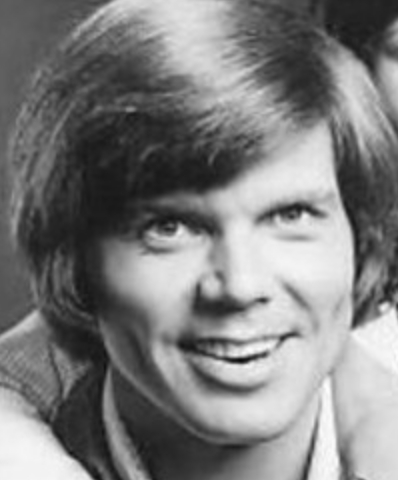
On this date in 1941, entertainer John Hamilton Davidson was born to two ordained Baptist ministers in Pittsburgh. After graduating from high school in White Plains, N.Y., he earned a B.A. in theater arts after first majoring in philosophy at Denison University in Granville, Ohio.
He got his start on Broadway in the 1964 musical “Foxy” and won a Theater World Award in 1965 for his role as “Curly” in “Oklahoma!” He landed roles in several Disney movies, which led to other Hollywood and television roles. He recorded 12 albums in the 1960s and ’70s, five of which reached the Billboard 200 album charts.
He was a regular on “Hollywood Squares,” performed in Las Vegas, guest-hosted “The Tonight Show” 87 times and hosted a revival of “The $100,000 Pyramid” in 1991. He continued to perform theatrically and played The Wizard in 2013 in the touring Broadway musical “Wicked.” He’s since been entertaining in Branson, Mo., and elsewhere as a troubadour and storyteller.
He married singer Jackie Miller in 1969. They divorced in 1982 and have a son, John Jr., and daughter, Jennifer. He married singer Rhonda Rivera in 1983 and they have a daughter, Ashleigh. In a January 2020 piece in New Hampshire Magazine, he wrote about moving there and enjoying its “sense of freedom, individualism, self-reliance and, yes, healthy skepticism. Being a progressive, I of course came here in search of other progressive liberals, but I’ve also encountered open-minded conservatives who have been an inspiration.”
Davidson in 2015 joined Openly Secular, a coalition of freethought groups started by the Center for Inquiry. He spoke at the Reason Rally in Washington, D.C., in 2016 and appeared in 2020 on FFRF’s “Freethought Matters” TV talk show about the harm Christianity has done in countries like Mexico, where he lived for a while: “I would see these poor, poor Mexican people come in and light a candle and give their last couple of pesos to the church, which has billions of dollars in Rome.”
He said in a 2020 interview with Broadway World that he started questioning his faith in college: “My sophomore year I was a philosophy major and my first two courses were comparative religions of the world. You study all the religions of the world, everyone’s approach to what they think god is or that thing in the atmosphere, whatever. And the other course was logic one 0 four. And if you take logic and try to apply it to religion, it just doesn’t work! So that was the beginning of my journey towards atheism.”
PHOTO: Davidson in 1973 on the set of “The Girl With Something Extra,” co-starring Sally Field; public domain photo.
“I think we should all be doubting Thomases. I think it’s good to be skeptical and question everything. Question everything!”
— Interview, Broadway World (May 8, 2020)
